#i love love love analyzing writing so trying to come up with alternative narratives is fun for me
Explore tagged Tumblr posts
Text
i'm so confident in byler endgame for a number of reasons, but also because there's just nothing that ties up the writers' decisions when it comes to mike as neatly and as fast as a gay mike wheeler in time for the last season:
-mike's eyes being open after el tells him ily for the first time and kisses him (not even a quick kiss, bro had plenty of time)
-mike not being able to say ily to el even while she cried in front of him about it
-mike only being able to say ily after will pushes him to
-mike lying in his monologue
-mike not being able to hug will at the airport
-mike letting will think he didn't call him even when we later hear that he was constantly trying despite that being an easy way to win the argument
and those were just some i came up with on the fly. i just want one explanation for all of these that works that isn't gay, bc i genuinely can't find one. nothing takes care of all of these questions in the narrative while also providing mike's character a clear path forward towards character development that isn't wayy too convoluted to be reasonably fit into a final season that isn't just all about mike. i have been thinking abt this for YEARS since s4 came out and still nothing works as well as byler
#i love love love analyzing writing so trying to come up with alternative narratives is fun for me#and i've tried with this over and over#there is nothing#we should've known from the eyes open kiss#when has that ever meant good things ahead in media?#ever?#'shoulda known you was trouble from the first kiss had your eyes wide open why were they open? oooooooooo'#to quote bruno mars#byler#mike wheeler#will byers#anti milkvan#anti mileven
170 notes
·
View notes
Note
i'm not a shipper, but i think it's blatantly obvious that grmm has something big n impactful for jonrya. we're talking about two main characters, created to complement each other from the beginning. if she were a little older, i think ppl would be more willing to at least try to analyze the text. and i suspect that, deep down... fans noticed, but prefer to pretend they didn't. like at some point, you have to ask yourself why grrm felt it necessary to revisit old ideas n make jon live a semi-triangle through his perspective that also maximizes so many emotions. jon is a v passionate young boy when it comes to arya. while the other stark children think fondly of each other, they have all this intense stuff involving soul n heart. ultimately he chose arya. his heart is his sister and his sister is his heart. and the heart is all that matters. how ridiculously obvious is that? lol we already know that he and arya are outsiders, that they are each other's favorite person. it's redundant to keep hammering the reader like that. plus using the love vs duty card at this point in the story implies that if the theme comes back, it won't have the same narrative impact bc that alternative has already been used, just like if he died again for someone else it wouldn't have the same impact either. grrm isn't exactly a subtle writer, when he feels inspired, he just writes. as he wrote: each other's memories prevent them from giving themselves completely to organizations that demand detachment from the past. jon thinks that arya's home is with him. he was tormented over her. why do their stories need to be so intertwined in affc and adwd? what implications could his dying thought associated her will bring after the resurrection? how will their already close relationship be reconfigured? could they save each other after they meet again and connect with their true selves? these are questions that many fans don't seem ready to discuss. although, if that's part of grrm's plan. it will happen eventually. he might just take the platonic route with undertones. easy as hell. in a series full of incest, a brother ends up being accused of stealing a bride and apparently nothing rings in the heads of fans who are always so dedicated to looking for the smallest details to validate dumb ass theories looool. it's bc they simply don't want to see. the crazy parallels with rhaegar (black heart/stark maiden) are also not subtle either. as i said, i don't even consider myself a shipper, i prefer jon/val and i like arya/gendry. however, these pairings obviously don't carry the same emotional weight as jonarya and weren't even set up as endgame initially, ppl liking it or not. and grrm has already confirmed that he's going for the endings he's had in mind since 1991, so these two will inevitably be more important in their respective endings than secondary characters created later. and frankly, everyone knows that they choose each other before any possible love interests. be fucking realist. it's grmm's story. there's definitely something planned for them and has put a lot of attention on their relationship for a reason. jonrya foreshadowing is so thick that i cannot see how ppl can ignore them
you are absolutely right, anon. george at no point has scrapped his ideas for these two, and in fact made it more prevalent. they've been bonded since childhood, both outsiders, honourable, listened the most to ned's lessons, stubborn, kind, have a shared journey of losing identity (something all the key 5 go through actually which can be added to the list of reasons they are still the key 5), george even made them unique in looking alike. i could go on. he wrote them both with the other in mind.
forgive me if i'm getting the numbers wrong but i think jon thinks of arya something like 47 times? and that's in 42 chapters. on average he thinks about her at least once a chapter. crazy work. arya in turn thinks about jon around 42 times across her 34 chapters. frankly, arguments that george isn't going that way, isn't highlighting their bond especially or for a particular reason, are being purposefully obtuse. and they absolutely have noticed, lol. this is why every jonsa theory rests on jonrya material, quotes about arya, arya's storyline and themes or jon's love for arya. jon and arya's entire relationship is apparently just a red herring. they simultaneously insist there's nothing romantic and that we're gross, but also take "what do you know of my heart, priestess?" and pretend it's about sansa because deep down they know it's the most romantic thing ever. it's why they insist sansa will be the girl in grey or that sansa replaced arya in the original outline's love triangle despite no evidence of this. suddenly we're supposed to believe jon-arya-tyrion became jon-sansa-tyrion despite jon never thinking of sansa, and jon spending adwd fighting imaginary duels with ramsay for arya's honour. the outline also makes clear arya's in love with jon not tyrion, so who's to say it wasn't always meant to be a love triangle from jon's perspective only, lol?
i would absolutely agree that it's becoming redunant with how often he hammers it home if the fandom wasn't like this. as it is, most of the fandom still isn't getting in. he needs to be more insane about them actually. and the constant assertion that the girl in grey, or jon's betrayal for love will happen again shows such a misreading of the text. they've recognised the devotion jon has for arya, but because they don't like her that can only be platonic, and that devotion will be transferred onto whoever they like best and this time it will be romantic, duh. as if he's gonna repeat storylines exactly just with a different character this time.
and yeah, this doesn't have to lead to anything more than a deep, platonic bond and endgame where they at least won't be apart from each other. but to insist jon and arya are platonic and "not that deep", "he loves his whole family," etc. and then literally replace arya in the story with x character is unbelievably stupid and annoying.
#sansa seriously needs better fans it's such a disservice to her story too#asoiaf#jon snow#arya stark#jonrya#anonymous
47 notes
·
View notes
Text
So, in light of recent events, I've been doing a lot of thinking. People ask me a lot how to get into analysis and where to start if they want to analyze characters and media -- and, historically, my answer has always been "start with the themes."
But there's actually a point 0 place to start. I never mentioned this, because I thought it went without saying -- but that was stupid for me to do, because people are coming to me with nothing and I'm expecting them to have something by default. That's dumb.
The real place that you start?
Is with the writer and the target audience. Who is writing this story, and who are they writing it for?
This is the exact reason why I've also said, in the past, that not all readings of a text are valid. The only way to make all readings of a text valid is by invoking Death of the Author.
So, what is Death of the Author?
Very plainly, Death of the Author is defined as: a literary theory that argues that the meaning of a text is not determined by the author's intention, but rather by the reader's interpretation.
A lot of queer media analysts and scholars, for example, invoke Death of the Author in their work, because they know that an author did not intentionally set out to write a story that was reflective of the queer experience -- but their argument is that there's a way to read the text that is reflective of that experience. They're not saying "this is what the story means." They're saying "this is what the story means to me."
And this is a very valid form of literary analysis, because it provides extra meaning to a work beyond what the author intended and makes it more accessible to a broader audience.
But the thing about Death of the Author is that you need to acknowledge that you're invoking Death of the Author. Because if you don't, then you're making a completely different argument, which is: "the author/work intends for us to take this meaning from it." And you can't say that in good faith for all readings of a story. There is no way to make a claim that there's a positive allegory for the trans experience within Harry Potter, because that is most certainly not what JK Rowling set out to do. However, you could make a Death of the Author argument in favor of that -- which would be great, because it'll piss her the fuck off.
That's what I mean when I say that "not all readings of a text are valid." When I say that, what I actually mean is "that is absolutely not what the writers intended for us to take away from this scene/character/relationship/line of dialogue."
So, if you're someone who's coming to me, personally, and asking "how do I do what you do?" -- I don't make Death of the Author analyses. That's not what I do. So, my step zero to writing meta is to consider who is writing the story and who they're writing it for.
And there's a few reasons why I do this.
First and foremost, I'm in the business of theorycrafting. In order for me to try to accurately predict where a character arc or storyline is going and how it's going to manifest in future titles, I need to try to hone my focus on the writer's actual intentions. Because if I can't see things from their perspective, I'm never going to be able to chart out a course for where they might be going. And I'm not always right -- but sometimes I'm really right. Like, really super right. And I can't stop being right. And that feels really good.
The second reason is because acknowledging the writers' intentions opens them up to criticism. It's hard to criticize a writer for a lack of inclusivity if you take the stance that all readings of a text are valid and therefore any of the characters could be XYZ marginalized group. It's hard to criticize a writer for a sexist narrative or a sexist framing of events if you make the argument "but it's possible this completely alternate interpretation is also valid."
Like, I love DBZ. I love Akira Toriyama. I cried openly when he passed. But DBZ has some sexist bullshit going on in it. And you can't criticize it or him for turning all the female characters into housewives and babymakers while also supporting a reading of the text that says "but this is the happy ending that the characters are fighting for in the first place, so it's actually empowering."
So, in the case of Resident Evil...
Resident Evil is being written and developed by Japanese men in their 30s, 40s, and 50s for a group of Western cishet male gamers between the ages of 18-35. That is their target demographic. They are not talking to my coworker who's a 24 year old afab bi enby who desperately loves the series; the series just happened to reach them despite that.
And while everything in RE released prior to 2005 is pure survival horror meant to make you constantly feel like you're on the back foot, everything from RE4 onwards is a power fantasy. There are still horror elements to the games and movies, but RE more turns into a monster-of-the-week series about cool characters doing sick wrestling moves on cool monsters.
The devs and also the majority of their target audience project onto the male protagonists of the series to a certain extent -- which is why there has only been one title released since 2005 with a focus on a female protagonist, and that's Revelations 2 -- and, even then, Claire had to share the spotlight with Barry. Women have been playable here and there and been considered "main characters" -- but they've never really been the focus of any new titles that have come out. Sheva is considered Chris's partner. The RE6 campaigns are primarily about Leon, Chris, and Jake. Revelations 1 is seen as a Chris and Jill game in equal measure. And even though Death Island was supposed to be about Jill -- it wasn't, really. Because every other character had to be there with her, too.
So, when I get shit for taking a "heteronormative perspective" to my RE analysis -- there's a reason why I'm doing that. It's not because this is how I inherently view the world. It's because that is the intention with which the games are being written. That is who is writing the games and who the games are being written for.
Let's take RE4 Remake as an example, here. Capcom had to mash three different women together in order to create Ashley and turn her into an idealized fantasy woman so that she had the perfect face, the perfect body, and the perfect voice.
And the games are being developed by and for men who project onto Leon and see him as a power fantasy.
That is why it's absurd to me for people to say that Leon and Ashley never flirted with each other in the game. Of course they fucking did. Capcom created the perfect woman with giant tits and a small waist and a huge ass and a supportive personality and put her into close quarters with a male power fantasy protagonist. They put the flirting in so that their target cishet male audience could live that.
What people don't understand is that the eagleone romance wasn't created for the sake of the ship. It was made because of:
dudes who want to fuck Ashley and
Yoshiaki Hirabayashi's love for fairy tales.
(What makes me say that Hirabayashi loves fairy tales? He wrote RE5, which has a shitton of fairy tale elements surrounding Jill and Wesker specifically and even an alternate costume for Sheva that's called "fairy tale." To find that he turned RE4 into a fairy tale wasn't surprising to me at all, considering what the source material was. But the RE5 thing is for a separate post.)
Capcom doesn't care about your ships or our ship wars. They didn't create a Leon and Ashley romance because "we ship these two characters together." They created a Leon and Ashley romance so that guys who want to fuck Ashley can feel like maybe they could.
And because Hirabayashi fucking loves fairy tales.
And I also love fairy tales, which is why I love the ship. But I also do recognize that there's a sexist element behind the construction of Ashley's character and am capable of criticizing the ship for that reason.
So. Yeah. Start there. Start with the writers. Start with the intended audience.
I know that RE isn't being written for me. So I have to look at it from the perspective of the people who it is being written for. And if you want to analyze media, you have to do that, too.
42 notes
·
View notes
Note
You said Sick Days was your favorite of your fics right now so could you do idk... If I just list some numbers you can pick which ones you want to answer, right? 3-6, 8-12 any of those. Thank you!
I love this fic so much I will do all of them ily for this.
3: What’s your favorite line of narration?
Is it cheating if I don't choose only one? I'm not choosing only one, this blog is my domain and I will do what I want forever.
I really want to include the section where Apollo says 'eugh' but it might rightfully gross people out.
'No time for that, Justice! Your sopping wet boyfriend needs a towel and at least eight hours of sleep, stat.' -Apollo desperately trying to avoid psycho-analyzing his boyfriend
'Apollo was a vision standing in the doorway with a tray of breakfast and Klavier thought he might die.' -Klav just really wanting his eggs
4: What’s your favorite line of dialogue?
Also not choosing only one.
“You’re thinking too hard. Feed me my ice cream.” -Klav being a brat (well deserved)
“Ja. I can do anything if I put my mind to it, Herr Forehead, so jot that down.” -Klav being sassy yet entirely too genuine
“It appears he has no court appearances, so please tell Prosecutor Gavin he has the rest of the week off and that if he shows up despite this I will suspend him.” -Edgeworth being the best boss ever and caring for his subordinates
There were also some exchanges but I'm sticking to single liners as prompted, I do follow some rules.
5: What part was hardest to write?
I had to rework the part where he went to get the medicine and ice cream a couple times, but mostly this fic just flowed out of me.
6: What makes this fic special or different from all your other fics?
So I started writing it while sick and I just wanted to be taken care of so I thought 'What are things I would want someone to do for me?' which made this fic really more about their relationship and how they support each other than some greater narrative. Usually I am struck by a funny concept and then work around it, but this one was genuinely about the kind of love that comes with a healthy extended partnership.
8: Did any real people or events inspire any part of it?
Answered this above, I was sick. I was sooooo sick. Next time I get sick we're doing the same but in reverse and Apollo is going to be so grumpy, representing the part of me that gets grumpy instead of pathetic when sick.
9: Were there any alternate versions of this fic?
Nope! I wrote most of this in one sitting so there wasn't time for there to be multiple versions. Most of the scenes were one and done as well.
10: Why did you choose this pairing for this particular story?
I wanted Apollo to take care of me. Klavier is my special boy. It just worked out.
11: What do you like best about this fic?
I made so many quick character decisions, particularly about Klav, and I'm happy with all of them actually. My favorites are that he was very close with his Oma and that he just casually keeps a story book by the bed, probably one that his Oma read to him. He is also specifically Austrian in this fic which is reflected in book choice but idk if that's even something people would notice.
12: What do you like least about this fic?
I don't know how else I would have written it, but I made a lowkey ad for Project Gutenberg when referencing the book and it feels clunky to me, but I might just be nitpicking. I genuinely enjoy everything else. I think as a story it's good, I think technically it's good. I stand by my assessment that this is the best thing I've written so far.
5 notes
·
View notes
Note
Your 2p designs are really cool! :00 What was your process on designing them?
thank you aaaaaaaaaaaaaa

I love them very much.
It's not very fancy I'm gonna be honest with you, and they're kind of different. There's honestly a process, but it takes ages and ages and all of my 2ps are at different stages of work.
I also just want to note, while I try to maintain historical president and research, they are less based on the countries and more based into being mirrors or character foils to their 1ps. More character, less historical nation.
One day I'd love to talk about specific 2p's and their importance to their narrative foil in their 1p's and how the 1p's mirror and foil them back-- but uh, that's for another ask ^^''
But yeah here's my process.
---
Part 1: I look at the 1p Nation itself, and break down their basic attributes. Their appearance, personality, history, etc. After I break it down I usually go 'Okay, what if this character was [X]' and then I continue to think about it from there.
Part 2: I do some research into the country itself and different things about it, its culture, food, tourism etc. While I am not an expert and it's honestly very very surface level, I'm mostly shooting for major cultural phenomenons, popular media, food, fashion, major traditions and anything that I should avoid.
Part 3: I continue to flesh out their concept with this new info, and start writing them in things to get a feel for the deeper parts of their psyche and personality. Things sometimes change in this stage, like their look, their personality, etc. (for example: Hanna/2p Hungary went from a gentle mother, to a y*ndere madwoman, to a dominatrix with trauma in the span of 2017-2022, just by using her in practice.)
Part 4: This is the longest stage, its just use. Use, use, use. Interaction with others, RP, ficlets, coded shenanigans, art pieces, headcanons, vocal rps from joke concepts. Me just making them, finding media pieces that I tie to them, etc. It's the longest and where major and minor beats of the character really start locking into place, and where alternate concepts of their personality can come up. Like AU's where I take their inner personality panel and start turning switches and dials and seeing what happens, or seeing what would have to happen to have a character stoop to certain levels (madness, murder, etc.)
Part 5: By this stage they've become a solid character I use often, like Lutz or Alexander. 2p's I've had for over seven years and have changed slowly as I have, with dynamic pasts and future character growth opportunities and alternate world versions where their personalities are different, but are still distinctly them.
This is a really watered down version of what I go through, and isn't even this rigid, sometimes characters go from one to three to two to four its weird. doesnt take into account other people shifting their personalities and arrows in life either-- Example, Lutzlex (Alex and Lutz as a ship) was never a major thing in my lore until my discord group latched onto it and the more I rp'd concepts for it the more I fell in love with it. And because their relationship went from a past foot note into something major it critically changed both of their personalities in a major way.
Lemme throw you an Example! I'll use Akio, because I remember his origin the best for some reason.
Akio was one that took me a while to characterize, cause at the start of it, he was the fanon 2p Japan, and then he dropped off for years because I had other friends who rp'd him better than me, so I just used theirs or would interact with theirs so often I didn't need my own.
But when I did start deeply analyzing him, I started with a simple concept.
What if Kiku hadn't been characterized as a shut-in? How would that have effected his relationship with his neighbors? America? Netherlands? How would the Isolation Period have effected his psyche? Does he fear it happening again? Is is afraid of his government? etc. etc.
So that's where Akio started. As I worked with that personality more and more, he started to have major beats. Being very bluntly honest against Kiku's constant obfuscation of his feelings. Making himself very distinct from his government, staying out of the country as often as he could, being afraid of enclosed spaces/locked rooms, and almost never talking to Kiku.
Time passed, his personality got rubbed down, he was given a lot more energy, but less chaotic and more just, chasing the trends. He became a social media and kawaii fiend, undercut with the constant worry of reconnecting with his traditions or past at more than a surface level out of a buried trauma response.
I got away from the whole family asia thing (I was stupid, obv.) and made it more of Akio trying to be very social with his neighbors, but they find it grating because you know, Japanese history in the South Pacific and Asia. I don't need to explain that. His relationship with China has changed but at the same time it hasn't at all. Bohai thinking he's rather close with Akio, but Akio just not wanting anything to do with him.
And it leads all the way to now, where Akio is. As this Bio I have for him goes:
Akio’s energy can simply be described as ‘shut up I do what I want’. A free thinking, energetic, sassy Japanese man who has decided to leave old habits and beliefs behind to fully immerse himself in the modern world. The negative side of this is he finds himself not well grounded and with a deeply embedded anxiety of being pulled back to the past again. He’s good at reading the room and will tell you exactly what he’s thinking or feeling without any hesitation. Some people consider it crass and others appreciate his honesty. Despite his loud nature, has a lot of repressed fear toward his own country and even the other Japan for reasons he doesn’t often discuss.
Long winded explanation and example aside, it's not that intensive I don't think? Some of them are still very very surface level for my taste, and I live in constant fear of them not being historical-y or nation-y enough for people. But I guess with my 2p's- and just my personifications in general- I like to think about them more as characters and less like personifications because it's more fun that way.
But yeah! I hope this makes somewhat of a lick of sense, and that people are not terrified or overwhelmed by the text! I noticed the cool color feature is there now, so I thought to add some in places to splash attention and make it a little less of a slog to look at! I hope this was informative I guess ^^;;
10 notes
·
View notes
Note
I just wanted to say it's nice to see a blog like this! It's really refreshing to see when someone is both critical of media, but in a balanced, nuanced way.
Which is probably my biggest beef with antis, actually. They've warped and mutilated the entire concept of being critical of media, and then made it widespread enough that everyone who is not an anti or anti-adjacent assumes it's in bad faith.
Even when we're not getting into "how fiction effects reality" stuff, it's hard to have a good debate on themes or ships or characterization anymore without worrying some is going to bring in some moral superiority stuff. I know ship wars have always been vicious, but this seems to be scaring more people off from even good faith discussions.
It sucks. I enjoy being critical of media because I like knowing how things work. It's also interesting how a lot of it comes back to knowing how writing and storytelling works as well. There are so many time where you can pin down a narratively weak or unsatisfying element to the creator's biases getting in the way, or how audience interpretation vs what the creator intended can differ so much based on what assumptions the creator thought the audience would have.
But more importantly, it's an important skill to have in general. Navigating media and just society in general is complicated, and it's not a simple good or bad set of rules you can memorize. You have to understand how these things work to be better and not reproduce the exact same toxic bullshit with a different coat of paint
Thank you for this message, anon! I try incredibly hard to approach media critically and thoughtfully and to stay aware of my own biases and the messages being shared in the media I enjoy.
You’re absolutely right about how antis have warped media discussions and meta in pretty much every way. The morality that antis follow has surpassed shipping and now it feels like every single discussion about characters or themes involves accusations of characters being abusive or toxic or predatory for completely surreal reasons. Even in decent discussions, there’s also the way that shipping is brought up solely as a gotcha or to shut someone out of the conversation. There’s been so many points where I’ve made posts about general fandom stuff and gotten people bringing up shipping just to undermine me.
I absolutely love analyzing media. It is one of my favorite aspects of canon, picking things apart to understand the messages and the creator’s biases and the ways that fans interpret different things. I like trying to understand why certain choices were made in the canon, why certain characters are shipped so much, why the author leans on some themes so heavily. Sometimes I don’t always like the conclusions (this ship is more popular because the alternative is one with a Black character and Black people are undervalued as love interests by society, this character is written in this way because the author has ableist biases and sees disabled people that way, this fictional culture is inspired by real cultures but in a way that is disrespectful and appropriative, etc) but I always come out of those discussions with a better understanding of the media in question and the fandom for it.
And I don’t get why people don’t also enjoy that! It’s so much fun! It’s so interesting! It’s great for engaging with other people and making your fandom more diverse and opening up new concepts and theories! Media analysis, in my own personal experience, does nothing except make a fandom more creative and thoughtful and welcoming.
I don’t always agree with the conclusions that other people draw, but that’s what makes things so interesting and gives so much variety to fandom. I wish that meta and media analysis wasn’t so dominated by antis because it really is ruining fandom experiences and making it harder to engage thoughtfully with media and fan communities.
20 notes
·
View notes
Note
“The big flaw with this is that it completely misunderstands who JK Rowling is and why she wrote the books. Simply put, this novel is a Christian tale. You miss that, you miss the entire point of everything it has to say.” Elaborate? Sounds interesting and I haven’t heard that before.

Well - I love this to bits and sort of wrote my thesis about it, so here we go.
Basically, you’ve got several kinds of heroes, but ‘left-wing hero’ is almost a contradiction in terms (more on this later). There’s your average Greek hero, whose status as a hero is more of a social class than it is a job and who generally doesn’t have any morally redeeming qualities (have you met Theseus?). Then there’s the medieval Christian hero - he comes in different flavours, but what’s relevant here is the Perceval model: basically the village idiot, whose only power is his good heart and who has no desire to challenge the status quo (because kings are divinely ordained and also poets tend to work for them, so ‘That vassal guy of yours has rescued yet another damsel’ story is going to be better received than ‘Your tax system is corrupt and this knight will now implement direct democracy’). Next you have the modern superhero, who was born in a very different historical context (the vigilantism of 19th century US) and as such has very different priorities. Namely: in his world, there is no higher authority and it’s up to him to use his superior skills to be judge and executioner so he can protect the most vulnerable. This understandable but toxic narrative will later get mixed up with WW2 and then the rampant capitalism of the last 30 years, resulting in the current blockbustery mess.
Anyway - if you’re a Western writer, it’s basically impossible to escape these three shaping forces we’ve all grown up with (classical Antiquity, Christianity, and US-led imperialism/capitalism), so most books and movies of the last forever decades can be analyzed through this lens. In the case of JK Rowling, what you have is a Christian author who openly used her YA series to chart out her own relationship with God. This is not a secret, or a meta writer’s delusion, or anything: she’s discussed it in several interviews. Her main problem, which is most believers’ main problem, is how to reconcile her faith in a benevolent God with the suffering in her daily life; and something she’s mentioned more than once is how her mom died when she was 25, and how this was very much on her mind especially when she was writing Deathly Hallows.
Now, I don’t want to write a novel here, so I won’t analyze the entire series, but what it is is basically a social critique of British society, mixed up with Greek and Roman elements in a cosmetic way only, and - crucially - led by an extremely Christian hero.
In every way that matters, Harry Potter is a direct descendant of Perceval: he’s someone who’s grown up in isolation as the village idiot (remember how he was shunned by other children because he was ‘dangerous’ and ‘different’), randomly found a more exciting world of which he previously knew nothing (he’s basically the only kid who gets to Hogwarts without knowing anything about the magical world, just like Perceval joined Arthur’s court after living in the woods for 15 years), and proceeded to make his mark not because of his innate powers or special abilities (he’s average at magic, except for Defence against the Dark Arts), but because he’s kind and good and humble. And in the end, he willingly sacrifices himself so everyone else can be saved: a Christ-like figure who even gets his very own Deposition (in the arms of Hagrid, the closest thing to a parent his actually has).
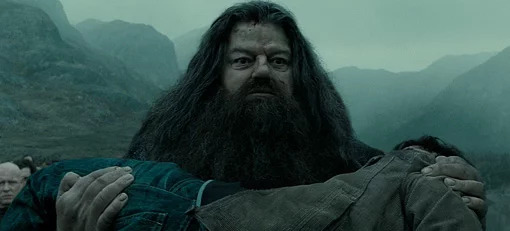
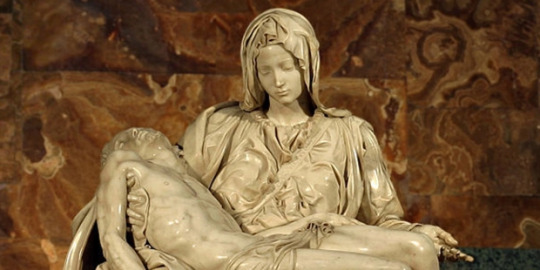
(This, by the way, was the only reason why Hagrid was kept alive. JK Rowling had planned to kill him, but she absolutely wanted this scene - one of the most recognizable and beloved image in Christian art - in the books.)
And even if he ultimately survives his ‘death’ (like Jesus did), Harry refuses the riches and rank he was surely offered and chooses to spend his days in middle-class obscurity as a husband and father (if I remember correctly, Harry and Ginny’s house isn’t even big enough for their three kids). And no, of course he doesn’t stand for anything or challenges the status quo: that’s not his job. His job, like Jesus’, was to defeat evil by offering himself up in sacrifice; and the entire story - especially the last book - is a profound, intimate, and very moving reflection on faith.
(“Render unto Caesar the things that are Caesar's, and unto God the things that are God's”, remember? It’s not your job to change anything in the temporal, material world; your job is to nurture your immortal soul and prepare it for the true life that comes after death.)
Like - I don’t know how it was for younger readers, but for me, reading Deathy Hallows as an adult, it wrecked me. Even as an agnostic, I read it over and over again, and I kep finding new meaning in it. The whole thing is basically a retelling of the Book of Job, one of the most puzzling and beautiful parts of the Old Testament. That’s when Harry’s faith in God Dumbledore is tested, when his mentor, the cornerstone of his world, disappears; when Harry has to decide whether he’ll continue to believe in this absent, flawed figure despite all the bad things he keeps uncovering or give up his faith - and thus his soul - completely. The clearest, most startling moment exemplifying this religious dilemma is when Harry decides not to go after the wand. Getting it is the logical thing to do, the only way he can win, but Harry - while mourning Dobby - decides not to do it. That’s when he recovers his faith, and starts trusting his own kindness and piety (whatever happens, he will not defile a tomb) over everything else.
Another key moment is King’s Cross - here, and once more, Harry forgives his enemy, thus obeying Jesus’ commands. He sees Voldemort, the being who took everything from him - and he pities the pathetic, unloved thing he’s become. This is what sets him apart from everyone else and what makes him special: not his birth, not his magic, not some extraordinary artefact - but simply, like Dumbledore puts it, that he can love. After everything that’s bene done to him, he can still love; not only his friends, but his enemies. He forgives Voldemort, he forgives Snape, he forgives Malfoy, he forgives Dudley; and I see so many people angry about this, ranting about abuse victims and how hate is a right, but I think they’re missing the point. This is a Christian story; from a Christian perspective, your enemies need love more than your friends do.
(“It is not those who are healthy who need a physician” and all that.)
And in any case, a hero is inherently not left-wing. The whole trope relies on three rock-solid facts: the hero is special, and he can do something you can’t, and that gives him the right or the duty to save others who can’t save themselves. Whether it is declined in its Christian form (the hero as self-sacrificing nobody) or in its fascist form (the hero as judge and king of the inferior masses), that is is the exact opposite of any kind of left-wing narrative, where meaningful change is brought about not by individual martyrdom or a benevolent super-human, but by collective action.
So, yeah - Harry changes nothing and is not the leader of the revolution, but it’s unfair to link this to JK Rowling’s politics. It’s just how the trope works. And, in fairness to her, many kind and compassionate authors who write books concerned with social justice tend to lean towards this kind of hero because the only workable alternative - the fascist super-hero - is way worse. Had Harry been that, for instance, he would have ended up ruling the wizarding world. Would that have been better for its democracy? A 19-year-old PM who knows nothing about the law or justice or diplomacy? A venerated war hero drunk on power? Instead, JK Rowling chooses the milder way out: Harry and his friends do change the system - little by little, and within the limits of the genre. Hermione becomes the equivalent of a human rights lawyer, while Harry and Ron join the Aurors (and I know there’s a lot of justified suspicion towards law enforcement, but frankly having good people in their ranks is still the only way to move things forward. It’s been years and I still haven’t heard a practical suggestion as to how a police-less nation would work). As for the government, it is restored to a fairer status quo - again, not the revolution many readers wanted, but also not the totalitarian monarchies or oligarchies or the super-hero’s world.
And as to how one can write a story that’s actually revolutionary - I don’t exactly know. Some writers rely on multiple narrating voices to try and escape the heroic trope; others work on bleak stories which point out the flaws in the system and stop short of solving them. I guess that, in the end, is one of the problem with left-wing politics: they’re simply less eye-catching, less cinematic. On the whole, it’s dull, boring work, the victories achieved by committees and celebrated with a piece of paper. From a literary point of view, it just doesn’t work.
#ask#harry potter#hp#meta#jk rowling#tropes#heroes#literary tropes#ancient greece#superheroes#the jesus fandom#writers problems#right vs left#politics#again i don't hold it against it#i think it works beautifully#and has a lot to offer to non-believers as well
502 notes
·
View notes
Text
The Long Kaz Rant I Told Myself I Wouldn’t Write, But Here We Are
This is probably an unpopular opinion. And I hope it doesn't come across as confrontational or anything because I don't mean it that way. But I've always been super confused by the way Kaz is accepted, basically across the entire fandom, as either morally gray or straight up villainous? He doesn’t really seem like either of those things to me. On a surface level, obviously there are things he’s done that are normally considered evil. He’s stolen, he’s killed, he threatened a child, he gouged out someone’s eye. And that’s all pretty bad, right? But it completely ignores the context given in the books. (More after the cut because this got too long...)
There’s a difference between doing something evil and doing something that’s shocking, “dark,” or difficult to watch.
Before I read the books, I heard fans discuss all the horrible things Kaz does. And the way people talk about him, I was expecting him to be… Feral Kaz – someone who delights in doing horrible things because he’s just so twisted and angry. The author herself even referred to him on her blog as being utterly despicable. Wow! This guy must really go out of his way to hurt innocent people, huh? So when I sat down to actually read it, I was so surprised. Most (if not all?) the killings were done on some level of self-defense. His “murder victims” were actual evil people trying to kill him or someone he loved. And the reason he threatened a child was because the only alternative was killing her – something he would never want to do. You know, because he’s not evil.
I don’t know if I just have very different definitions of these terms than most people? But to me, the idea of Kaz being “utterly despicable” should not even be on the table to begin with (Leigh Bardugo, you good?) and even the idea of him being “morally gray” is questionable.
When I think of a morally good character, I don’t think of someone who never does anything questionable or always perfectly makes the correct choices. I think of someone who is on a mission–either to protect the world, a loved one, or simply pursuing a personal goal–who at least tries to conduct his mission in a way that either does no harm to others, or (when that’s not possible) does as little harm as necessary to get the job done.
Whereas, when I think of a villainous character, I think of someone who has no regard for others at all. Someone who either relishes in harming the innocent, or pays zero consideration to whether he harms innocents while pursuing his goals (which are usually, in themselves, harmful to innocent people).
And finally, when I think of a morally gray character, I think of someone directly between these two. Someone who is a little bit evil, a little bit sadistic, but not entirely evil. He’s got a few good points too. Maybe he’s someone who keeps switching sides, unsure if he wants to be a hero or villain. Maybe he has hurt a lot of innocent people unnecessarily, but he joins in with the good guys for personal gain, and people don’t mind him there simply because he doesn’t interfere with the protagonist’s goals. Or maybe he’s the “Bad Cop” to someone else’s Good Cop: someone who uses more violence than is necessary, just for fun, but still helps the good side in some capacity, so everyone chooses to look past it.
Under these definitions, Kaz (to me) seems more like a good character. While pursuing his personal goals, he protects people he loves, and yes, he does do “dark” things. But he doesn’t relish in doing them (despite his reputation in-universe of being a chaotic sadist. His reputation is not accurate; he invented it for his own protection). He does them because he has to. If he can get the job done right without hurting anyone, that’s the route he’ll take. But that option isn’t always available. And he’s not the type to lie down and die just to avoid getting his hands dirty (nor should he, imo).
Again, maybe I just have a different idea of what constitutes being morally gray. But I always thought it was meant to be a judgment on the choices you make when you actually HAVE a choice? A morally gray character has the choice to be good or evil, and they choose to do both (which one depending on how they feel that day).
Whereas, if you do something “bad” because circumstances force you to do it–because you or someone you love will die otherwise–that’s pretty much the same as having a gun to your head. You’re not morally gray. You’re doing it under duress. It’s survival, not a reflection of where you stand on moral topics. Like, if you trap a vegan in a room with only a piece of meat, and you leave them there for days, weeks, that person doesn’t suddenly become a “fake vegan” if they eat that meat to avoid literally starving to death. You forced them to do it. When it comes to their moral beliefs, they would still be a vegan if they had the freedom to make that choice. You just put them in a situation where those choices aren’t available to them. Your lack of freedom in a situation shouldn’t define you.
The same can be said for placing a starving, homeless orphan boy alone in the dog-eat-dog world of Ketterdam. The option of being a sweet little law-abiding citizen is not available to him. So is it really fair to define him by something in which he had no choice?
I’ve come across so many GrishaVerse fans who, while sipping on their Starbucks in the comfort of their own home, go “Ugh, Kaz. He’s so DARK, so EVIL!” (Fun fact: while my mom was watching the show, she said Kaz is evil because “he seems to always have a plan.” Oh no! Not PLANS!) “He must be some kind of monster to be able to do the things he does and still live with himself! I could NEVER do those things!” Well…you’ve never actually had to do those things? Your life has never depended on it? Idk, to me, it’s just a very privileged take. And I’m not trying to make this into a big social issue. It’s not like criticism against a fictional character is anywhere near the same level of importance as the issues marginalized people are facing in real life. I’m just saying, it’s very easy to condemn activity you’ve never been forced to engage in for your own survival.
One of the biggest reasons people have given me for why they think Kaz is evil is that he is “for himself.” Even the author said she thinks Kaz is worse than the Darkling (who, I’ve gotten the impression, she believes to be irredeemable) because the Darkling has communal goals (he wants to bring positive change for other people/the world at large) while Kaz’s goals are just personal (he wants to bring positive change for himself and only himself). And for one? It just isn’t true: many (if not most) of the things Kaz does is either for his Crows or for his late brother; he just disguises it with supposed self-interest for the sake of his reputation. And second? It’s…not actually wrong to have personal goals or to act in self-interest. Bettering your own life is a valid desire. It’s not the same as being selfish. Not everything you do has to be for other people.
(And, tbh, this is something Leigh Bardugo seems to have a problem with in general, not just in this scenario. I could write a whole separate rant about other characters that were demonized in-narrative for engaging in “too much” self-care, and how her unforgivingly black and white morality ruined the Shadow and Bone trilogy for me. Worst of all, she even seemed to imply recently that the only reason real-life antisemitism is wrong is because “the Jews didn’t fight back”? [Like, if they had met her criteria of “fighting back”, would that make antisemitism somewhat justified to her? What? Idek, but she should really clarify.] Basically, she seems to take “non-selfishness” to an extreme. I don’t know her personally, I don’t want to make assumptions, I don’t have anything personal against her, and I’m not trying to get her cancelled or anything, I promise. But please, when you read her books, please don’t accept all her ideas at face value, because there’s some Weird Shit™ in there sometimes.)
Anyway, another reason people say Kaz is bad or morally gray is that he wants revenge. “Revenge is a bad coping mechanism! You should want JUSTICE! Not REVENGE!” And again, this argument is wild to me. I mean, yes, there are situations–especially in real life, modern, western contexts–where revenge is a bad coping mechanism someone has developed, and transforming their anger into a desire for justice is a way for them to overcome that and express their anger in a healthier way. But that’s a very specific scenario. When we’re talking generally, the line between revenge and justice is a lot thinner than people think (and in some scenarios, there is no line at all).
For example, real life victims and their families often say they can’t wait to see the perpetrator rot in prison, even wishing (sometimes even fantasizing) that the guy gets abused in prison by fellow inmates. For them, justice and revenge are wrapped up together in one big court-issued sentence. And while some people find that disturbing or take issue with it, it’s…generally considered valid outrage? This guy is evil and hurt them, so it’s okay for these people to want him to suffer. And most importantly, these people called the cops instead of taking matters into their own hands, therefore they’re Good, right? They’re good citizens who obey and rely on the established authority, therefore they are handling their anger in an Acceptable™ way?
But in the world of Ketterdam, if someone has victimized you, or is trying to kill you or someone you love, you can’t just call the fucking cops (and let’s be honest, looking at irl cops, it’s a questionable idea here too sometimes). If we’re analyzing Kaz’s outrage and how he handles it, we have to analyze it in the context of where he lives, not where we live. We have options in our lives that Kaz doesn’t have. So we have to ask, what are the most productive steps he could realistically take in his world?
I see activists and bloggers on websites like this, publicly fantasizing about gouging the eyes out of certain politicians and right-wing figureheads. And they would probably do it for real if they could. On Tumblr and Twitter, this is generally considered righteous anger. The politicians are evil, so it’s okay to hurt them, right? That’s how the logic goes, anyway (I know some will disagree, but it’s a common take here). Well, imagine if, instead of just being a bigot, one of these evil people personally stabbed–possibly killed–your girlfriend. And there were no cops to call, no news stations or social media to turn to, to show people what this guy did. No authority or community on your side. No way to ensure this guy faced consequences for his actions. There’s just you, your dying girlfriend, your helplessness, your anger. What would be the appropriate way to handle this situation, so you were acting out of justice instead of revenge? What does “justice” even mean in a world like that? It’s a world where either you hurt others or you lie down and just let others keep hurting those you love (which, in itself, would be evil). I can’t think of any “appropriate” response Kaz could take. Which, for better or worse, is probably why he just went for the eye. You probably would too in that context. Are you morally gray? I doubt it.
It’s really weird to me how people seem to hold Kaz to this high standard of absolute Moral Purity, but they don’t hold other characters to it. Like, was the dad on Taken being “feral” or “morally gray” when he told his daughter’s kidnapper that “I will find you and I will kill you” and then pursued him with fury? His motivations were personal and not communal. He was coming from a place of revenge, just as much as justice. But most people consider him a hero. He’s not controversial or “dark.” There are plenty of other heroes who do terrible things (sometimes to innocent people! Even when it’s not even necessary!) for the “greater good” or just because it’s convenient. People call them a “badass” and then turn around and say Kaz is just “bad.” Idk, it just seems really arbitrary the way people draw these lines.
If we’re expanding the definition of “morally gray” to include anyone who’s ever done anything questionable, made a mistake, been forced to do something they wouldn’t normally do, done something for personal reasons instead of for the world at large, or wanted revenge for something, then there literally are no heroes in fiction (except maybe a few cardboard cutouts) or in real life.
(Ironically, the most morally gray thing Kaz does, imo, is something most people don’t even have a problem with: the fact he runs a gambling house to “take money from pigeons.” And even that is really mild [no one is forcing the “pigeons” to gamble their money away]. But yeah, that’s one of the few instances I could think of where he actually hurt innocent people unnecessarily. That and the time, as a kid, where he stole candy from that other kid...and even that might be mostly-but-not-entirely excused by the fact he was starving to death. But yeah.)
17 notes
·
View notes
Text
Earth, Wind, and Coffee: Chapter Two Analysis
chapter one analysis
welcome back to another installment !! idk if many people are reading this, but i enjoy analyzing my writing so i’m gonna keep doing it :) let’s get started, shall we?
some fun stuff before we start!
the first scene i wrote for this story was the dock scene
usually, when i write, i kind of just start with whatever is the first thing that comes to mind. i’d had the bulk of the story outline in my head, not written yet, but i knew i wanted this reveal about the red lotus attack. so i started with it and wrote as far as i could before deciding i should start the beginning of the fic. most of the original content is there, with some stuff added on, but i took a turn from my dialogue as it didn’t fit the narrative of the story anymore (well get to this point in a later chapter analysis, don’t worry)
not me being heavily inspired by LOVE WITCH by bisexualyoda
around the time that i started this fic and was really writing for it, i found this story on ao3 and literally read whatever chapters were out at that time in a day. it was a story that also influenced me to write in asami’s pov, as a majority of the story is from hers. (this isn’t the only reason tho, but bisexualyoda is a writing god and what else could i do but try to honor them?) it’s a stellar korrasami fic that you should read if you haven’t yet and if you haven’t yet, what are you doing, please go enjoy that masterpiece
and into the chapter we shall go:
i kinda thought it was cool to play off this idea of a barista who can’t sleep but it’s not because of the coffee like you’d expect.
now, being a diehard korrasami fan, i knew i wanted to apply this to my girls. and, i knew from the get-go i wanted korrasami to meet as if it were more book four, where korra has gone through something really terrible and asami is a really good friend who’s there for her. so i thought it might be cool to put the two together and korra is a barista who can’t sleep. then it was getting to what exactly the trauma was that korra experienced. i didn’t want anything as severe as what korra went through in the series (our poor girl was wrongfully put through the wringer for four seasons) but i wanted something that would stick with her and still haunt her, even after a period of time. my favorite book is book three and i loved the red lotus antagonists, so i played around with their concept and turned it into what’s in the story. i was really pleased when i came up with this and only made some minor changes (i had originally explicitly given korra insomnia. i decided to change this and keep it more ambiguous because i didn’t want to inaccurately describe insomnia and somehow offend anyone who does experience it, i hate doing that) and then i was set to really start the fic.
more about povs:
so, when i first started writing this fic, the idea of multiple povs was an option. in the end, i chose only asami, for a number of reasons, but mostly for one in particular
just like asami, i wanted you guys to gradually learn about korra’s situation. sure, i could’ve went through korra’s pov and been all secret secret about it, but something about that idea doesn’t sit well with me. i liked the idea of gradual connection and in turn concern. i sprinkled some little stuff here and there, to hint that something’s up, but i feel like that’s the hook for you lil fishies to grasp onto. even in that very dock scene, i don’t give it to you right away; i dance around it, just like korra does by talking about tenzin and the temple and i mention the water and korra’s jacket and anything but the reason why korra’s called asami at 2 in the morning to come see her. this kind of tension, this kind of urgency to know what’s going on, i just don’t think would’ve been achieved had i had alternating povs.
something i really love about this chapter is how the first section and third section ends
Makeshift Boardrooms ends with korra being a complete angel and going above and beyond for asami and this presentation:
Asami is speechless. Inside, the tables and chairs have been set up as if it’s a long boardroom, fit with the donuts in the center of the table no one can ever reach. At the far end, a projector screen is set up and a loading screen is displayed on it. Asami stares at the girl, unsure of how to convey how appreciative she is for the gesture.
“Korra…”
“I know,” she quickly speaks up, her fingers behind her back fidgeting even faster, “it’s a lot, but I thought you should get the best kind of practice! And, we hosted a movie night here a while back, I wasn’t sure if Tenzin left all the equipment here but I found it all in one of the cabinets in his office and I,” she’s looking at the ground now, “is it all right?”
“All right?” Asami questions, truly confused as to how Korra could say such a thing. She reaches out, slowly, gently, placing her hand on Korra. The girl’s hands fall to her sides, Asami’s fingertips slowly linger down from the bundled fabric of Korra’s rolled up sleeve to her forearm.
now, A Turn of Events ends like how we know:
Asami falls back onto the couch, ill prepared for the unexpected burst. Korra continues huffing, gasping for air, clutching at her chest and running a hand through her hair. Asami reaches out again and that’s when Korra flinches again. She starts to sob.
“Korra…”
“Get out!”
Asami sits, staring. She isn’t sure if she heard right or not. Korra begins shaking, sobbing inconsolably. Asami just wants to reach out.
“Get. Out!”
Asami grabs her things and rushes towards the door, taking one final glance behind her shoulder. Korra’s hands cover her face, her body flinches and shakes, her sobs ring loudly in Asami’s ears.
In between each desperate gasp for air, she can hear Korra whisper, “Please, please, stop, stop, please, stop, please.”
Asami feels her heart sink and she opens the door to leave.
i’ve bolded what i love most. it was actually unintentional, i’d only noticed after i finished the chapter and was reading through to edit, but it’s kind of beautiful, bittersweet even. there are parallels here, some less noticeable than others, but parallels nonetheless. the lingering of korra’s name is direct and the events after are strikingly different but in a way connected. in Makeshift Boardrooms, after the mention of her name, korra is sputtering word after word. in A Turn of Events, after the mention of her name, korra only says two words. it’s two sides of the same coin, showing how korra is unfortunately spiraling out and losing control of what’s going on with her. typing it out is kind of hurting me, seeing how korra’s in pain, but im the author and i know what happens later so i shouldn’t worry too much.
now getting onto asami in this section, still, the lingering of korra’s name is the most noticeable parallel. but, in Makeshift Boardroom, after korra responds, asami reassures the girl with physical touch, she’s able to reach out to her. in A Turn of Events, after korra responds, asami doesn’t react, she doesn’t know how to. korra’s in front of her, clearly in pain, and she just yelled at asami, and still asami just wants to reach out to her. once again, unintentional that this happened, but sometimes it’s the unexpected things that turn out for the best. the diction i have here, in repeating the word reach, i think it just further drives home how heartbreaking this chapter’s turned out to be. (shout out to the section title, cause things really did take a turn here) it had all seemed so good, korra was opening up to asami, they were getting closer, and then all of a sudden BAM korra has a panic attack and in a moment of utter fear, she pushes away asami. i know i put angst in the ao3 tags, but now going over it as the author, i see my angst has really gone above and beyond, but hey, i really liked how this chapter turned out
honorable mentions:
in LOVE WITCH, asami and kuvira are basically besties and i loved the idea of their friendship and i wanted to have a go at it myself! finding kuvira’s place in the story, however, was a lil tough to navigate, but when i came up with the bodyguard idea, i really liked it. i hope you guys do too :))
idk if you guys noticed but outside formal fic/writing settings, i pretty much only type in lowercase. however, i do type in complete sentences and the only abbreviation i really use is idk so don’t mind me lowkey projecting onto korra here. anyways, i know most phones have the default setting for texts to be first word already uppercase. i have mine turned off but figured korra would have hers on cause 1) she prefers it this way and 2) even if she wanted to turn it off, she doesn’t know how to. plus, i liked the idea of her enjoying emoticons better than emojis. i love emojis but i always do a lil sideways smiley ( :) ) and to me it’s super cute and i’m sure korra would see it the same way
the end of this chapter is not what i had first intended! truth be told, i didn’t know what exactly was going to happen at the end of the chapter, but i knew what would happen after it, i just needed a bridge. in my og timeline, i had a couple different options: the one i almost went through with was asami suggesting they move into together (which is admittedly super soon and super fast so like, it would scare off korra), another was something intimate that would still scare korra off (this one wasn’t too elaborated on, perhaps a forehead touch, or super close faces, idk. obviously this doesn’t happen, but it had been in consideration), i’d actually even considered something physical, but that was quickly cut off the list, as that is NOT how i wanted this story to go. anyways, because of how this chapter ended, the whole rest of the story changed and i couldn’t be happier.
anything i would’ve wanted to change?
im still super self conscious about the length but at the same time, also not, idk how to describe it. anyways, i think what i actually would’ve liked is keeping something from the Home Life section i took out. when i first wrote it, asami actually had a desk mate and he was flamboyant and sassy and i loved him. looking back now, i would’ve loved to have kept him and the scene with him, but i took it out cause i was scared the chapter was too long. after reading everyone’s comments though, about how they don’t care how long chapters are/longer chapters are better, i gave myself some more slack with the last chapters. his name was ryuichi, rip ryuichi
surprise epilogue is out now too, so enjoy the rest of the fic! if you have any questions, feel free to ask :)))
#earth wind and coffee#coffee shop au#chapter analysis#writing analysis#korrasami#korrasami fic#korra#asami sato#lok#ricewrites
7 notes
·
View notes
Text
Translating the Cyberpunk Future
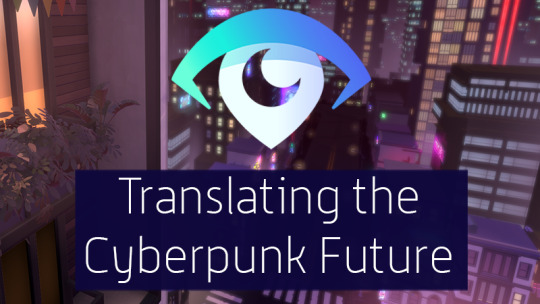
I'm a video game translator, and I love my job. It's odd work, sometimes stressful, sometimes bewildering, but it always provides interesting and inspiring challenges. Every project brings new words, slang, and cultural trends to discover, but translating also forces me to reflect on language itself. Each job also comes with its own unique set of problems to solve. Some have an exact solution that can be found in grammar or dictionaries, but others require a more... creative approach.
Sometimes, the language we’re translating from uses forms and expressions that simply have no equivalent in the language we’re translating to. To bridge such gaps, a translator must sometimes invent (or circumvent), but most importantly they must understand. Language is ever in flux. It’s an eternal cultural battleground that evolves with the lightning speed of society itself. A single word can hurt a minority, give shape to a new concept, or even win an election. It is humanity’s most powerful weapon, especially in the Internet Age, and I always feel the full weight of responsibility to use it in an informed manner.
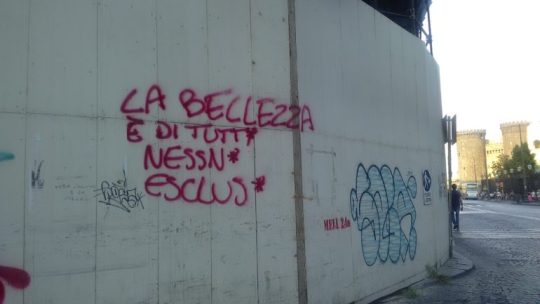
One of my go-to ways for explaining the deep complexity of translation is the relationship between gender (masculine and feminine) and grammar. For example, in English this is a simple sentence:
"You are fantastic!"
Pretty basic, right? Easy to translate, no? NOT AT ALL!
Once you render it into a gendered language like Italian, all its facets, its potential meanings, break down like shards.
Sei fantastico! (Singular and masculine)
Sei fantastica! (Singular and feminine)
Siete fantastici! (Plural and masculine)
Siete fantastiche! (Plural and feminine)
If we were translating a movie, selecting the correct translation wouldn't be a big deal. Just like in real life, one look at the speakers would clear out the ambiguity in the English text. Video game translation, however, is a different beast where visual cues or even context is a luxury, especially if a game is still in development. Not only that, but the very nature of many games makes it simply impossible to define clearly who is being addressed in a specific line, even when development has ended. Take an open world title, for example, where characters have whole sets of lines that may be addressed indifferently to single males or females or groups (mixed or not) within a context we don't know and can't control.
In the course of my career as a translator, time and time again this has led into one of the most heated linguistic debates of the past few years: the usage of the they/them pronoun. When I was in grade school, I was taught that they/them acted as the third person plural pronoun, the equivalent of the Italian pronoun "essi." Recently, though, it has established itself as the third person singular neutral, both in written and spoken English. Basically, when we don't know whether we're talking about a he/him or a she/her, we use they/them. In this way, despite the criticism of purists, the English language has brilliantly solved all cases of uncertainty and ambiguity. For instance:
“Somebody forgot their backpack at the party.”
Thanks to the use of the pronoun "their," this sentence does not attribute a specific gender to the person who has forgotten the backpack at the party. It covers all the bases. Smooth, right? Within the LGBT circles, those who don’t recognize themselves in gender binarism have also adopted the use of they/them. Practically speaking, the neutral they/them pronoun is a powerful tool, serving both linguistic accuracy and language inclusiveness. There's just one minor issue: We have no "neutral pronouns" in Italian.
It's quite the opposite, if anything! In our language, gender informs practically everything, from adjectives to verbs. On top of that, masculine is the default gender in case of ambiguity or uncertainty. For instance:
Two male kids > Due bambini
Two female kids > Due bambine
One male kid and one female kid > Due bambini
In the field of translation, this is a major problem that often requires us to find elaborate turns of phrase or different word choices to avoid gender connotations when English maintains ambiguity. As a professional, it’s not only a matter of accuracy but also an aesthetic issue. In a video game, when a character refers to someone using the wrong gender connotation, the illusion of realism is broken. My colleagues and I have been navigating these pitfalls for years as best we can. Have you ever wondered why one of the most common Italian insults in video games is "pezzo di merda"? That's right. "Stronzo" and "bastardo" give a gender connotation, while "pezzo di merda" does not.
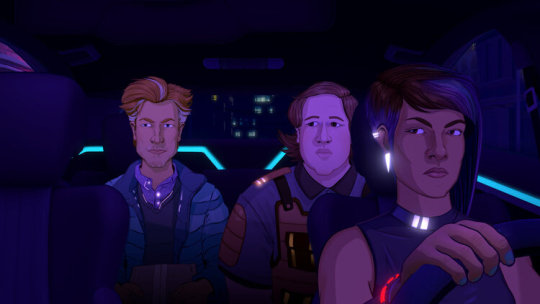
A few months ago, together with the Gloc team, I had the pleasure of working on the translation of Neo Cab, a video game set in a not too distant future with a cyberpunk and dystopian backdrop (and, sadly, a very plausible one). The main character is Lina, a cabbie of the "gig economy," who drives for a hypothetical future Uber in a big city during a time of deep social unrest. The story is told mainly through her conversation with the many clients she picks up in her taxi. When the game’s developers gave us the reference materials for our localization, they specified that one of the client characters was "non-binary" and that Lina respectfully uses the neutral "they/them" pronoun when she converses with them.
"Use neutral pronouns or whatever their equivalent is in your language," we were told.
I remember my Skype chat with the rest of the team. What a naive request on the client's part! Neutral pronouns? It would be lovely, but we don't have those in Italian! So what do we do now? The go-to solution in these cases is to use masculine pronouns, but such a workaround would sacrifice part of Lina’s character and the nuance of one of the interactions the game relies on to tell the story. Sad, no? It was the only reasonable choice grammatically-speaking, but also a lazy and ill-inspired one. So what were we to do? Perhaps there was another option...
Faced with losing such an important aspect of Lina’s personality, we decided to forge ahead with a new approach. We had the opportunity to do something different, and we felt like we had to do the character justice. In a game that's completely based on dialogue, such details are crucial. What's more, the game's cyberpunk setting gave us the perfect excuse to experiment and innovate. Language evolves, so why not try to imagine a future where Italian has expanded to include a neutral pronoun in everyday conversations? It might sound a bit weird, sure, but cyberpunk literature has always employed such gimmicks. And rather than take away from a character, we could actually enrich the narrative universe with an act of "world building" instead.
After contacting the developers, who enthusiastically approved of our proposal, we started working on creating a neutral pronoun for our language. But how to go about that was a question in itself. We began by studying essays on the subject, like Alma Sabatini's Raccomandazioni per un uso non sessista della lingua italiana (Recommendations for a non-sexist usage of the Italian language). We also analyzed the solutions currently adopted by some activists, like the use of asterisks, "x," and "u."
Siamo tutt* bellissim*.
Siamo tuttx bellissimx.
Siamo tuttu bellissimu.
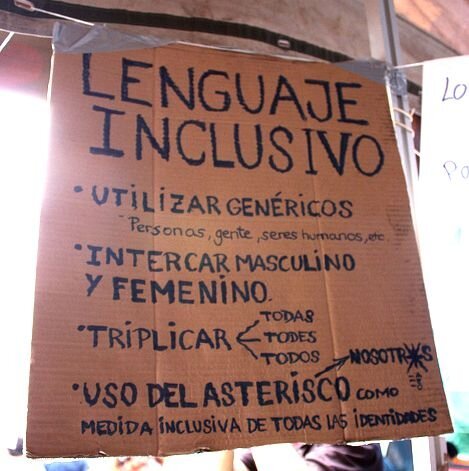
I’d seen examples of this on signs before, but it had always seemed to me that asterisks and such were not meant to be a solution, but rather a way to highlight the issue and start a discourse on something that's deeply ingrained in our language. For our cyberpunk future, we wanted a solution that was more readable and pronounceable, so we thought we might use schwa (ə), the mid central vowel sound. What does it sound like? Quite familiar to an English speaker, it's the most common vowel sound. Standard Italian doesn’t have it, but having been separated into smaller countries for most of its history, Italy has an extraordinary variety of regional languages (“dialetti”) and many of them use this sound. We find it in the final "a" of "mammeta" in Neapolitan, for instance (and also in the dialects of Piedmont and Ciociaria, and in several other Romance languages). To pronounce it, with an approximation often seen in other romance languages, an Italian only needs to pretend not to pronounce a word's last vowel.
Schwa was also a perfect choice as a signifier in every possible way. Its central location in phonetics makes it as neutral as possible, and the rolled-over "e" sign "ə" is reminiscent of both a lowercase "a" (the most common feminine ending vowel in Italian) and of an unfinished "o" (the masculine equivalent). The result is:
Siamo tuttə bellissimə.
Not a perfect solution, perhaps, but eminently plausible in a futuristic cyberpunk setting. The player/reader need only look at the context and interactions to figure it out. The fact that we have no "ə" on our keyboards is easily solved with a smartphone system upgrade, and though the pronunciation may be difficult, gender-neutrals wouldn't come up often in spoken language. Indeed, neutral alternatives are most needed in writing, especially in public communication, announcements, and statements. To be extra sure our idea worked as intended and didn't overlook any critical issues, we submitted it to a few LGBT friends, and with their blessing, then sent our translation to the developers.
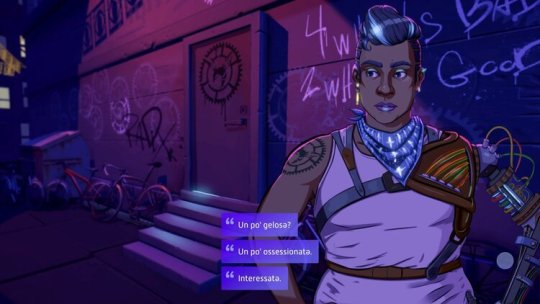
Fast forward to now, and the game is out. It has some schwas in it, and nobody complained about our proposal for a more inclusive future language. It took us a week to go through half a day's worth of work, but we're happy with the result. Localization is not just translation, it's a creative endeavour, and sometimes it can afford to be somewhat subversive. To sum up the whole affair, I'll let the words of Alma Sabatini wrap things up:
"Language does not simply reflect the society that speaks it, it conditions and limits its thoughts, its imagination, and its social and cultural advancement." — Alma Sabatini
Amen.
33 notes
·
View notes
Text
Thoughts on House of X#2
I fell way behind on writing these even as I devoured each issue, so I thought I might as well knock these off as the HoX/PoX miniseries come to an end and the “Dawn of X” looms over the horizon. (Also I did a re-read recently and it got my mind buzzing.)
So let’s get into it!
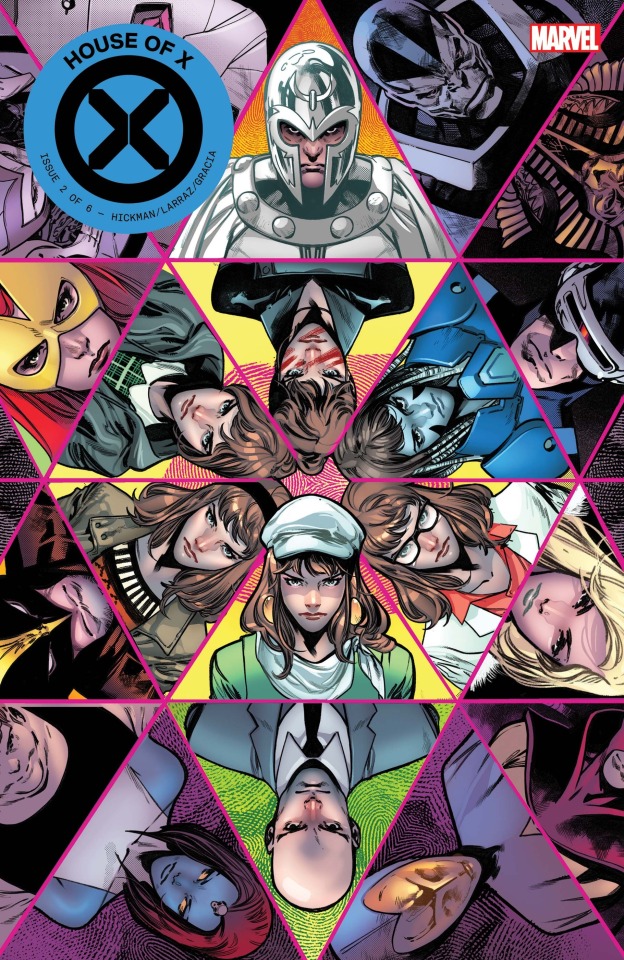
Moira’s Ten Lives:
It turns out that, like everyone else, I was sort of right/wrong about time travel shenanigans. It’s technically a semi-stable time loop, but I’m not about to quibble. (Incidentally, on a re-read one of the things that’s been really impressive to see with the benefit of hindsight is the way in which Hickman et al. top each issue with the newest high concept or reveal, like some mad plate-spinning act.)
Here’s how the individual lives break down:
Life 1:
Because everything in this life takes place prior to the activation of her mutant gene (which, talk about a hell of an additive retcon), Moira’s first life is a romanticized, bucolic portrait of innocence not corrupted by worldly knowledge. The emphasis is strongly on family and nature (note the tree motif, which isn’t as prominent as the tower motif but still) as opposed to scientific pursuits.
On the other hand, you definitely get the sense that the perfect nature of this life is a distortion caused by nostalgia, as we’ll see in the next life.
Life 2:
Moira reincarnates for the first time with full knowledge of her previous life, which for all that HoX/PoX has been analyzed through the lens of both Christian and Jewish theology, can’t help but draw from Hindu and Buddhist thought.
One key aspect of her power is that Moira is given an enormous developmental leg up, being born with all of the skills of a grown adult. Suprisingly, we don’t actually get to see Moira make much use of some of the broader implications of her mutant power.
As a good scientist, Moira uses observation and experimentation to prove to herself that her memories are real and that she can change the future through her actions, two critical pieces of information.
Speaking of Buddhism, Moira’s “curse” concept is tied to the Second Noble Truth, that suffering comes from attachment. In this case, Moira’s problem is an attachment to her memories of her idealized first life: when she meets Kenneth Cowan for the second time, the emotional connection isn’t there because her foreknowledge of her first life changes her perceptions.
At the same time, I wonder how much of her reaction to this upheaval is due to her realizing that her first life wasn’t as perfect as she thought it was (the flaws she focuses on), or that she herself has changed and isn’t content to live and die as a rural schoolteacher.
In this timeline, Charles decides to come out of the closet as a mutant on national television, which is a different tack to how he’s approached pro-mutant activism in the past, although there is a common theme of putting his faith in public debate. Sadly a faith that will be broken.
Despite her misgivings about her own mutant gifts, Moira decides to fly to America to meet Charles...and dies in a plane crash. I wonder how much of her heel turn in life 3 is due to the Kenneth Cowan issue and how much of it comes from her experiencing violent death for the first time?
Life 3:
In Moira’s third life, she turns sharply away from Charles (nicely symbolized by her turning away on a pub stool) to try to cure the mutant gene, which brings her face-to-mask with Destiny, who is the closest thing that this issue has to an antagonist (at least in the sense an outside force acting on Moira and changing her behavior).
The conversation between them is split in two: in the first, Destiny does a good job of laying out why narrative of individual choice/consumerism don’t really work with regard to mutant cures, because of pre-existing structures of power and inequality that will turn an option into a mandate. Something that Whedon’s “Gifted” arc and X3 should have maybe mentioned.
(Incidentally, even before we got the later infographic from Powers of X #4 about mutant genocides, I thought this didn’t bode well for Wanda Maximoff.)
After setting up a Prisoner’s Dilemma situation - if you don’t change your behavior, this scenario will keep recurring - Destiny then gives us the next big reveal of the issue. Moira’s powers of resurrection only give her ten or eleven lives, that there is a way out of the cycle of endless rebirth if she makes the “right choice.” (Word is still out on the other aspects of the Eightfold Path.) I don’t know what the eleventh signifies - after House of X #5, I saw a lot of people suggesting pod-rebirth as her eleventh life, but I dunno.
However, I did spot something this time: Destiny “see[s] ten lives...eleven if you make the right choice at the end.” This may be me reaching, but it suggests that Destiny knows already that Moira isn’t going to get it right in lives four through nine, but isn’t telling her. Which, given the immense potential involved in combining their powers, suggests that it’s not just about Rube Goldberging her way to the Good Ending but rather that Moira has to experience her defeats personally in order to grow into the person who would make the right choice.
Life 4:
Having received a fiery “swift spiritual kick to the head,” Moira makes two changes in her life. First, she begins to approach the question of mutancy from a systems perspective - although I have some significant issues with Hickman’s evolutionary biology. Second, she looks deeper past Charles Xavier’s “confidence...arrogance,” to see the real Charles beneath, and the two fall in love (which makes the second time in her lives).
The result seems to be the 616, breaking down into the Gifted Years (the Kirby/Lee years), the Time of Hate and Fear (the All-New X-Men given to us by Claremont et al.), and “the lost decade,” which given the associated panel is a pretty clear slam on the last ten years of X-Men storytelling, most pointedly Avengers vs. X-Men.
This page (p. 17) has made me somewhat out of step with a lot of folks who’ve been arguing online that Moira’s sixth life must be the 616 - a trend we’re going to see repeating.
Regardless, this timeline is the first to end with Sentinel genocide, resulting in Moira for the first time seeing the dystopian dilemma. Much of what follows is a series of unsuccessful iterative attempts to solve this dilemma.
Life 5:
In her first go, Moira decides to see if accelerating the process will work, showing Charles what happened to his dream in her past lives. Hickman’s use of the term “radicalized” is key here to understanding what’s going on with Krakoa in X^1, because as Moira learns (and Charles will learn), separatism alone will not do the trick. Mutants got an 11-year head start to build up their defenses, and the Sentinels came anyway.
Life 6:
Because this life remains completely redacted, the fandom has gone absolutely nuts in speculation. One common speculation I’ve seen is that the X^3 timeline is Life 6, which I find quite puzzling. The reveal in Powers of X #1 that Cylobel is stuck in Nimrod’s femtofluid database is strongly suggestive that X^3 is Life 9, unless we’re going to say that in alternate timelines in which so many variables change, there’s always going to be a black brain hound mutant who looks identical to Cylobel and who dies in the exact same way. Which strikes me as falling afoul of Occam’s Razor.
Life 7:
Here’s where we really start zeroing in on the dystopic dliemma, as Moira tries to forestall the inevitable by eliminating the Trask bloodline. It doesn’t work because of the whole idea that AI is a discovery not an invention, and as a result Sentinels will always come about and the only thing that can be changed is the name of the person who’ll discover them.
Here is where Hickman’s obsession with mechanical vs. biological transhumanism (and/or singularities) really come into play. If you’ve read his book Transhuman (which I don’t necessarily recommend, as it comes with some rather nasty sophomoric undercurrents that have aged very badly in the last ten years), you’ll know that Hickman considers biological transhumanism to be superior to the alternative. Something to keep in mind when thinking about mutants vs. the man-machine supremacy, mutants vs. the technarchy, etc.
Interestingly, we never learn what happened to Xavier or the X-Men in this life.
Once again, Moira is “radicalized” by the seeming inevitability of robotic genocide, although it’s noticeable that her focus is shifting from humans to their creations.
Life 8:
Her solution is to go to Octopusheim and ally with Magneto, presumably because the Master of Magnetism is her first bet to go up against the mutants.
Magneto reacts to “the good news” with thermonuclear war, and gets curb-stomped by a combination of the Avengers, Fantastic Four, and X-Men.
Important note that by this point, Moira dismisses the idea of any great good beyond that only of mutants, and we go for another round of radicalization.
Life 9:
At this point, Moira decides to ally with Apocalypse out of desperation, presumably because Apocalypse is a revolutionary who can’t be killed as easily as Magneto can.
Although we didn’t know it at the time, this is X^2 (and I think X^3) as well, and while Apocalypse’s power levels allow him to prosecute a war “without end,” it doesn’t solve the strategic stalemate.
Life 10:
I don’t know what the two black panels suggest; it’s quite possible that they’re just pauses for emphasis.
In her tenth life, Moira takes a step back and focuses instead on “all the old ways of thinking.” Here, I think we see a preview of the Krakoan solution: mutant unity will unlock synergies of cooperation that were not possible while working with limited mindsets and only a part of mutankind.
Notably, we don’t know when Moira or anyone else found out about the possibilities of Krakoa and mutant biotechnology - we know some of it existed in Life 9 because we see Krakoan flowers being used, but we don’t know if Moira encountered it earlier or whether the higher order stuff was in use. I somehow doubt the resurrection system was intact, because it would seem to make Mister Sinister’s breeding program largely irrelevant.
Once more, we return to Powers of X #1, as we now know what Xavier learned from Moira’s mind.
Infographics:
The whole circle wrap-around thing is very evocative of other signs we’ve seen (on Cerebro when Xavier uses it for various higher-order stuff, on the Librarian’s face, etc.), but it actively makes the map harder to read, which I think is the point.
(Also, while I’m complaining: Comixology is not well set up for these large-scale infographics, because it keeps crashing on me when I try to zoom in. Very annoying.)
Note: earlier lives are more leisurely, things more spaced out, and then the pace accelerates as things get more intense.
One interesting difference between Life 4 and 616 canon: Moira and Xavier marry when she’s 23 and establish the Xavier School 12 years later.
Life 5 is interesting, because we’re seeing repeated themes of Moira in comas, even when it might not be necessary. For example, what’s the dramatic purpose of having the two Sentinel attacks?
In Life 7, I noticed that Larry Trask isn’t killed with the rest of his family. Is it because he turned out to be a mutant?
Life 8 is the first instance where I think the initial panelling let us down. The original one-two punch heavily implied that Magneto was defeated on his first attack on Washington D.C, but here we learn that he ruled America for eight years before being defeated and killed. (Incidentally, this suggests that the visions he’ll have of his failures don’t include this life).
As other people have noted about Life 9, Xavier and Magneto are killed in Years 19 and 21 respectively, which makes it easy to rule out their appearances as happening in Life 9. Also, it’s significant that the first horsemen aren’t on earth (almost certainly on Arakko/No-Place).
Life 10 including Moira’s marriage to Joseph McTaggert despite presumably knowing from earlier lives that he would be abusive suggests that Moira may well have gone into the marriage because she needed Proteus to form the Five. Not sure how I feel about that. Finally, I’m a bit puzzled about what the schism was and whether it was genuine vs. feigned (after all, Moira is faking her death, so there’s plenty of skullduggery going on).
14 notes
·
View notes
Text
About BSD S3
Alternative title: Kenna talks about stuff literally nobody asked her to <3
So now that s3 is over and I’ve had a few days to breathe, I think I wanna say a thing or two about the season overall. Now, I’m not a meta writer, I’m not a person who can go in over analyzing everything perfectly- quite simply, I don’t have the brainpower to do that for too long. So rather than this being an analysis of everything and an objective evaluation of the quality of the season, this is largely an emotional response where I just talk about my experience with it. I’m not a critic- I don’t think I have that in my blood. I watch to enjoy, then reflect on what I did and didn’t enjoy, taking snippets and twisting them into something that might become deep and meaningful occasionally if it suits my writing. There’s nothing wrong with being a critical analyzer! We need you all in the fandom for all these fabulous metas and such <3 I just don’t think I’m the right gal for the job.
“So, Kenna, what is it you have to say?” Well, in the simplest of terms,
I really liked season 3.
“...wow. Groundbreaking.”
Now, let me explain myself. There are problems with season 3, as there are with most seasons, but I feel, overall, there were enough things that I liked about season 3 to keep the season in my favor.
I think my biggest criticism would have to be with pacing. The pacing in this season was so off for me and can be described as sporadic at best. From backstories to character introductions to character re-introductions, there was so much that went by in a blur and so much that seemed to go on forever. My biggest complaint probably has to do with (yup, you guessed it) the adaptation of Fifteen.
Let me explain.
First of all, I think the complaints that Bones used Soukoku as ship bait have a sturdy foundation, and I’m not here to dispute that. As a Dazatsu main myself, I’m not gonna complain about loving scenes with your favorite ship in them- I would absolutely die if next season (hopefully there is a next season!) we got a three-episode plot revolving around Dazai and Atsushi. However, I just don’t think it fit in nicely with the rest of the series.
After all, it’s kind of unfortunate that we got 3 episodes of Soukoku’s backstory, and yet our protagonist only got 1/3 of an episode.
Maybe Fifteen would’ve stood better as an OVA, or maybe if it could’ve been shaved down to two episodes. Maybe if BSD had been given three more episodes for genuine content, things would’ve been better. I don’t know how possible any of these things would’ve been, but they’re ideas. Don’t get me wrong, I enjoyed Fifteen overall. But I remember thinking that it seemed so out of place when I knew the chaotic arc that was coming.
I’m not an avid manga reader, but I know enough to be able to say that the BSD manga has a lot of content, a lot of nuance, and a lot of personality. The manga is the source material and what got people so invested in the story. If there wasn’t an interest in the manga, would there even have been an anime adaptation? What I’m saying here is that staying true to the manga is a good rule of thumb, and while of course you won’t be able to translate everything into animation, it’s probably best to try and be as similar as possible with a story like BSD.
Manga readers ate up the story of BSD without being interrupted by Fifteen, because as far as I’m aware, Fifteen is fairly new? (Didn’t it come out around Dead Apple time? I’m not entirely sure, but it might’ve been.) And, unlike The Dark Era, the events of Fifteen didn’t have nearly as much of an impact on Dazai (that would later impact our protagonist- after all, how could he mentor Atsu if he never quit the mafia?). Fifteen was more Chuuya-centric in terms of future impact, which brings me to my next point.
Chuuya is a side character. I love him, honestly, and think he’s a great character, but he isn’t our main focus. This seems to be a problem that Bones has a lot: “forgetting” who their protagonist is.
I can defend The Dark Era because of how it explains Dazai’s connection with the mafia and why he switched sides. Dazai is easier to get away with focusing on because he is a primary character, although not the protagonist, and probably has some of the most influence on our true protagonist out of all the characters we know. Chuuya....doesn’t. At least, not yet. His backstory, while interesting and fun to see, is inconsequential to where our protagonist is at right now in the story. In fact, I’m not even sure if Atsushi and Chuuya have interacted in the anime aside from that standoff in the hospital hallway- and even then, that was an illusion. While Fifteen gave us a glimpse to Dazai’s life in the mafia, it didn’t give us anything we didn’t already know other than how he met Chuuya, and how he met Chuuya didn’t impact his relationship much with him or explain why he hates him so much- they just kind of always did. (what would you call that? Anti-chemistry?) That means it also didn’t really impact the major decisions Dazai had to make to get to where he was when he found Atsushi- which is when he began to matter, because that’s when he started influencing the world of the protagonist who is supposed to drive our experience through the narrative.
Please note, this isn’t a hate on Soukoku, and if you like Fifteen, or thought it fit, or just liked it because it gave you such good SKK content, I’m happy for you! This is just a personal grudge I have with the series.
This is why Fifteen would’ve stood better as an OVA- it doesn’t have anything to do with the protagonist. A core purpose of the protagonist in any story is to make the narrative relevant. The events of a story are connected because they pertain to the protagonist. Let’s take the Hunger Games as an example. The events of the actual game don’t relate at all to the death of the Everdeen father, or the fact that Primrose Everdeen was selected, or the fact that a certain Everdeen was given a pin of a mockingjay. These are all important because they relate to our protagonist, Katniss. Her father dying made her have to step up inthe household and feel responsible for her mother and sister’s safety, which helped prompt her to volunteer as tribute. Her pin later became the symbol of a revolution, but only because it was hers. If our protagonist had been Peeta, Katniss’ backstory with her father and mother and sister wouldn’t matter to us because it wouldn’t be our protagonist’s concern.
So, why, then, did we get 3 episodes of Chuuya’s backstory and 10 minutes (not even) of Atsushi’s? Hell, we got more of Kyouka’s backstory than Atsushi’s, or at least a better buildup to it. We even got more content of Randou, a character they completely screwed up (and also didn’t really affect Atsushi). I know events are tied together and connected, but when trying to fit an arc like Cannibalism into 12 30-minute episodes, you’ve gotta decide what’s important and what’s not.
Bones, I feel, didn’t choose what was most important.
“Alright, Kenna, all you’ve done is complain. I thought you said you liked season 3?”
That’s the thing, though- I did.
I like the time they spent with Lucy and Kyouka’s hostile interactions. I liked the background they gave to certain characters (Gin, Kyouka, Atsu [even though we got so little], Katai [-ish]) plus we got more Fyodor content. Fitzgerald’s episode was really good, too! I’m a newly-fledged, softcore Fitzgerald stan. I think the last three episodes were pretty well put together, and I ADORED the final scene (no, not just for the Dazatsu content- although thank you for the food, Bones uwu).
Now, these are all little things, yeah, but I feel together they make up enough for Fifteen on my end. See, I’ve always thought BSD had pacing issues from season 1. It’s no news to me that they had trouble squeezing all the content in the episodes they were given, to be honest. If I separate Fifteen from the rest of the season, to me, it’s cardinal sin is pacing, and only pacing. The issues of Fifteen are plentiful, but it doesn’t seem fair to me (and for me, it’s more than ok if you disagree) to pile that all on to the rest of the episodes. Yeah, it was disappointing that we didn’t get as much Fyodor time, or Atsu backstory time, or whatever else we wanted. But to me, that’s okay. We still got the point of what’s going on- the city is in trouble, the worst is yet to come, and Atsushi and Akutagawa have a deal now.
Bungo Stray Dogs has always appealed to me because of its characters more than its story, I connected with the people, not the narrative. I still thoroughly enjoy the story, but I’m more interested in how the characters interact in general and how they operate as a team or in stressful situations. For that purpose, Bones provided. At least they did in my book, even if we didn’t get enough of who we wanted to see.
I have hope for next season, if there is one. I have hope that Bones will right their wrongs. I have hopes that they’ll fix their pacing a little bit. The manga has so much content to portray, though, that a certain pacing issue can be forgiven (like the ones I saw in s1 and s2.) And, because I love the characters, I’m willing to hold out for another potential season and see if they can fix it.
If you’re upset, you have every reason to be. But, though I have my complaints, I can’t say I’m too terribly disappointed. Maybe a little, but I still look forward to future content. I hope we get it soon, if at all.
(And, believe it or not, this is the shortened version of all my thoughts. Haha!)
#bsd#bungo stray dogs#bungou stray dogs#anime reaction#attempted meta#bsd spoilers#bsd season 3 spoilers#bsd season 3#long post#orig
40 notes
·
View notes
Photo
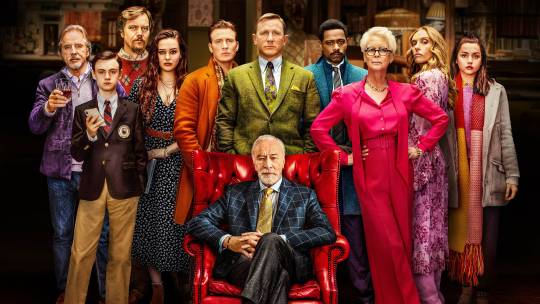
Murder, He Wrote.
“They say casting is 90 percent of directing and it was really true in this case.” Knives Out writer and director Rian Johnson tells us about the intricacies of whodunits, the joys of over-analyzing movies, and—yes—Star Wars.
From Hercule Poirot’s debut in an Agatha Christie novel in 1920, to the hard-boiled detectives of the 1930s, to the Pink Panther comedies, the whodunit was a perennially popular film genre—until its decline in the 1980s, when true-crime re-enactments took over. But, with Knives Out, writer/director Rian Johnson (Looper, Star Wars: The Last Jedi) is on a mission to reaffirm the whodunit’s rightful place on the big screen—and casually reinvent the form while he’s at it.
Knives Out has a gobsmacking ensemble, with Christopher Plummer (as writer Harlan Thrombey, the victim), Ana de Armas (as Marta, Thrombey’s nurse and confidant), Daniel Craig (as Benoit Blanc, the famous private detective who shows up to query Thrombey’s apparent suicide), and Lakeith Stanfield (as the investigating Lieutenant Elliott). Making up Thrombey’s extended, entitled family are Jamie Lee Curtis, Don Johnson, Chris Evans, Michael Shannon, Toni Collette, Riki Lindhome, K Callan, Katherine Langford and Jaeden Martell—all well fed by his wealth and determined to protect their piece of it.
It’s a Rian Johnson movie, so Noah Segan shows up as well, in perhaps his meatiest role yet, as a cop working with Stanfield. There’s also a delightful cameo from Frank Oz.
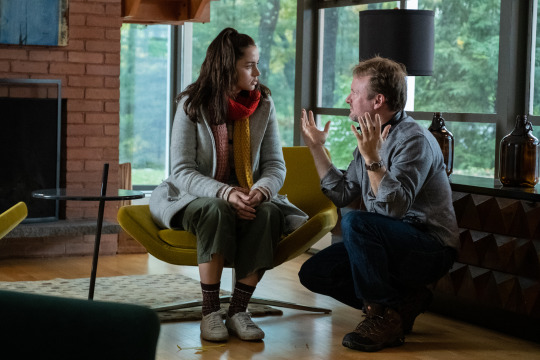
Rian Johnson directs Ana de Armas on the set of ‘Knives Out’.
Despite the lack of big-screen whodunits of late, there’s no shortage of audience enthusiasm for them, as evidenced by our ‘Murder Mystery’ Showdown, a great starting point for anyone looking to delve into the genre. Letterboxd members who have already seen Knives Out are very much enjoying what they see, with the film boasting a giant 4.2 average rating (at time of writing).
This is one of those films where you can just tell how much fun the cast is having, an aspect that Letterboxd member Wes nails in his review: “I’d really, really, really like to believe that Rian Johnson gathered all these actors in this giant house, hid some cameras everywhere, hit record, and none of what we saw was fictitious.”
Demi Adejuyigbe writes—in his charming Letterboxd review of the time he lunched with Johnson (!)—that the film is “absofuckinglutely phenomenal”. He marvels at how Knives Out stays one step ahead of what we expect from a whodunit: “How do you fool an audience that has come to be fooled? Johnson is so deftly able to get that joyful, wondrous reaction out of me by expertly controlling every aspect of the script and the direction in a way that makes it clear he sees the entire process as a symphony that he’s conducting, where the audience is just another instrument being played.”
Or perhaps Patrick Willems best encapsulates the joys of the film when he writes that Knives Out is “a movie as good as its sweaters (the sweaters are excellent)”. (The most popular sweater has its own story, here.)
When we got in a room with Rian Johnson recently, we naturally wanted to learn how he juggled such an impressive ensemble whilst navigating the twists, turns, and more twists of Knives Out’s plot.

Chris Evans and Ana de Armas wearing sweaters, Rian Johnson not wearing a sweater, on the set of ‘Knives Out’.
You’ve often talked about your lifelong love of the whodunit genre. How did you go about making your own? Rian Johnson: It’s very interesting, the whodunit genre. It’s one of my favorite genres. I love all the things about it. I also kind of agree with Hitchcock. Hitchcock hated the whodunit genre. To Hitchcock, the danger of the whodunit is: it’s a lot of build-up for one big surprise at the end, and that’s not very satisfying or fun. That’s why he was all about suspense. He would give the audience information early and then you’re in suspense and not just crime-solving. He would also mislead the audience, so you’d think you’re getting all the information early. And enough so that you’re leaning forward, you’re not sitting back. That’s Hitchcock’s whole deal.
So for me, what was interesting is: can I put the engine of a Hitchcock thriller in the middle of a whodunit? Have a whodunit that then turns into a Hitchcock thriller that turns back into a whodunit? That was kind of the starting point for me, from a genre-wonk point of view.
So then I started filling out, okay what would that actually mean? I’m talking around it because I don’t wanna spoil anything, but, okay if we did this and then that could be interesting. And then I started zooming in bit by bit and filling out what characters I would need for what plot points. All the details come later but it’s as ‘big picture’ as that.
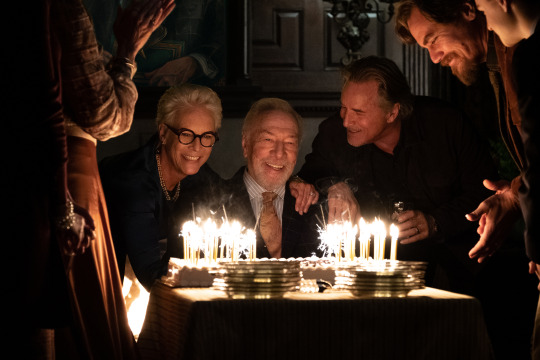
Jamie Lee Curtis, Christopher Plummer, Don Johnson and Michael Shannon in ‘Knives Out’.
Were there ever any alternative outcomes in play? Not really, because I didn’t really work, like, “if this happens, then that happens, then that happens”. I worked it like a satellite map. I zoomed back. I work in little notebooks and I have to draw one line and see the entire plot along that line. So it’s not like a game of Clue where I can pick out different solutions at the end; it’s kind of set because the shape of the whole thing determines a different kind of ending from the very inception of it.
Watching this, I thought about your film The Brothers Bloom, as that’s another ode to a somewhat specific genre—the con-artist film—in which your affection for that kind of film was also evident. How challenging is it to write and shoot films in genres you grew up loving? Any time I’m attacking a genre it’s because I deeply, deeply love it. The heart of it for me is always trying to distill the thing I love about it and set that as the goal-post and then find my own way to it. Whether it’s the con-man movie with The Brothers Bloom, or Star Wars as a genre, or this, it’s always about trying to get to the heart of what I love about something and then trying to put that on the screen so the audience will have as pure an experience of it as possible. And sometimes to give the audience the purest experience, you have to shake it a little bit, because… we’ve seen so many versions of it over the years that the audience can kind of ignore it. So sometimes you have to put it in a different context, like with Brick, with film noir or something. But the intent is always to give the audience the most sharp and vivid experience of what’s at the heart of it for me.
This film is a blockbuster of chemistry. Was it difficult to cast? Once we got Daniel on board, no. Once he was the centerpiece, I think everyone wants to work with him so it was like a snowball. Because then we got Michael Shannon, and everyone wants to work with him. And Lakeith Stanfield. So, no, the cast came together very, very quickly, just like everything else in this project. With these actors, my job is easy. They show up on set, they clicked in so easily. They’re such pros. They say casting is 90 percent of directing and it was really true in this case.
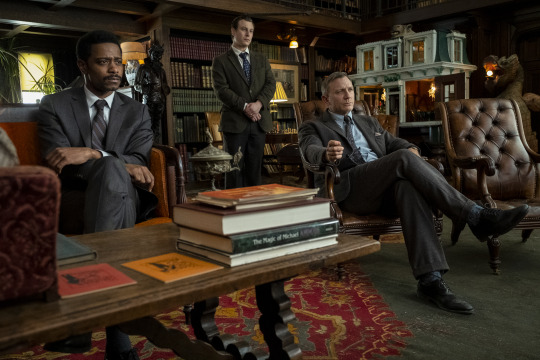
Lakeith Stanfield, Noah Segan and Daniel Craig in ‘Knives Out’.
Speaking of Daniel Craig, his character is a microcosm of the film in that he is not in any way like any detective that has come before, yet you cannot help but think of precedents. Were you consciously trying to make him unlike Hercule Poirot? When I started writing, I actually kinda got myself in trouble because I was thinking too much about Poirot. I love Poirot so much and I think I was thinking too much like: how do I make my Poirot? And so I started doing all this sort of quirky stuff, and throwing all these quirks in there, like maybe he has an eye patch and a peg leg maybe. It was just silly. And so finally I said “this is so stupid”, and I pulled all that stuff and I just said: “I’m gonna write this character very straightforward. The way that he needs to be for the script. And I’m gonna give him a Southern accent, because then he’s a fish out of water in New England. And then whoever I cast, I’m gonna believe that they’re gonna inhabit that character in such a way that he’ll be unique.”
I think what Daniel found—that is exactly what is at the heart of Poirot—is Daniel found kind of what’s funny about the character. Beyond the accent. He found the self-inflated, clownish aspect of him, while still maintaining a humanity and an intelligence, which is really what Poirot is. It’s why Peter Ustinov is my favorite Poirot—he gets what’s funny about the character. And like Columbo or like Miss Marple or any of the great fictional detectives, it’s that element that makes you not quite take him seriously until it’s too late and they’ve solved the whole case. I think that’s what Daniel keyed into more than anything else.
This feels like a film that people are going to pore over the details of, as they did with Looper. I love it because that’s part of what I love about those kinds of movies. First of all, let’s separate them, because with time-travel movies, the notion that a time-travel movie can make sense is absolute nonsense. So time travel is much more like the spells in Harry Potter than science, and anyone who thinks otherwise is fooling themselves. Except maybe Shane Carruth. Shane is the one person who can actually figure out time travel. Everyone else, it’s kind of like a fantasy element more than anything else.
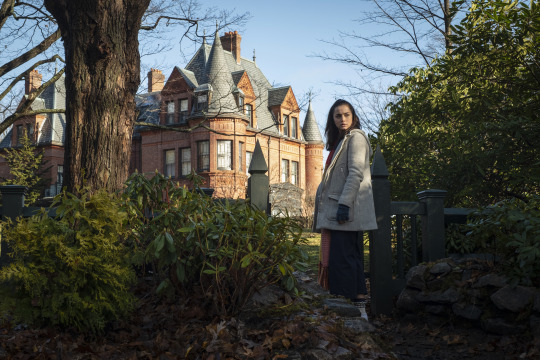
Ana de Armas in ‘Knives Out’.
So with Looper, I felt like I had to have it make narrative sense, but I didn’t feel the pressure of it having to work in every little detail, because it can’t. Whereas, it’s a little different with a whodunit because every screw has to be tightened and I can’t leave any loose ends. I do want people to be able to re-watch and dig in. But I’ll be a little more sad if they find things that don’t make sense. I’m sure they will, but it’ll actually make me a little sad if they do, because I’ll be like: “I messed up there”.
How do you feel about your films being subjected to that kind of scrutiny? I think it’s fun! That’s the thing: for a certain kind of moviegoer, that’s the pleasure you get—it’s almost like the kid who if you hand them a radio, you’re gonna wanna take it apart. If that’s what someone loves about watching a movie then I think that’s fantastic. I’ve done that with certain films. I’ve watched them over and over and tried to analyze, so I get [that] that’s part of the pleasure of it.
How are you feeling about your Star Wars experience? As a filmmaker, as a Star Wars lover, it was the best experience of my life. Everything about it. Writing it. Making it. The people I got to meet. The places I got to go. The experience I had putting it out. The last two years interacting with the fans has been so rewarding and so fantastic.
I feel like I always have to say that the bad part of that gets written about a lot because it’s interesting to write about. From being in the middle of the hurricane, I can tell you that 95 percent of my interactions with fans are absolutely lovely. That’s not to say they all even like the movie—some of them don’t, or some of them have issues with the film—but they’re all engaged and respectful and so deeply engaged in it in a way that when you make movies you only dream that people will engage with something that you made on that level. So no, for me, the whole thing top-to-bottom has been the most beautiful experience I can possibly imagine.
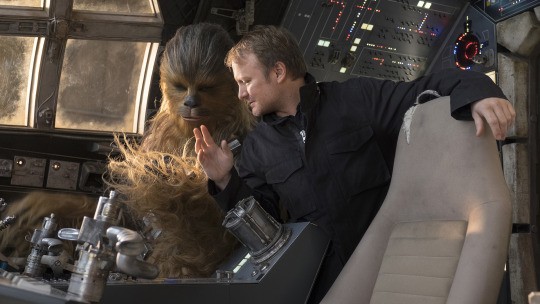
Rian Johnson directs Joonas Suotamo on the set of ‘Star Wars: The Last Jedi’.
Something that I know in my bones from being a Star Wars fan since I was five years old: everybody has a slightly different version of what Star Wars is to them, absolutely. That’s why I’m excited that stuff like [new Disney+ series] The Mandalorian can exist. The more Star Wars stuff we make, the more there’s gonna be a spectrum that gives different people the things that they want. But we also have to recognize that nothing is gonna give everybody what they want, and somebody is always gonna be upset.
What George Lucas did originally was make a movie that was straight from his heart, and expressed exactly what this world was to him. And expressed emotional truths in this world in a way that was resonant for him personally. I feel that every filmmaker who comes to Star Wars, that’s their job. Their job is not to take a survey and to see what is going to have the broadest demographic appeal. Their job is to speak from their heart and make a thing that resonates with what Star Wars is for them. And I think the more diverse filmmakers we have doing that, the more diverse Star Wars movies we’ll have, the more people will hopefully be happy and the less yelling there’ll be all around.
‘Knives Out’ is now in theaters. Comments have been edited for clarity and length. With thanks to Studiocanal.
#knives out#rian johnson#star wars#star wars the last jedi#whodunit#whodunnit#murder mystery#daniel craig#chris evans#jamie lee curtis#michael shannon#frank oz#clue#cluedo#crime#detective#hercule poirot#agatha christie#alfred hitchcock#hitchcock#don johnson#toni collette#christopher plummer#sweater#aran knit#aran sweater#sweater weather#ana de armas#letterboxd
5 notes
·
View notes
Text
My thoughts on Izu/Ocha: Meta
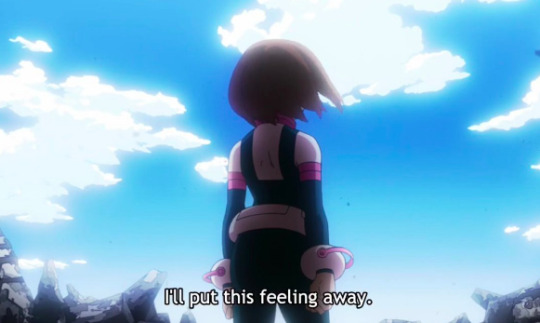
cue frustrated shipper screams
by mysterylover123
At the end of the day, irrespective of any shipping wars, I just want HeroAca to have a good ending. Many manga/anime/franchises have been utterly destroyed by a bad ending, while others are elevated by a great one. And a very consistent element in Bad Endings is poor handling of romantic subplots. Exhibits include: How I Met Your Mother, Naruto, Bleach. Horikoshi has listed both Marvel and Shonen Jump as his major influences, and BNHA is published in the latter. Both companies have a history of terrible Romantic Subplot decisions: Selling Spider-Man’s marriage to Mephisto, the IchiHime vs IchiRuki debate, the awkward Staron and Brutasha subplots in the MCU, and the fiery pit of controversy that is the Naruto ending pairs - all of it ultimately harming the narrative’s integrity and preventing audiences from enjoying the story. While a badly handled romance subplot doesn’t have to tank the ending of an action series, it’s still a thin line to walk.
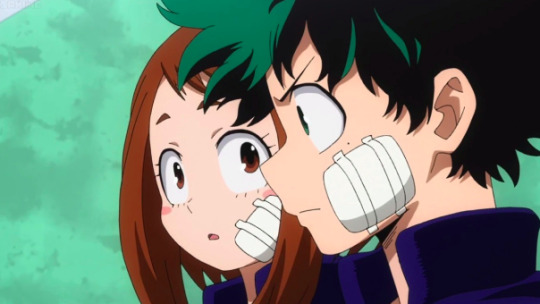
On the surface, BNHA’s main pairing of Izuku Midoriya/Ochaco Uraraka, or Izu/Ocha as it’s called, seems to avoid the obvious problems. There’s no More Important Girl in Deku’s life, there’s no coding on his rivalries, and no melodramatic love triangle to annoy people. In fact, I can even say that Izuku and Ochaco’s dynamic is pretty fascinating. But not yet as an endgame pairing. My feelings on Izu/Ocha are complicated. I simultaneously ship it and don’t. I ship it because I enjoy them both as characters, I think they’re good friends, and they seem to like each other; I don’t ship it because the execution so far has been rather awkward, the romance lopsided on Uraraka’s side, and the nature of their relationship struggling to get to the levels of intimacy I’d expect from an endgame pairing. I’m afraid, in short, that Horikoshi will do what other Shonen manga have done: have a supporting female character become defined by her love for the Lead, have the lead spend the whole series ignoring them to obsess over their rivals and villains, and throw the two together at the last minute without properly developing their romance, leaving both fans of the pairing (because of the lack of onscreen development) and non-fans (because of the weak storytelling) alike disappointed and frustrated.

There are several options for what could happen besides that terrifying prospect. Izu/Ocha could spend lots of time developing their romance, correcting the problems I’ve spotted and outlined in this meta - I’ll mention a few areas where I think they could change these problems as I go along - and become a great Official Couple, like some of the success stories in Shonen romance writing (Ed/Win, Vegeta/Bulma…erm, that’s all I can think of). Alternatively, they could grow away from their crushes on each other and set them aside, ending as friends instead of lovers, possibly with no Official Couples (One Piece, and in the west, Gravity Falls, do something like this). That could work too. They could both end up with other people. They could end up having a tragic falling out and become enemies. At this point, anything’s possible. But what I do know is that they need to change something about their dynamic, and change it fast, or else the story is going to go barreling into the problems of it’s predecessors - the flaws in Shonen manga the series is so well known for avoiding, like pacing issues or Power Scaling. And I don’t want that.
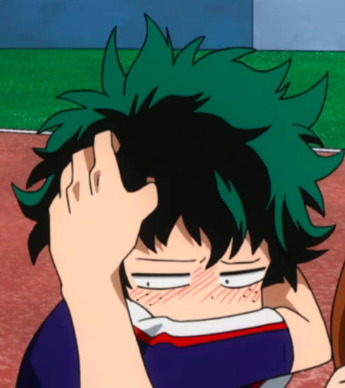
I wrote this meta mostly to contextualize/analyze the Izu/Ocha dynamic for myself. I find their relationship interesting, and most meta on Izu/Ocha barely scratch the surface of their relationship, only going so far as to say either “I don’t like it” or “I like it, and you all are stupid for not liking it”. My feelings on Izu/Ocha are complicated, and I wanted to do a meta on them. Both their relationship, and as two of my fave characters in BNHA. What I want from a storytelling, meta-narrative perspective is a good story. What I want from a character loving POV is for my faves to be happy. If the series shows me they’ll make each other happy, I’m good. It’s just that so far, their relationship doesn’t seem to work that way.
So I’ll go through each arc of the series, and try and detail their interactions from both Deku’s POV and Uraraka’s. I’ll highlight the moments I like and find shippy, and the things they need to work on as a couple. Hopefully this’ll be an enjoyable read (it ended up really, really long), and I’m sorry if Izu/Ocha fans reading it get mad at me - I have nothing against it as a ship, I just want more from the relationship in canon.
Without further ado:
Entrance Exam Arc:
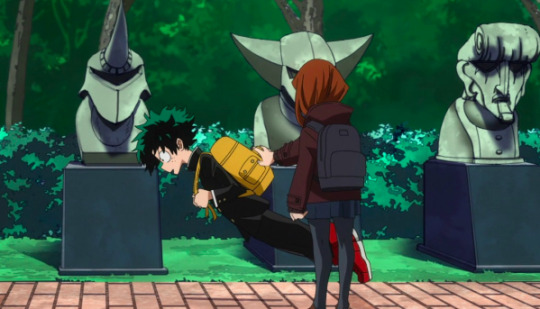
Deku’s POV: Deku’s first impression of Uraraka is great. She’s a cute, kind girl who stops him from tripping over his feet.
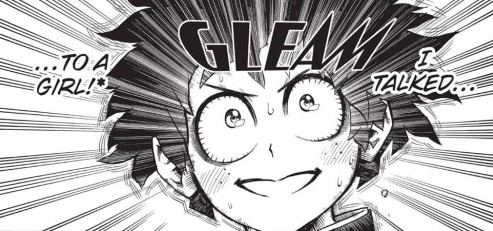
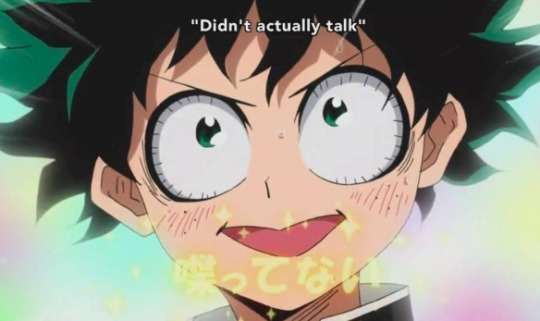
He does, however, think of her as “a girl” (“I just talked to a girl!”), which is a pattern with how he often reacts to her - as “a girl”, rather than “Uraraka”, later on down the line. When Deku shows attraction to Ochaco, it’s to her as an exemplar of the female, rather than as a person.
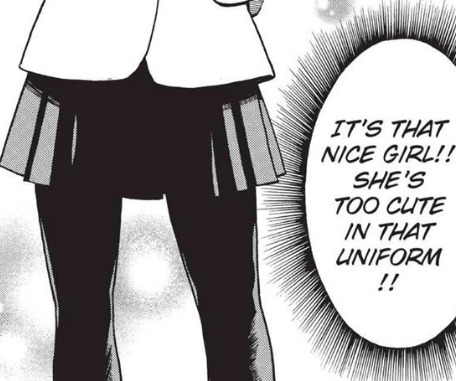
Compare Deku’s attraction to her uniform and costume, or responses to talking to ‘a girl’, to say, Naruto saying he likes Sakura’s “large charming forehead” or Darcy in Pride and Prejudice thinking of Elizabeth’s “fine dark eyes”. Big difference in terms of how romantic the attraction comes across.
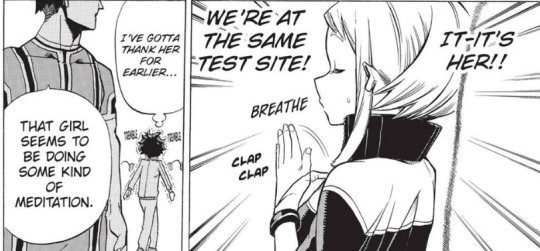
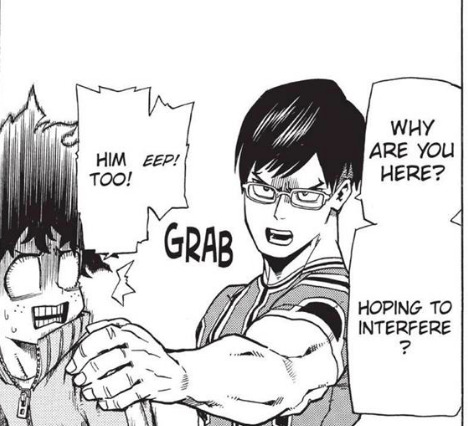
Iida stops Deku from talking to Uraraka before the test, saying he’ll just distract her. Take a shot every time someone frames Ochaco’s potential interest in Deku as being a ‘distraction’ that she has to do without.
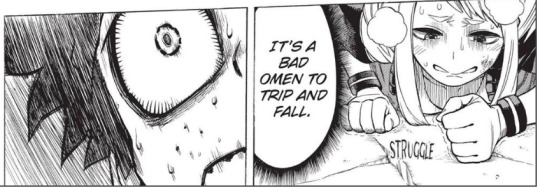
Deku notices Uraraka pinned under rubble and jumps to save her. He compares this mentally to doing the same for Bakugo in the previous arc, from the sludge villain. But there’s no All Might here to save Deku, and when he jumps he breaks three limbs. His decision gets him into UA, but he thinks he failed. For weeks, Deku feels miserable about this, wallowing in despair because he threw away his chance to get into UA. He gets the news from All Might, and learns that Uraraka went to offer up some of her points for him. Now this is sweet, but let’s look at what we know of Deku’s character now and talk about why I don’t think he appreciates this all that much, and why it wouldn’t have been good for their relationship if that was what got him into UA.

Deku doesn’t believe in himself. He has huge issues with personal security and confidence because of his past. He wants to be there for other people, to be “able to smile, while doing something good for them”. Deku wanted to get into UA on his own merit. So had Uraraka actually been the one to get him in, out of gratitude, it really would have done a number on Deku’s self-esteem. It would have told him that he wasn’t good enough to get in on his own, that someone else had to sabotage themselves to bail him out because of his mistakes. Fortunately, that’s not what happened - he got in because Rescue Points - but from an Izu/Ocha standpoint, it doesn’t seem calculated to cause Deku to fall in love with Uraraka. He doesn’t want someone to take pity on him and sabotage themselves so he can do well.
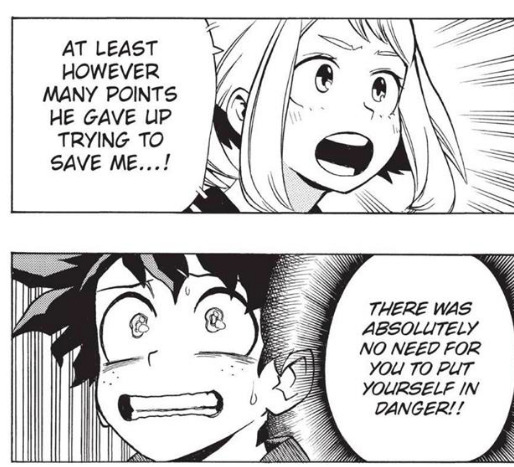

That’s why he doesn’t seem all that moved by Uraraka’s gesture here - we could have had many close-ups and reaction bubbles of him thinking about how wonderful she was for doing this, how generous and kind of her it was, but nope, nothing like that happens. Deku is only ecstatic once he learns that he made it in on his own merit. As he should be, of course, but ultimately this first encounter doesn’t do a lot to set up Izu/Ocha.

Ochaco’s POV. Ochaco is a nice girl who saves people in trouble. She’s also very, very insecure. I’ll get into that more later, but despite Uraraka’s cheerful exterior, she’s even more insecure than Deku is. She saves him when they first meet, then walks off after talking at him for a few minutes.

He doesn’t respond to her at all out loud and she quickly moves on. This is a small microcasm of their entire dynamic: Ochaco often talks at Deku rather than with Deku, and he rarely talks to her about anything. We’ll get more into that later.
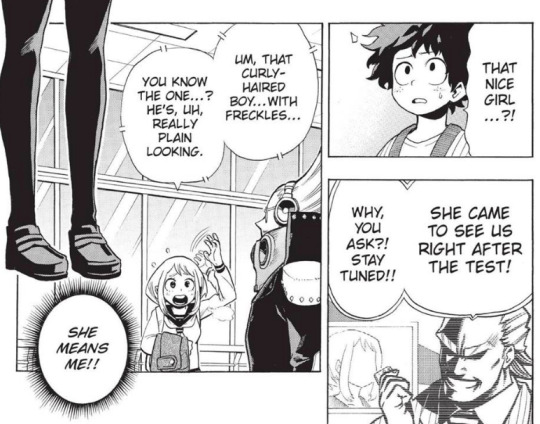
Ochaco gets saved by Deku during the exam, saves him in return, and later on offers him her points. When she brings him up to Mic, she calls him “plain looking” and “didn’t stand out at all”. Lovely first impression. Of course, it’s not impossible for a romance subplot to start with the love interest not finding the hero attractive. The aforementioned Pride and Prejudice, for instance, starts with Darcy calling Eliza “tolerable, but not handsome enough to tempt me.” But within two chapters he’s gushing about her “fine eyes”.
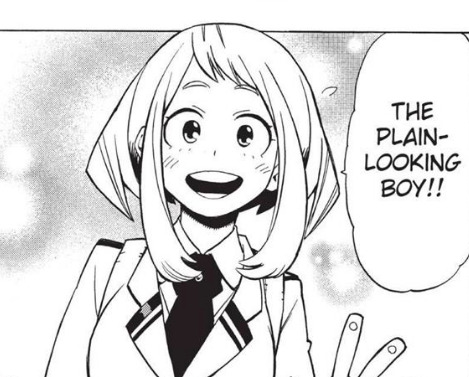
200+ chapters later, and Ochaco still hasn’t said a word about finding Deku more attractive now. Now, she could, hopefully some day, realize that she no longer finds him plain, and that she’s grown to find him attractive. Say something about those big green eyes or his fearless smile. Something personal, like he has yet to say about her, to express that she finds him appealing. But nothing yet.
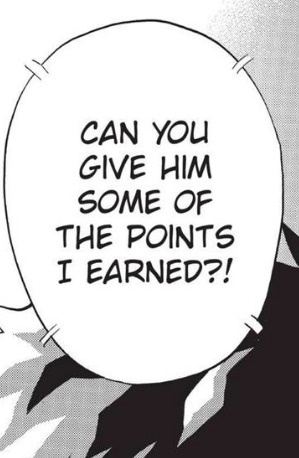


Uraraka giving Deku her points, from her POV, is I think motivated just as much by pride as it is by gratitude. She got into that scenario because she was pinned down, and she probably feels like it was her fault. It would be kind of creepy, actually, if she was willing to throw her own chances under the bus for someone she just met because she liked him or was in love with him - Misa Amane levels of love-at-first-sight co-dependency. Uraraka doing this because of her own pride seems more fitting to me, more in line with the character we get to know later on.
EG:
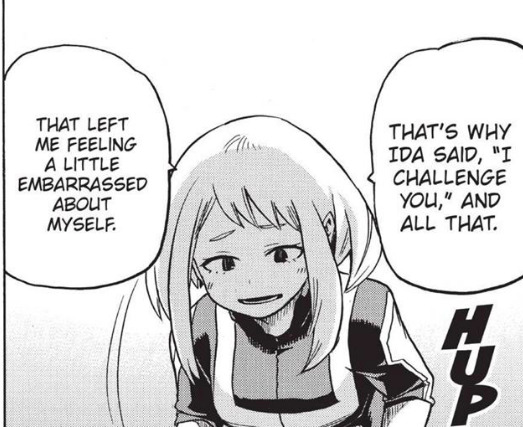
She feels she messed up, and took someone else down with her, and as such has to make things better. Thankfully, Deku pulled through on his own. This is one of many sweet scenes where Uraraka offers Deku a great deal of love and support. But sadly, it’s a very lopsided bond in that regard. Outside of this moment, Deku never does anything crazy to protect Uraraka again, and rarely shows her the same kind of support. Not because he doesn’t want to, per se, but because she won’t let him (if you want the full details on that imbalance, skip to the Sports Fest arc section).
Quirk Apprehension Test Arc:
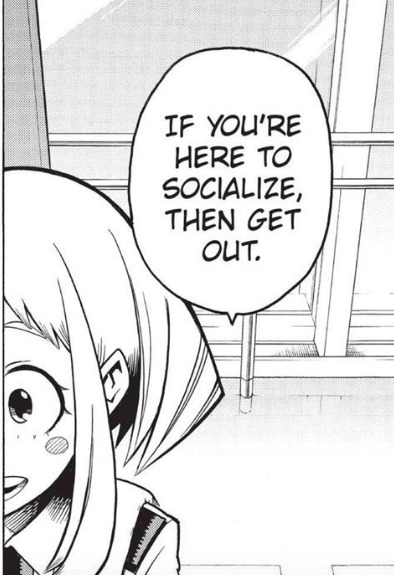
Uraraka’s POV: We continue the pattern of Uraraka’s crush on Deku being something she’s told to drop here, with Aizawa telling her if she’s “just here to make friends” she can go home (take a shot).

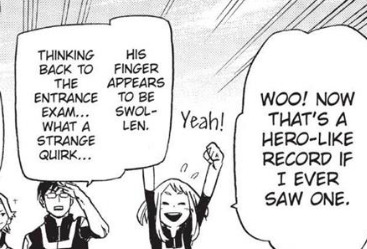
She’s happy to see Deku and supportive of him when he does OK, worried for him when he’s hurt, and in general a good friend. At this point in the series, we’re not privy to her inner thoughts, so there’s not as much to say about her feelings here. The only thing of note is the other general pattern of their relationship, wherein Uraraka gets to be supportive of and worried for Deku, but not him for her. Her revising of the name Deku is more important from his POV.
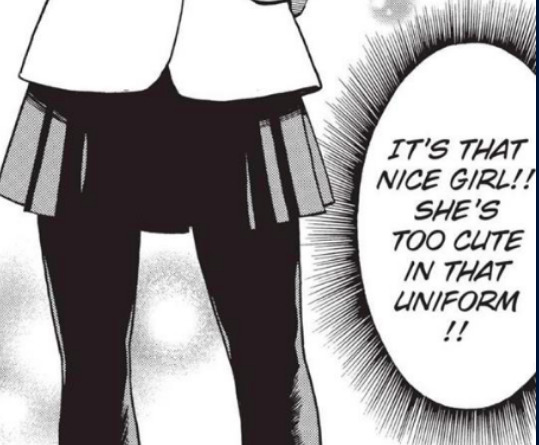
Deku’s POV: Deku shows continuing attraction to Uraraka here, thinking that she “looks good in her uniform” and blushing around her. However, he quickly moves on to overcoming the Quirk App Test and doesn’t think about her much throughout the rest of the arc.
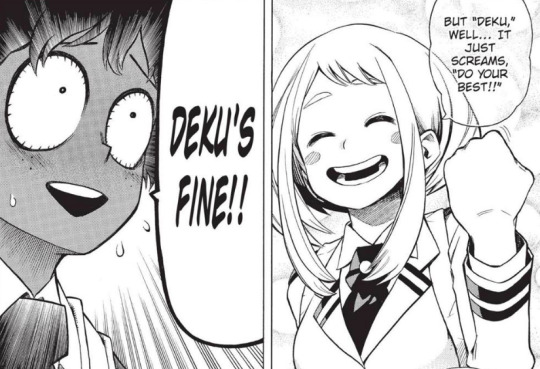
She comes up to him later and calls him ‘Deku’, like Bakugo did, and reframes the nickname as a positive thing. The setup seems clear: Ochaco is to be the friend to Deku that Bakugo never was, the kind and supportive ally he lacked back in middle school. This scene makes me smile.

Which would be fine if that’s what they went with, but…
Battle Trial Arc:

This arc starts out so well for Izu/Ocha, then goes down hill fast.
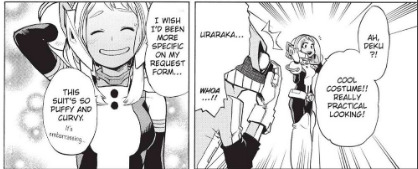
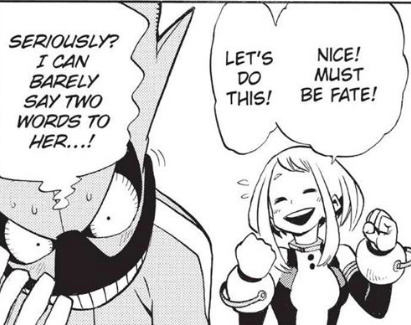
Deku on Ochaco here: Deku thinks she looks good in her uniform, blushing around her, and expressing a desire to impress her when they’re put on the same team.
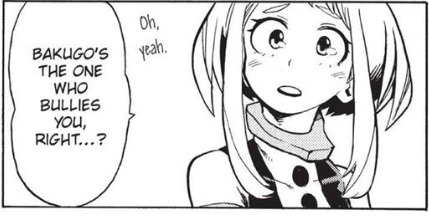

They’re up against Bakugo, and he’s nervous. When Ochaco asks, he starts talking about how Greatamazingawesomesuperspecialwhatever Bakugo is and how he wants to beat him.

He then apologizes to Ochaco for getting her caught up in his problems, indicating that he doesn’t see her as being part of them. Even though Ochaco proclaims them to be a team, he doesn’t do much strategizing with her ahead of time. He gets very caught up in his match with Bakugo, and doesn’t bother working with her until Bakugo has him cornered and nearly drops him with the MegaBlast. Then, he calls her and comes up with a plan - but imagine if he’d actually worked together with Ochaco to beat Bakugo.

If he’d guessed, as he says, that Bakugo was planning to “come at him first”, then why not get Uraraka to grab Bakugo while he’s distracted and zero G him out of the building?
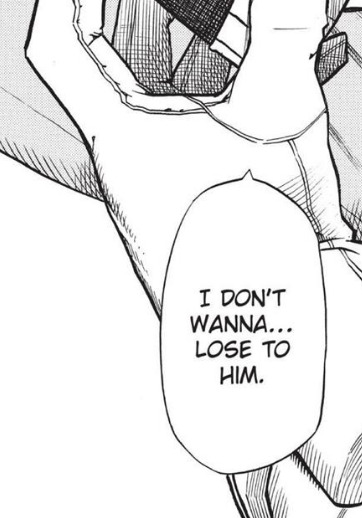
Because Deku wants to beat Bakugo to prove himself, plain and simple. He’s known Bakugo longer, so it’s only natural he’s more interested in beating him than working with Uraraka. But this could have gone so much better for him if he took the time to work with Ochaco instead - if they’d tag-teamed Kacchan, Deku might not have had to break his arm.
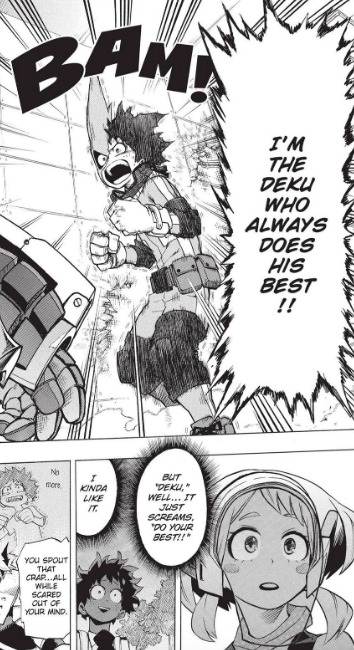
He does salvage this a little by taking the new version of his name Uraraka came up with. But then Deku spends the rest of the arc ignoring her instead of working with her.



There’s even an oddly placed panel sequence where she blows off a flirtatious Kaminari to worry about Deku, and he then blows her off to go chase after Bakugo and clear up their misunderstanding. It’s probably just a coincidence, but it’s still a weird parallel.

And speaking of this scene, let’s talk about a bigger concern with Izu/Ocha (from Deku’s angle) that I have. Deku has a secret identity. He has a past as a quirkless kid, a history of insecurity, and a secret chosen one destiny that burdens him greatly. He needs his future partner to be someone he can talk to about all this. If I were him, and I had to choose among the kids at UA who I’d tell my troublesome secret ID to, who I’d want to confide in, I’d probably say 1. Uraraka, 2. Iida, 3. Shoto, 4. Literally every single other character Deku is friends with and finally, bottom of the list, Bakugo. Yet Deku chooses to tell Bakugo his secret identity, not Uraraka or anyone nicer who would be presumably more trustworthy. Now, in hindsight (SPOILERS IF YOU’RE NOT CAUGHT UP YET), Deku doing this has paid off. Bakugo knows his secret and he’s kept it. He’s been a supportive friend to him since then, especially post JTA, everything a good secret keeper should be. But Deku - and especially the audience - didn’t know that at the time. (SPOILERS DONE).

And Deku can’t be with Uraraka if she doesn’t know his secret identity. That’s one of the Laws of Superhero Romance Comics. Spider-Man could never be with Gwen or Black Cat, for instance, because they hated his alter ego. He married MJ because she liked both. And Horikoshi is a big fan of Spidey, so he must know this. Deku has to tell Uraraka about OFA if he’s going to be with her. But he hasn’t, and he hasn’t shown any inclination to.
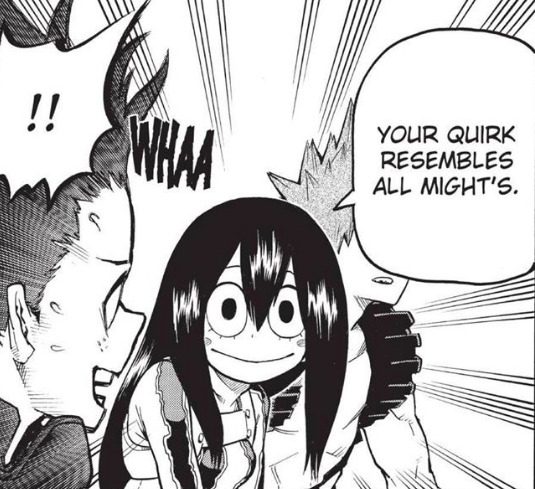

The setup is there for him to tell others; Todoroki asked about his powers, Tsuyu compared him to All Might. They could figure it out, they could tell Deku they know, or he could tell them, like he tried to tell Kota his personal stories, to make them feel better. There’s a mechanism in place for him to tell either one of them. But not Uraraka. She’s never asked about it, he’s got no interest in telling her. And as long as she doesn’t know the Secret, she can’t be with Deku. This isn’t, BTW, me making a manifesto for any of those ships over Izuocha. I don’t think for a second that any of those pairings will happen in the series. Only that if Deku is to be with Uraraka, he has to find a reason to tell her about OFA, or their relationship will be all kinds of messed up.
Also, FYI, Tsu, Todoroki, Bakugo, and even Iida have looked at and noticed enough about Deku to guess at least this, the most fundamentally important thing to know about Deku: That he’s close to All Might and his powers are similar. But not Ochaco. Does she honestly know anything important about Deku? Like how he grew up quirkless for so long, how All Might inspired his dream, how he wants to live up to the expectations of others and save people with a smile? No, not yet. He’s never told her anything personal, outside of this one little anecdote in this arc about wanting to beat Bakugo.
Uraraka’s POV:
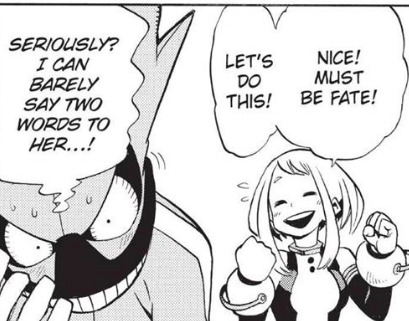
Uraraka is happy to be working with Deku, but initially not all that excited about winning the fight. She just wants to relax, and is surprised to see how stressed he is.

Then Deku talks about how he wants to beat Bakugo, and she becomes more proactive. Nonetheless, she still basically just follows his lead this arc.
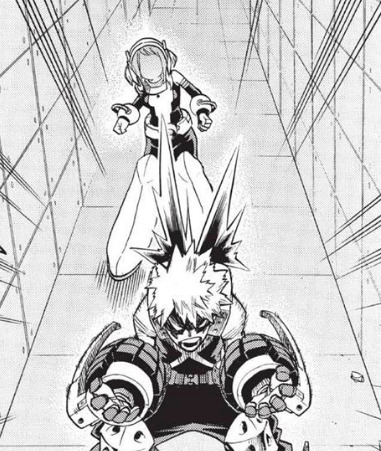
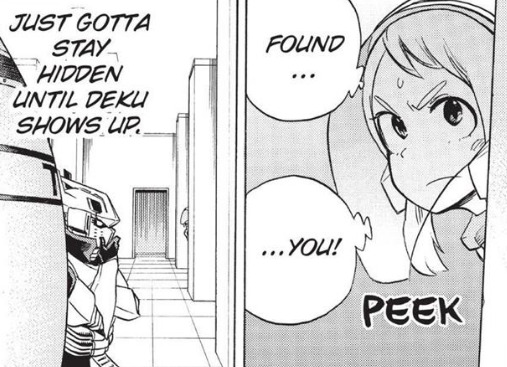

She takes no initiative on her own: She doesn’t go to grab Bakugo when he’s attacking Deku, she stands around giggling on the phone while trying to sneak up on Iida, and Momo criticizes her for it.
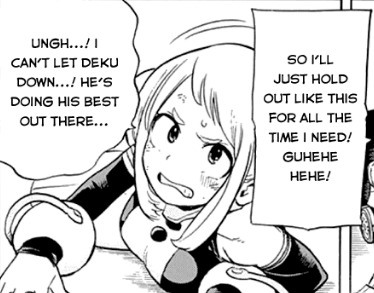
She thinks to herself about Deku wanting to win when Iida outfoxes her. She doesn’t seem like she wants to win the Trial for her own sake, just Deku’s. And this is a problem for Uraraka. (take a shot)
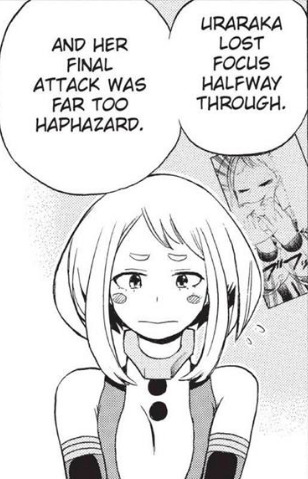
Momo criticizes everyone but Iida in this match, and all three characters who messed up did so because they were too fixated on someone else. Deku on beating Bakugo. Bakugo on beating Deku. Uraraka on impressing Deku. Iida, for instance, also admires Midoriya - but he’s able to concentrate on the match and fight Uraraka anyway. That’s why he’s MVP, as Momo and All Might put it.
So we set up Uraraka’s over-fixation on Deku as being a problem she has to overcome, a flaw - like Bakugo’s obsession with beating Deku, Iida’s obsession with killing Stain, Todoroki’s obsession with hurting his father, or Momo’s feelings of inadequacy next to Shoto, it’s framed like a flaw she has to overcome to do better. Of the dynamics here, only Deku’s admiration of/determination to beat Bakugo is not framed as a flaw per se, since he still has it to this day and seems to benefit from it. I’ll elaborate on why I think that is later on in the essay - it has to do with the “Imitation is the Sincerest Form of Tragedy” theme - but overall, this doesn’t paint a good picture of Ochaco’s feelings for Midoriya. They’re framed as something she has to put away in order to do well. (take a shot)
Class Rep mini-arc:

This is another score for Izu/Ocha. Ochaco voted for Deku as class Rep. She never tells him about it, though. I’m not sure why. Iida told him. Todoroki tells Momo later on that he voted for her. Ochaco could be gearing up for telling Deku herself, dramatically, later on, but what would that prove?

Deku already knows she admires him, he turned down the class rep role later anyway. This isn’t like Momo and Shoto, where Momo stayed Deputy Rep and never heard a compliment from Todoroki before he told her he voted for her. In that case, the Class Rep thing showed Momo Shoto believed in her, helping her get her confidence back. But Deku already knows Ochaco believes in him. Iida telling him also helped him out - it showed him he had friends who believed in him. Ochaco’s given reason for keeping her vote to herself is Bakugo’s little temper tantrum about it. But Bakugo wasn’t at the table when Iida told Deku the truth, so why couldn’t she have told Deku then? I really don’t get why she keeps her vote to herself; I don’t see how this will do anything for Deku later on down the line, or for Uraraka. It shows she’s supportive of him and admires him, but we already knew that. I’m just not sure how to parlay this into future developments with them.
USJ Arc

Deku and Ochaco don’t talk to each other at all during this arc. They get separated quickly and don’t reunite. They don’t worry about each others’ safety during the battle. After it’s over Ochaco asks after Deku because he broke his limbs, but during the fight she doesn’t worry about him or look for him. There’s only one moment I find noteworthy for Izu/Ocha during this arc: Deku wondering “What would Kacchan do” before jumping off the boat. This type of remark, like Iida’s “What would by brother or Midoriya do” during the class rep arc, is about a platonic friend (well, rival in this case), not a love interest. So Uraraka’s “what would Deku do” being code for “I like him” doesn’t really add up. I’ll get to that later.
Sports Festival Arc

Deku’s POV: Deku asks Uraraka about her motivation at the beginning of this arc, in Chapter 22. Uraraka admits that it’s for the money, and while Deku mentally thinks that this is admirable, he doesn’t say anything complimentary out loud, or anything other than “it’s surprising”. Contrasted with Iida’s loud, uproarious applause of Ochaco’s motive, this doesn’t come across as all that supportive of his friend, even though he does not, in fact, think the less of her for it.
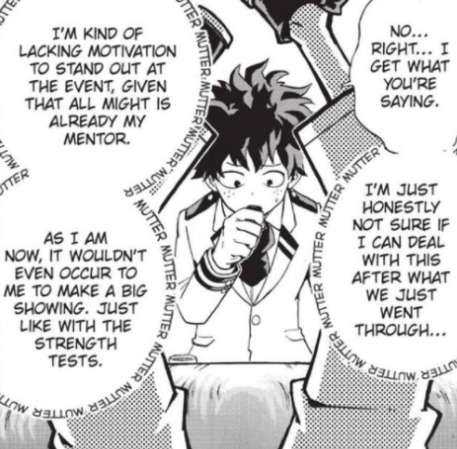
On top of that, Deku at this point in the arc is struggling to get motivated himself. Later on he’ll call Todoroki out for not trying his best, and he’s clearly thinking of people like Uraraka, Shinso, Bakugo and Iida when he does so. But at this point, he does the same thing towards her that he calls Shoto out for.


He doesn’t get inspired by her words, or All Might’s, or anyone’s, until he overhears Bakugo make an offhand comment about ‘aiming for the top’. Then he gets into the competitive spirit. This kinda creates the impression that Deku is more inspired by his rivals than his love interest. Common issue in Shonen romances, of course; a higher emphasis on the importance of the hero’s main rivalry than his Official Girlfriend.
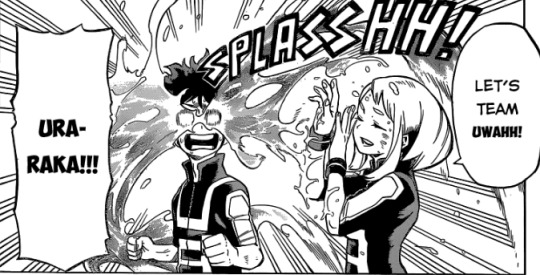
He’s overjoyed when she joins his team, but not because it’s Uraraka - because it’s anyone.

Deku is the person no one wants to team up with here. He would have teamed up with anyone who asked him. It seems odd, knowing Uraraka’s capabilities and quirk, that he didn’t just go up and ask her himself to join his team (Like he does with Iida, and then Tokoyami).
(Edit: I’ve recently rereaed this chapter and found I made a mistake: Deku does say he was planning on asking her. I was just reading a weird translation. Sorry for the mistake - good on Deku!)
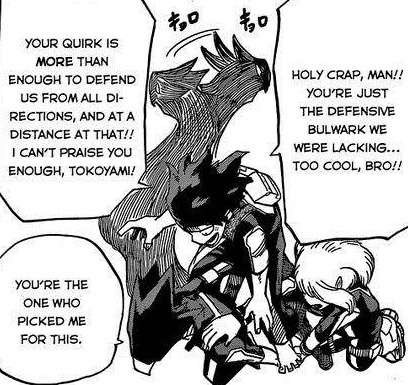

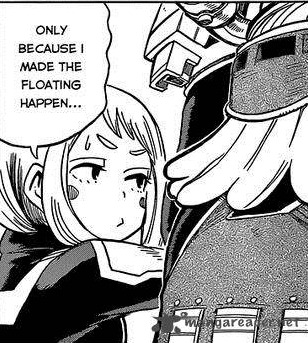
During the battle, while he mentally thinks that Uraraka is great, he doesn’t say anything out loud to her. He does, however, loudly compliment Hatsume and Tokoyami, in front of her. This hurts Uraraka’s feelings, but I’ll get to that in her section.

Deku gets busy with his rivals for a while until his first match is over. While watching the rest, he mentions to Uraraka that he wrote about her Zero Gravity in his notebook. But he doesn’t say “I think your Zero Gravity is cool too” or anything complimentary, just “I wrote about it” like everyone else’s.
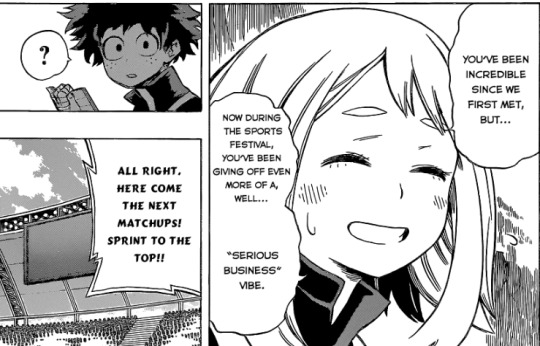


To Deku’s credit, he seems to realize that he hasn’t been very supportive to Uraraka. The anime cut this from the Manga, but the manga has a scene where Deku notices her leaving, and her pensive expression. This leads to him going to the prep room to offer her his strategy to beat Bakugo.
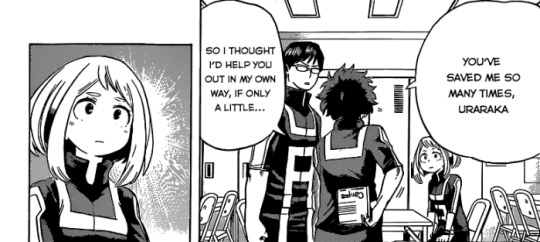

I think this is a big deal for Deku, because at the end of the day, this is his entire motivation. Helping people. Being there for others. Deku is a wonderful, supportive friend, used to feeling weak and inadequate and wanting to help others the way they helped him. He needs a partner he can support and compliment, someone he can help, someone who needs saving.
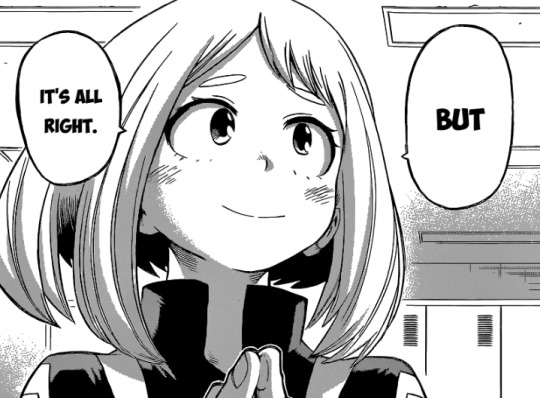
But Uraraka denies him this. He offers her his help and support, and she rejects him - for her own reasons, but this still leaves Deku feeling lesser.

“She’s the one supporting me,” he muses before his match with Todoroki. He wanted to be there for her. He wanted to help her break down the wall that is Bakugo - even if she didn’t use his strategy, she could have listened to his knowledge of Bakugo, who he’s known his whole life, to pick up some tips on his weaknesses.

But she doesn’t. She also refuses to let Deku be there for her when she loses. He can tell that her cheerfulness is just hiding her disappointment. But since she’s refusing to let him in, he can’t be the shoulder for her to cry on. He wanted to. He was willing to be that person for her - to be the friend she can talk to about her issues, to cheer her on when she fought and help her up when she’s feeling down.
But she rejected his support, just like everyone else does.
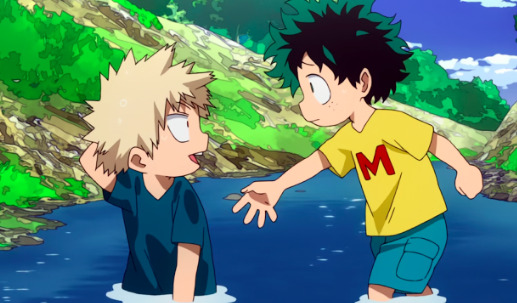
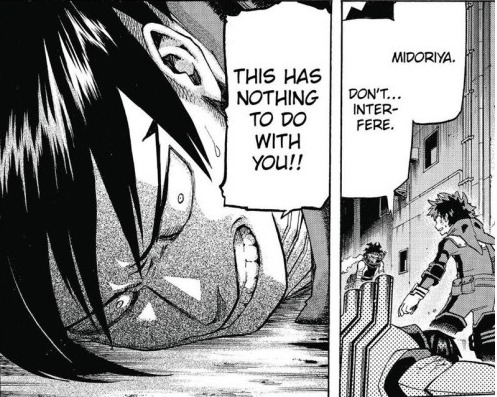

Bakugo rejected his helping hand as a kid. Iida rejected working with him earlier that same day, and rejects his support later on with his brother. Todoroki declares he ‘isn’t here to make friends’ and spends most of the sports Fest rejecting Deku’s attempts to help him (“You’re helping your opponent? Now which of us is screwing around”).

Deku clearly wants to be that friend. He wants to be there for the people in his life and offer his boundless love and emotional support for them. And I think he needs a partner in life who will let him be there for them. If Uraraka is to be that person, she has to let him in. She has to put aside her pride (yes, I think it is pride) and accept Deku supporting her, just as she supported him. She has to open up to him and cry in front of him. The others I mentioned have - Bakugo cried in front of Deku twice, Iida accepted his help during the Hero Killer arc, Todoroki accepts him in the very next episode. Three characters far crustier, prouder and more antagonistic towards Deku have all put aside their pride and let him help them with their issues. It’s Ochaco’s turn.


Speaking of: From Uraraka’s perspective. When Uraraka admits her motivation to Deku and Iida, she’s looking away, scratching her head, and apologizing. She says, in the dub “You two have such admirable motivations. I hope you don’t think less of me now.” Uraraka feels ashamed to admit her motivation to Deku and Iida.

When the obstacle race ends, she announces “I’m so jealous of you!” to Deku, after he comes in first. And I think she is - jealous of him.

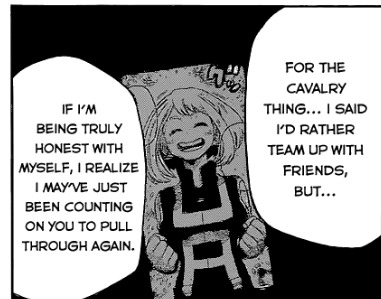
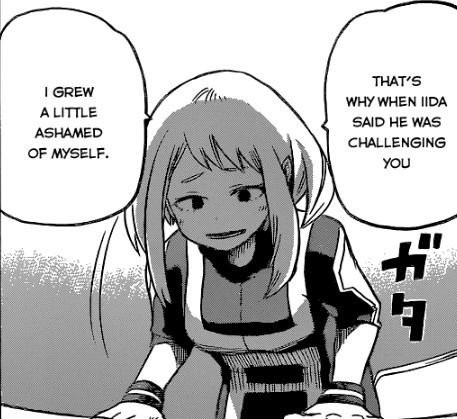
She teams up with Deku for the Cavalry Battle, and later admits that she “Might have been relying on (him) to get by”, meaning that she sees Deku as being better than her.

She gets very jealous of the attentions Deku gives Hatsume - as I noticed before, Deku compliments everyone but Ochaco. He even found the time to compliment Bakugo in front of her during the Battle Trial arc - but to her face, nothing. And this plays on Uraraka’s insecurities. Deep down, despite her cheerful demeanor, Uraraka isn’t very self-confident (at least, not yet). She doesn’t believe in herself, she doesn’t have faith in herself to succeed. She’s even more insecure than Deku, and often tries too hard to be “just like him” to her own self-detriment. Watching everyone else’s matches, she admits to being ashamed of herself. She realizes she needs to try and succeed on her own, not by relying on Midoriya. (take a shot)

But at the same time, her goal is still essentially to be “Just like Deku”. What’s the one thing Ochaco knows Deku wants to do, besides be a great hero? Beat Bakugo. No coincidence she was fighting him in this tournament. To be just like Deku, she has to beat his rival, who she’s seen him fight before. Uraraka wants to be good enough, she wants to beat Deku - in a way, her motive and behavior here is not that different from Iida’s, Bakugo’s or Todoroki’s. Deku makes her insecure, so she tries to do better than him.

She declares herself a rival to him. She refuses his help - seriously, a few pointers on how to beat Bakugo couldn’t hurt, she even thinks about Deku’s earlier moves while fighting him anyway! - and tries to win it all by herself. And although her plan is great, it doesn’t work.
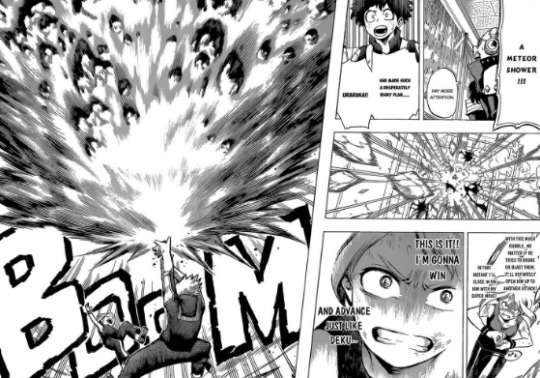
The minute she thinks “I’ll be just like Deku” is the moment she fails. The moment Bakugo blows up her debris and beats her.
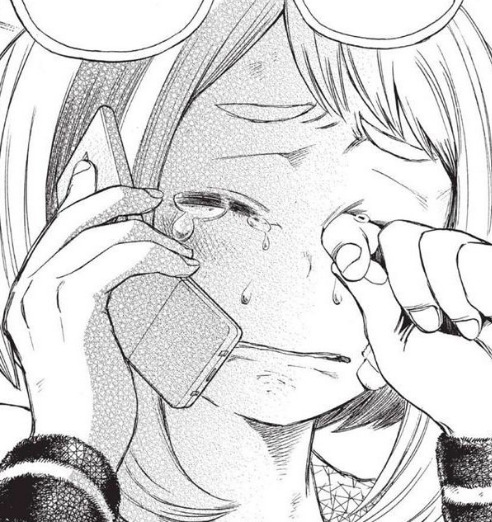
Uraraka is devastated by this. She was crying for so long and so hard that her eyes swelled shut. She could have really used a friend, someone to talk to about her family problems - someone outside of her family drama, a kind and understanding ally like Deku, who can commiserate with her and tell her things’ll be ok.

But she hides her feelings from Deku and pretends she’s fine. I think she doesn’t want to look weak in front of him - she wants him to think she’s cool, to compliment her like he compliments Hatsume and Bakugo, and she’s deeply insecure about appearing anything other than strong. So she shuts him out and cries on her own, with no supportive friend to help her. If she is to be with him, she needs to be able to let him into her life and her heart.
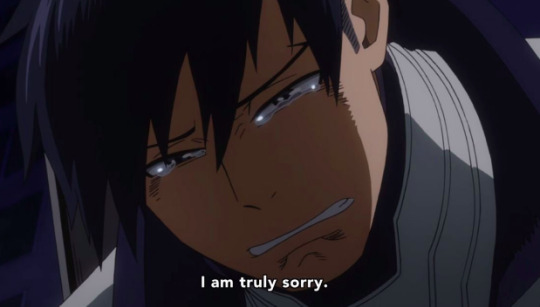
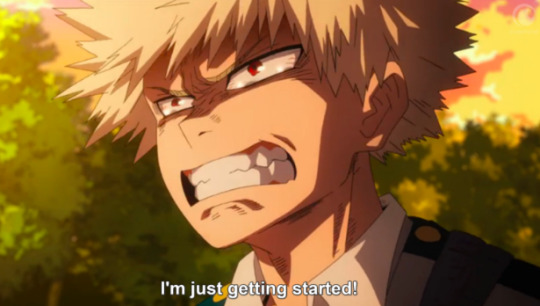


She has to cry in front of him, like all three of his other rivals have done despite their immense pride and far less amiable relationships with Deku. Even Tsu has cried in front of Deku and confessed her feelings (to him and the whole Rescue Squad), and she’s not as close to him as Uraraka or Iida. Why doesn’t Uraraka confide in Deku about her feelings? Again, I think the underlying problem is her hero-worship of him. She thinks he’s amazing, she won’t admit to his flaws (she sees him, one ep/chapter later, destroy his body and lose his match helping Todoroki; you’d think she’d cotton on to his lack of utter flawlessness then, but nope), and she’s still essentially insecure about herself. She needs to learn to believe in her own strengths and admit Deku’s weaknesses. Then she’ll be willing to cry in front of him and listen to his ideas.
But until then, she’s just like all of Deku’s other rivals: Too proud and too envious/afraid of him to accept his love or friendship.
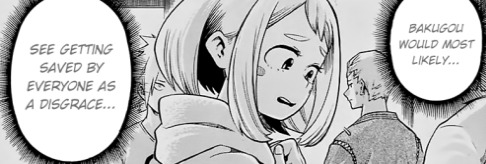

No wonder she was so easily able to spot why Bakugo is insecure about him and guess how he’d feel about being rescued; her complex about Deku is rapidly becoming just as debilitating as his is.
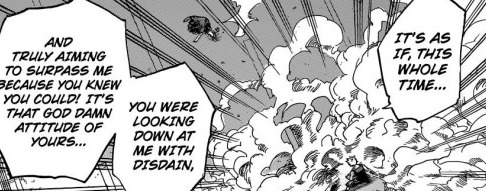

Difference being, Bakugo had his “Deku vs Kacchan 2” moment ,where he and Deku talk out their feelings and move on, recognizing that Deku isn’t looking down on him and never has been, etc. Ochaco needs that moment too (probably without the big fight scene, though).
Hero Killer Arc:
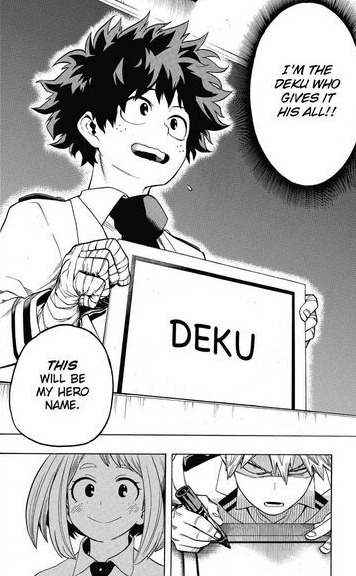
From Deku’s perspective, he chooses his hero name based on Ochaco’s advice. This is something we see with other characters too - Eraserhead and Mic, Mirio and Tamaki - who are friends, so it’s all good. It seems to have a nice spin: Ochaco taking Deku’s flaws, the traits Bakugo mocked, and turning them into a positive. Ochaco supporting Deku. Nice. She smiles about it.
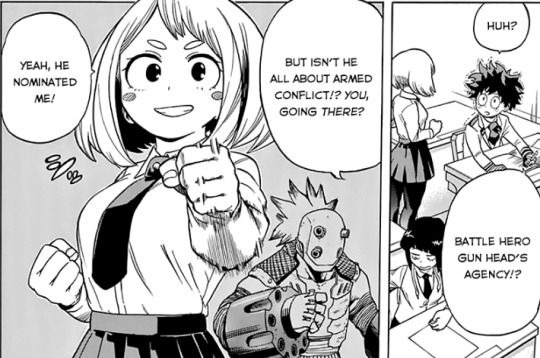
He seems surprised that she took an internship with Gunhead, confused that she’s more into action now (I guess he’ll have to revise his notebook!).
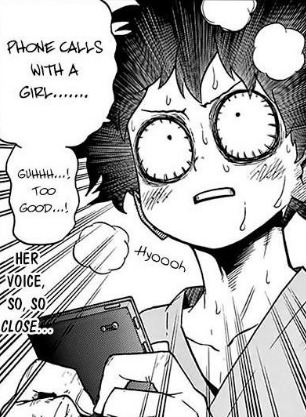
He talks to her on the phone after the Incident goes down, having texted all his friends for help and worried her. He again (for the last time) get’s excited over her in a sexual/romantic way, and once again it’s “I talked to A GIRL on the phone” instead of “I talked to Uraraka on the phone”. He’s attracted to her as a girl, but not excited about talking to the girl he has a crush on. Following this arc, Deku stops responding to Uraraka romantically, even when CamieRaka loses her clothes. I’ve got a theory about why he stops, I’ll discuss it next arc.
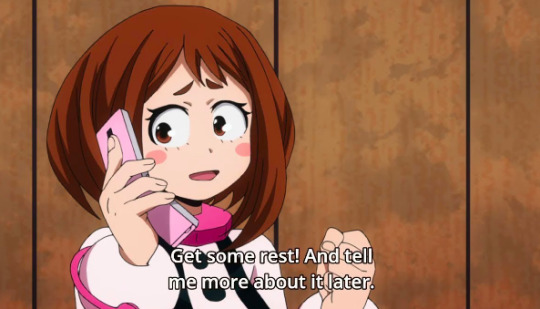
Uraraka, for her part, looks pleased when Deku takes her name. She interns with Gunhead because of her match with Bakugo, to get stronger, which is good for character development - I like that this isn’t because of Deku, because I don’t want her arc to revolve around him solely.

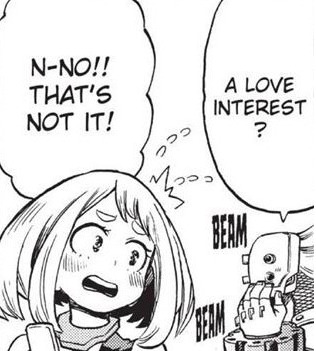
She calls him, concerned, after the Stain incident, and tells Gunhead that they’re “not like that” when he teases her about it being a boy. This is the first of many people telling Uraraka that she has something going on with Deku, rather than Uraraka figuring it out herself. Uraraka’s denial is not really defensive or Edward Elric Style “She is NOT my girlfriend” levels, so honestly at this point I believe her. Up until this arc, she doesn’t see her feelings for Deku as romantic. She sees him as a friend who she admires and is often jealous of.
Final Exams:

This is where things get weird. So far, Izu/Ocha has been pretty nicely built up - but then the series decided to go for it in a way that I personally find rather strange and confusing.
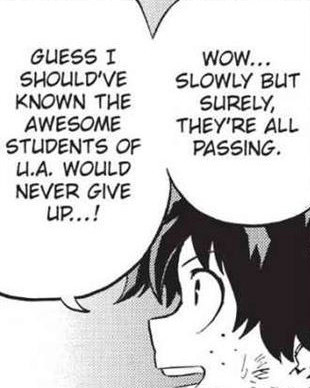
So first, let’s take this arc from Deku’s POV. The scenes of Izu/Ocha watching the fights are Anime Only, so we’ll skip those. In the Manga they all take place at the same time. After Deku and Kacchan v All Might, Deku goes to watch the other battles, including Uraraka’s. He doesn’t have any onscreen reaction to Ochaco’s fight, even though we get to hear him mentally exclaiming about how awesome Iida is, or Tsuyu is. Ochaco’s his friend too, why can’t he spare a moment to fanboy over her martial arts skills?


Anyway, later on they’re left alone at the mall, though not by choice. Deku starts making small talk and Uraraka runs away from him, saying “Have to keep the pests away” or something like that. Deku asks “I’m a bug?/“You mean me?”. So from Deku’s POV, Ochaco flat out called him a pest right here. To him, it must have sounded like she was rejecting him, rejecting the idea of hanging out with him one-on-one (which in the Manga they haven’t done before).
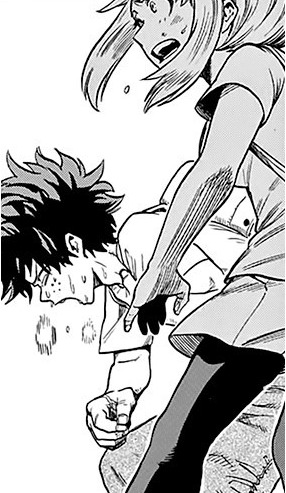
He’s immediately attacked by Shigaraki; when she returns he does his best to prevent her from getting hurt. Nothing really advances, from Deku’s POV, in their dynamic at this point. The only real notable thing is the “I’m a pest” line. Since Deku never reacts romantically to Ochaco after this, I’m assuming that he thinks she’s not interested in him that way. That right here, she shut down the idea of dating him, and he just accepts it.
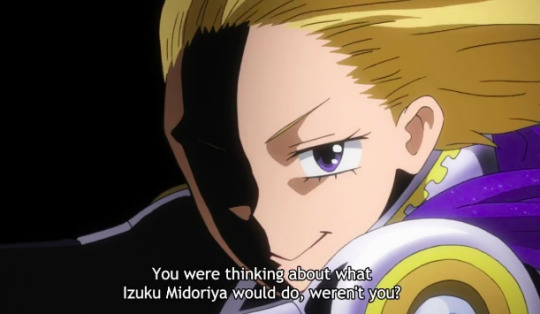
Of course, it’s Ochaco’s POV that’s important here. As she’s about to get sucked up by 13, she’s thinking “What would Deku do?”

Now, we’ve heard these lines in a non-romantic context before. Iida wondered what Deku or Tensei would do when he helped disperse the crowd. Deku wondered what Kacchan would do during the USJ arc. He wondered what a “hero” would do when he saved Bakugo from the sludge monster. This sentiment is not exclusive to romance in the show.
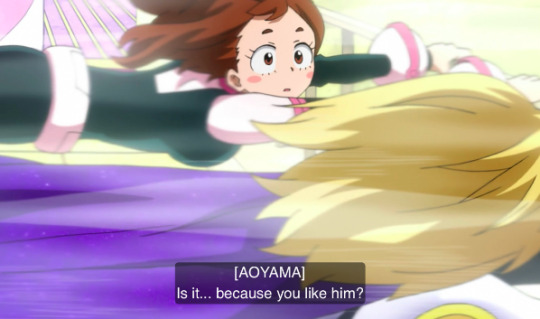
But Aoyama then chooses this moment to ask Ochaco if she ‘likes him’. This is completely out of nowhere. Aoyama is later revealed to have a bit of a friendship-crush on Deku, but why is he asking this of Uraraka, in this situation? It’s not like her girlfriends later on teasing her about liking Deku, it’s a guy she doesn’t know who doesn’t know Deku very well either, all of a sudden asking her if she has feelings for him. I don’t, for the life of me, understand what his purpose was in doing this. How does this help them win? Why is he painted half-in-shadow when he says this? It feels like it happens because we need Ochaco to realize she likes Deku, because the audience needs to be shocked, not because it makes sense for the characters. Which is so strange, because it’s one of the only times that ever happens in HeroAca. For the most part, the characters always act in ways that make sense, no matter how extreme they are.
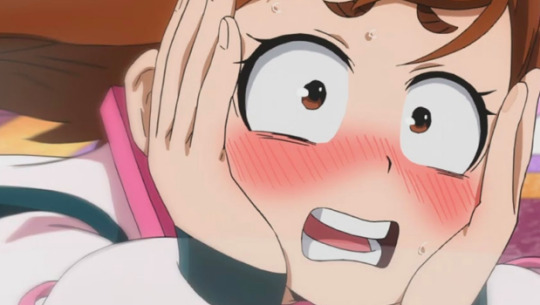
Uraraka freaks out, and thinking about liking Deku nearly gets her killed fighting 13 (take a shot). It isn’t until she re-focuses, on something she attained free of Deku’s influence, that she gets to win. Trying too hard to be like Deku, for Uraraka, leads to nothing good.
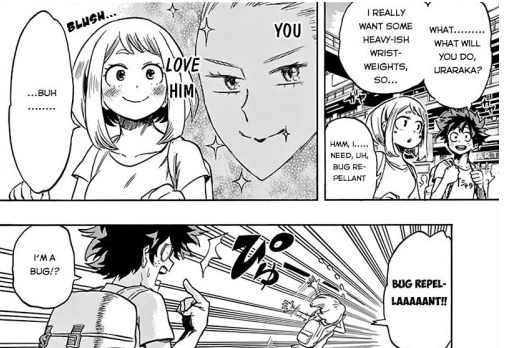
Then, at the mall, she runs away from him. She refuses to spend time with him - which seems strange if she’s meant to fall in love with him. If she wants to be with him, why doesn’t she want to, you know, be with him? Well, because she does’t want to be with him. If she did, she could easily ask him out (they are friends, after all), spend time with him, see if there’s something there. But she doesn’t.
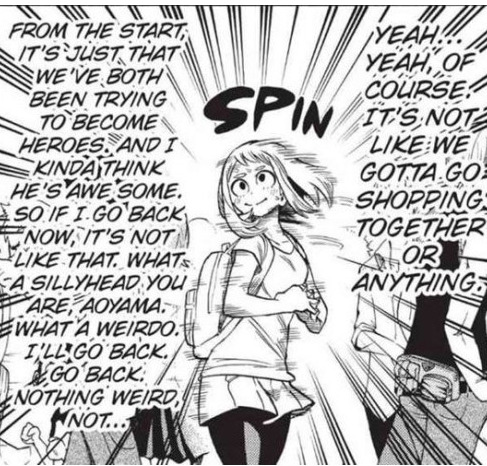
She runs off, almost horrified at the mere thought of having a crush on Deku. Of having a perfectly harmless, cute crush on one of her best friends. That just seems strange to me. Yes, love can be intimidating, but this is so extreme.
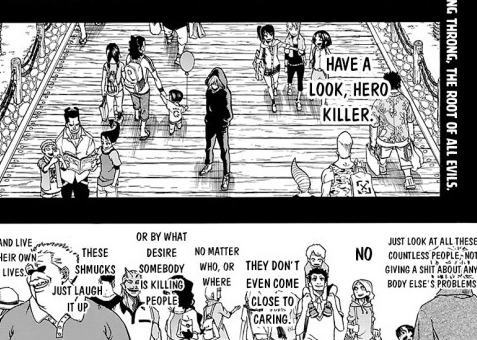

Another odd thing about this sequence is that it’s juxtaposed with Shigaraki holding Deku hostage. We flip back and forth between the Big Bad nearly killing the Hero, and the Romantic Subplot.

Imagine if that scene in Fullmetal Alchemist where Winry realizes she loves Ed was crosscut with scenes of Ed fighting Gluttony or something, and you get the idea. It’s a tonal mishmash. Unless - unless you theorize that the idea of liking Deku is as terrifying to Uraraka as being nearly murdered by Shigaraki is for Deku. But if that’s the case, I don’t want her to be with him! I don’t want her to be in a relationship that scares her that much. (I also don’t get why it would scare her that much - like, girl, Deku’s a sweetheart, what do you have to be afraid of?). The series could salvage this, but it already kinda tainted their romance in my eyes - and to many readers as well, since it seemed like such an odd way to introduce the love story into the occasion. Instead of a joyous moment of romance, this is what we got.
Training Camp Arc:
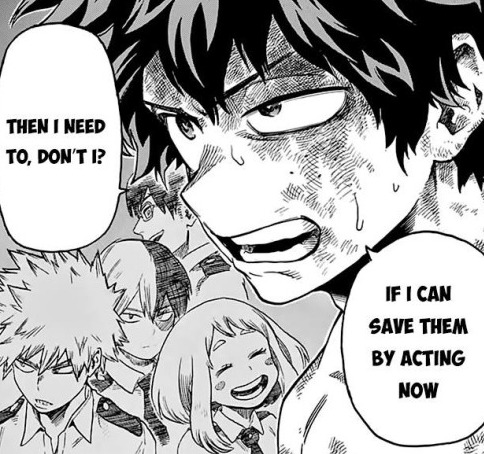
There isn’t a lot in this arc between Izu and Ocha. Izuku includes her in his list of classmates he’s worried about, popping up in the anime second after Bakugo (who is immediately in danger because of kidnapping) and along side Todoroki.

He works with her and Tsu to save Bakugo - or at least try. Other than that, there’s nothing (the scene of them blushing is only in the anime).
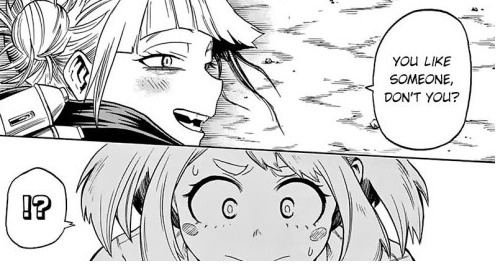
On Ochaco’s side, nothing happens until she fights Toga. Toga starts interrogating her about her crush on Deku, in her Hannibal Lecture style - villain getting into the hero’s head and provoking them with their insecurities. Himiko Toga is Uraraka’s villainous foil - her counterpart, the evil version of her.

Both do develop a crush on Deku, which is very disturbing if Deku and Ochaco are meant to be a couple, as well as her adoration of Stain. It’s not like Toga is going to marry Stain or whatever; so the comparison of their two brands of love is odd (at least, if Izuocha is meant to be endgame).

Toga’s words are right on the money: Uraraka admires Deku and wants to be just like him, but to be just like someone you have to do as Toga does - kill and replace. This gets to Uraraka, because it’s true. Her crush on Deku then, is not being framed as genuine love, but as a similar obsession to Himiko Toga’s - a desire to be just like someone she admires, rather than be together with a good friend she adores. Which is frustrating, because the latter is the kind of relationship I want from Izuocha, not the former. I don’t want Ochaco to get with Deku because she hero-worships him and thinks he’s amazing - I want her to get with him because they’re good friends and she loves him. But that’s not what the series is doing with them, and with the parallels to Toga, it’s starting to really creep me out.
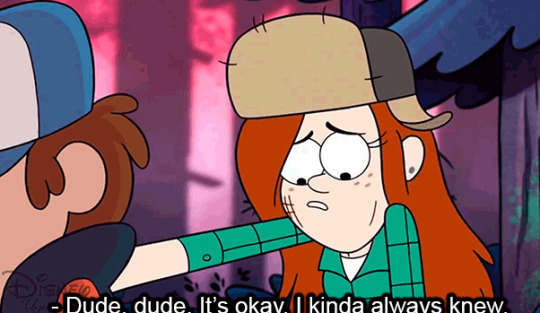
One route they could take with all this foreshadowing, of course, is perhaps one similar to what happened in Gravity Falls, with Dipper and Wendy. In that series, Dipper like Ochaco has an evil villainous counterpart Yandere - Gideon Gleeful. Toga and Gideon both stalk and harass their crush, who clearly says no and means no. Dipper and Ochaco both harbor a crush on someone who’s a close friend, but who seems to be for whatever reason romantically unavailable to them. (Wendy is older, Deku is…I’m not sure why, Ochaco just won’t ask him, it’s frustrating). Dipper eventually reveals his crush on Wendy, who lets him down easy and stays good friends with him. Dipper later uses that understanding of himself, and of Gideon’s obsession, to tell Gideon he can’t make someone like him. This helps Gideon reform. The whole thing is beautifully healthy and positive.

So if that’s where we’re going with this - an ending where everyone’s just friends, and Ochaco’s crush on Deku is being used to develop her character a bit regardless of romance, then this would make sense. If not then I don’t get it.
Hideout Raid Arc:
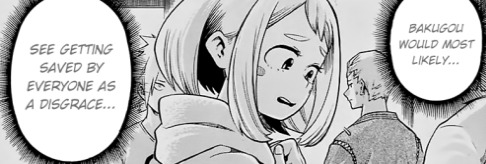
There are two interactions between Ochaco and Deku (indirect ones) during the Hideout Raid Arc. One is Kirishima relaying Uraraka’s worries about saving Bakugo, the other is Uraraka getting the Rescue Squad to apologize to Tsuyu. Both of them are really bad warning signs for their future relationship.


The simple reason is: Uraraka thinks Deku and co did the wrong thing, Deku thinks he did the right thing. Deku has never apologized for or expressed any regret for breaking the rules to save Bakugo. Uraraka, however, objected to them doing this. This is very interesting for both of their relationships with Bakugo, and their thoughts on heroism. But let’s talk about why this is a problem for Izuocha. Uraraka didn’t agree with Deku’s decision here. She has her own reasons for it - “Bakugo wouldn’t want to be rescued” -but she doesn’t bring them up in front of Deku. The thing is, Deku was on the fence about going. If Uraraka had brought up her objection, I think Deku might have actually listened to her. It’s the best objection to persuade him, because it takes Bakugo’s needs into consideration. But Uraraka didn’t bring it up to him. She didn’t say anything to Deku. From Uraraka’s POV, that’s a problem for her relationship with him, because it means she doesn’t want to say something that will upset him. She’s never had a serious argument with him, never objected out loud to his choices, even when she disagrees with them, and never had an argument with him where they came to a compromise or understanding about an important issue. Instead, she brings up her objection out of Deku’s hearing, and he hears about it secondhand. Uraraka doesn’t want to upset Deku, even about something important to her.
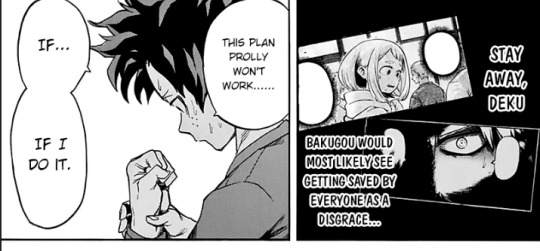
From Deku’s perspective, even though he knows Uraraka, his love interest, disagrees with what he’s doing, he does it anyway. He doesn’t care. He keeps Uraraka’s objection in mind, but only as it pertains to saving Bakugo. He never thinks about how Uraraka will feel about him going against her wishes, never considers her at all. He does consider his mother’s objections, even Tsuyu’s. But Uraraka’s objection, ultimately, only affects him insofar as it means he thinks of Bakugo’s feelings when saving him. And he never apologizes for doing so.

Later on, when Uraraka gathers everyone together to apologize to Tsu, Deku is the only one of the five who never actually says sorry (going by the anime here, since the manga is ambiguous about who’s speaking). Uraraka’s speech makes it clear that she didn’t agree with their choice and thinks they screwed up, but just wants to forgive them and go back to normal. But Deku doesn’t apologize for what he did. Iida, Kirishima, Momo, Todoroki - all people Uraraka is less intimate with than Deku - all apologize to Tsuyu, as Ochaco asks. But not Deku. Because Deku doesn’t agree with her. He doesn’t think he was wrong.
The question of whether or not to go charging in, even against the rules, to save someone, is a big one hanging over the heads of all these characters. It’s Captain America Civil War style big. Something that could split people apart permanently if they can’t agree about it. And not only do Deku and Ochaco not agree on this issue, they haven’t had any conversation about it with each other. They need to be able to discuss this and find common ground before they become a couple.
License Exam Arc:
This one is obviously important for Izu/Ocha. It ends with Ochaco deciding to ‘put her feelings away’.
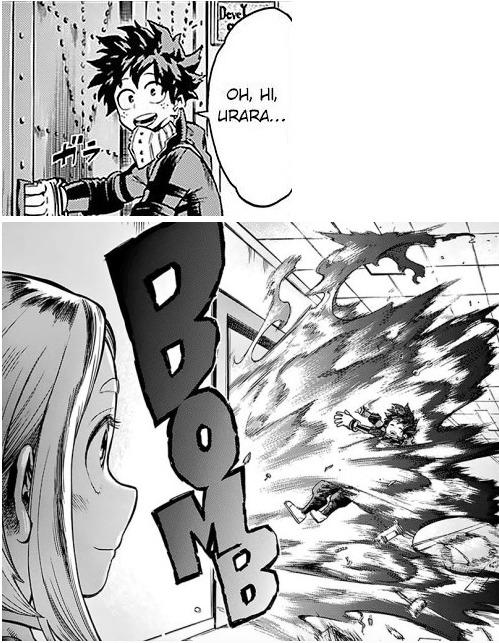
So let’s start with this Arc from Deku’s POV on Ochaco: He talks to her casually at the beginning before Hatsume explodes out of the shop, but focuses entirely on crafting his ultimate move from there on out.
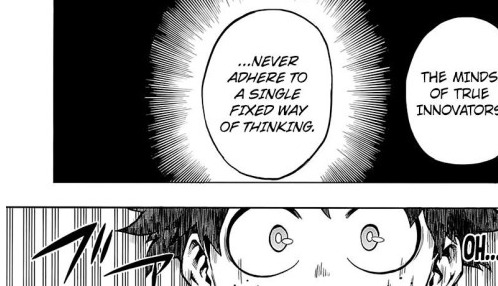
We don’t see Uraraka inspiring his move, that’s Hatsume and Iida, or his realization that he’s imitating All Might (that’s All Might himself).
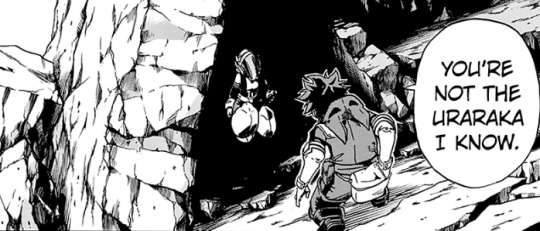
Deku does, however, recognize TogaChaco as not being Ochaco, showing that he knows her well.

He rescues TogaChaco because she’s a person in danger, thinking about his inability to rescue Bakugo from the villains and his general motivation, not how much he cares for Ochaco.
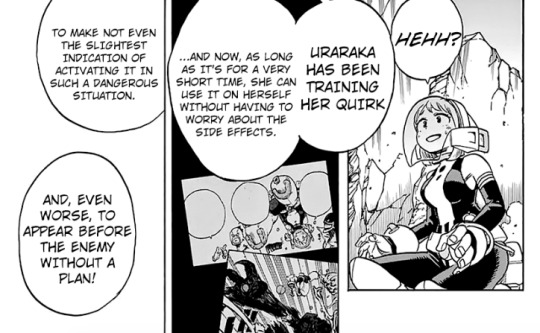
He knows Ochaco well enough to tell the difference, but this is Deku we’re talking about - he’s very attentive to details about others. I fully believe he would be able to tell a TogaIida from the real one, or Todoroki, Bakugo, Tsuyu, Hatsume, All Might…the list goes on, but there are very few characters who Deku doesn’t take detailed notes on or amass details about, and therefore couldn’t recognize the difference. What I’m saying is that Deku would do the same for any friend; he doesn’t distinguish Ochaco here.

He works with her and Sero to win the day, and spends the rest of the arc focused on his goals, with no thoughts to spare for Ochaco, and no interest in the cute girl pursuing him (Camie) outside of her quirk for studying. It comes across like Deku has put away any interest in romance in the name of pursuing his goals. He doesn’t distinguish Uraraka at all, as anything more than just another one of his friends.

From Ochaco’s POV, she becomes jealous of Hatsume once more - but fails to notice, for instance, that Hatsume’s behavior is making Deku uncomfortable. She’s jealous of Hatsume for being more confident, driven, and demonstrative than she is, but if she was paying closer attention to Midoriya, she’d probably notice that he’s freaked out by Hatsume feeling him up; there’s no real reason for her to be jealous of Mei in regards to Deku, because Deku isn’t any closer to Mei than he is to her. But Ochaco, here and many other places, doesn’t really take the time to observe and notice Midoriya, outside of a surface level. That’s why she hero-worship’s him so badly.
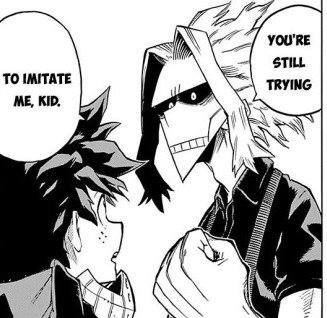
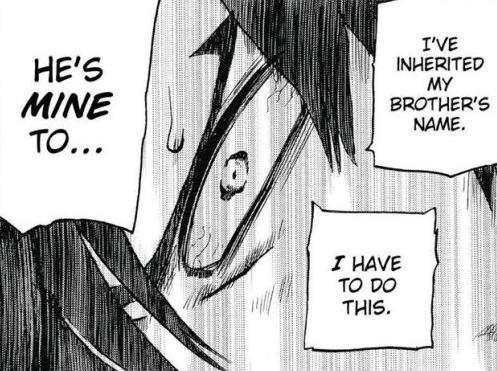


I’d recommend any HeroAca fan to check out this fascinating fan essay, “Imitation is the Sincerest Form of Tragedey”, (link: https://www.reddit.com/r/BokuNoHeroAcademia/comments/5n21a9/imitation_is_the_sincerest_form_of_tragedy_a_boku/ ) to get a good understanding of what’s going on with Ochaco in relation to Deku, without ship bias getting in the way. It’s an excellent read, touching on many characters and plot points. The key takeaway about Uraraka is that she has a pattern of imitating Deku, and screwing up because of it, without getting that narrative punishment that will act as a kick in the pants to motivate her to stop hero-worshipping him.
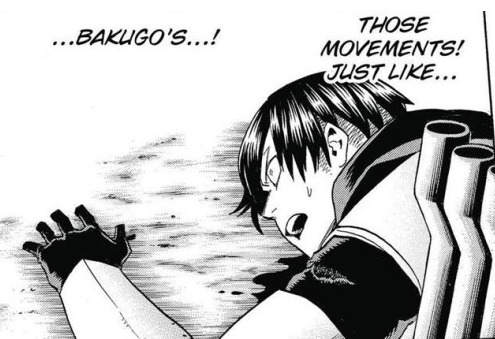
I think that, since we do see Deku imitating Bakugo and Gran Torino’s moves for Full Cowl with no problem, and other smaller instances, the secret is not that you can never admire someone and strive to learn from them - but rather that you can imitate someone, as long as you don’t hero-worship them. Ochaco’s issue, along with Deku’s, Shoto’s, Iida’s, etc, is that she sees the person she wants to be like as perfect and refuses to acknowledge their flaws. Ochaco admires Deku and wants to be like him - even though she’s seen first hand how Deku’s brand of heroism lands him in the hospital more often than not, how Deku can be overly analytical, deeply insecure and makes mistakes like anyone else - but we don’t see her acknowledge this. She thinks Deku’s amazing, perfect, like he admires All Might, Iida Tensei, Shoto his mom, etc. The reason Deku is able to imitate Kacchan and Gran Torino’s moves without being harmed, like every other imitator, is because he thinks Gran Torino is kind of weird, but skilled, and Kacchan is a jerk, but awesome. He can admire their strengths, and acknowledge their flaws. Therefore, he can imitate their moves without striving to be Just Like Them. Uraraka needs to recognize Deku���s flaws, if she wants to imitate his strengths without feeling bad about herself.

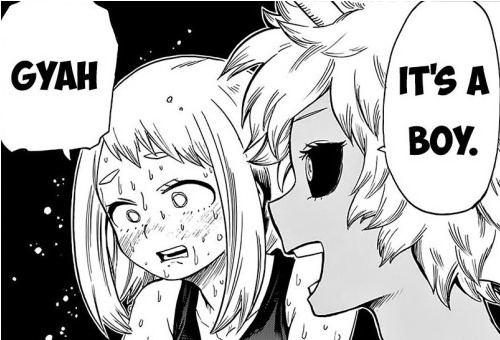
Once again Ochako’s feelings are brought up to her by someone else, and cause her a lot of distress. This time it’s Mina, who acknowledges that she wants to MAKE it be about love.

Just like with Gunhead and Aoyama telling Ochako her feelings for Deku are romantic in nature. Mina admits she’s trying to make a romance happen, rather than just letting one develop on it’s own. Her words cause Uraraka a lot of distress, and Momo and Tsuyu point out that this won’t help her (take a shot).
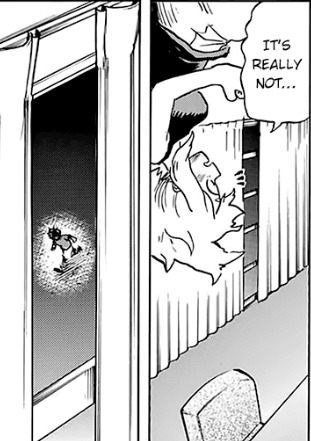

As she watches Deku from a distance, (the anime adds the Admiring All Might music track to this scene), her feelings for him are paralleled with Midoriya’s admiration of heroes, specifically Iida. Keeping in with the Imitation theme, Ochako’s feelings for Midoriya are once again paralleled with admiration of famous heroes people want to imitate, not romantic love. It’s Mina, Aoyama and Gunhead who are telling Ochako she likes Deku, not Ochako figuring it out for herself.

Uraraka once again gets jealous of a girl who Deku doesn’t want. Deku gives lots of signs that he’s creeped out by Camie’s attentions - when Kaminari and Mineta ask him about it, he says firmly that he found it creepy. If Uraraka was really paying attention to Deku’s feelings, she’d realize that he’s not interested in Camie.

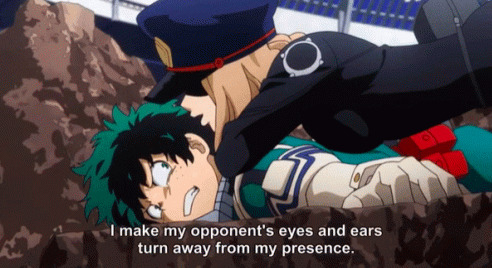

Imagine, for instance, this scene with the genders reversed. Our heroine is getting felt up and creeped on by a male villain. Her fellow superhero boyfriend arrives on the scene; the male villain leaves, speaking ominously about the connection between the two of them. Later on, other girls get jealous about the hot male villain waving at our heroine, and she makes it clear that she’s uncomfortable about it.

The boyfriend ignores her discomfort and gets jealous and possessive about her being around another man. Doesn’t something seem wrong here? It’s the setup we see from many ‘Nice guy’ narratives, but gender flipped. The guy seems to see the girl like a possession that belongs to him, angry that she’s daring to be touched by another boy, not that another guy is refusing to respect her space. Uraraka’s jealousy is not routed in love for Midoriya, but insecurity about herself. She feels less than, when she sees other girls around him, and doesn’t bother to observe whether she’s actually in danger of losing him to them.

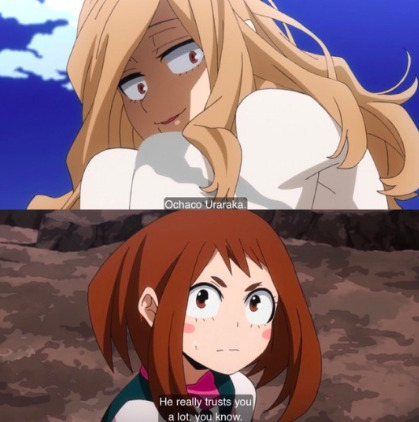
This scene is more than a little weird, since it seems like Camie is setting up her future to prey on the trust between the two to her own advantage. Again, Izuku and Ochako’s bond is being framed in a negative light.
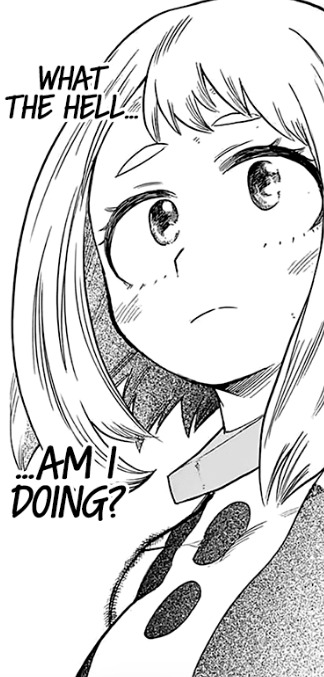
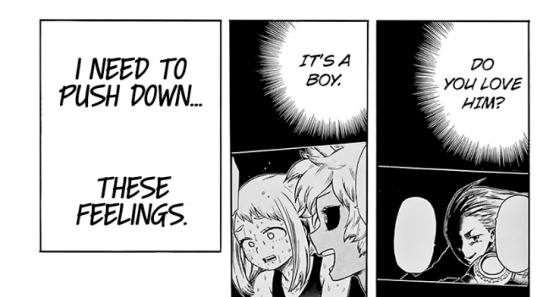

Uraraka decides, upon seeing Deku psych himself up to win, that she needs to put away her feelings for him. This is part of the pattern in Uraraka’s story. (take a shot) Focusing on Deku leads to her losing. Uraraka says here, that she doesn’t think she can have a relationship with Deku and be a hero. She puts her feelings away, because she feels they don’t help her. Unlike other duos in the series, other romantic parings from other narratives, Uraraka feels that her feelings for Deku don’t benefit her goals. If they’re to be a couple, then, Uraraka needs to feel like she can be a better hero by being with Deku, than by being away from him.
Internship, Culture Fest, Pro Hero arcs:
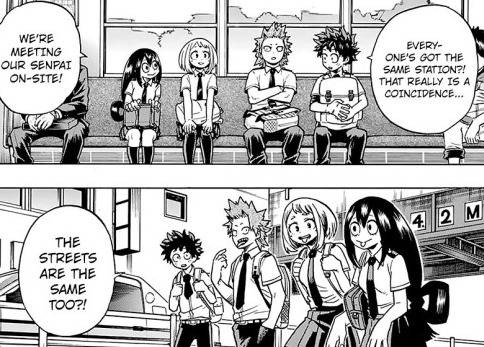
From the time Ochaco ‘puts her feelings away’, until recently in the JTA, Ochaco’s crush on Deku is not mentioned. The internship arc teams up Tsuyu and Uraraka with Deku and Kiri to save Eri. But instead of letting Deku and Ochaco fight and bond together over this shared experience - we’re given nothing. Deku doesn’t tell her anything about his issues with Mirio and Nighteye. Or even Eri. Ochaco doesn’t talk to Deku, outside of group scenes with exposition, about much of anything.


The ending of the arc has a good setup for an emotional bonding scene with Izu/Ocha - Ochaco was the one to rescue Nighteye, but he still died, and he’s Izuku’s mentor. We could have had a scene of them bonding over losing this guy, which Ochaco blames herself for and Deku blames himself for. Similar to like, Deku and Bakugo fighting over feeling responsible for All Might’s End, or Iida and Deku bonding over Stain. But, you know, more romantic in nature.

But nope, we get nothing. Ochaco angsts over Nighteye dying, and goes on this emotional journey without Deku’s input. She chooses to confide these feelings in Aizawa and Tsuyu, but not in Midoriya. Deku, at least, has the excuse of being unable to talk about OFA with other people, but Uraraka could have told him about her problems, and he an abbreviated version like he did with Kota about being quirkless. But instead, we get nothing. No bonding between our official couple at all.
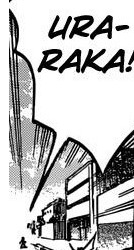
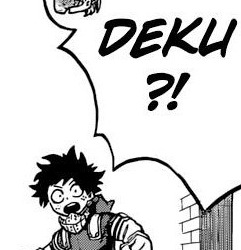
The other thing of note in the Internship arc is Toga!Deku. Toga impersonates Deku and decoys Team Ryukyu into the fight. If Toga’s intentions had been harmful, instead of getting revenge on Overhaul, this could have been really bad for the good guys, and for Ochaco in particular. She doesn’t realize that Toga! Deku is not the real Deku, even though Toga does give her a clear ‘tell’ - calling her ‘Uraraka’ and not ‘Uravity’. But unlike Deku, who realized Toga!Chaco wasn’t the real Ochaco, Ochaco can’t tell the difference.

If I were to read this as deliberate, it seems to be implying that Ochaco can’t tell the difference between her idea or image of Deku, and the real thing. But since they’re supposed to be a couple, it’s just plain weird. It’s a brief moment, but if Toga had been trying to hurt them, Ochaco’s feelings for Deku might have gotten her in trouble - again. (take a shot).
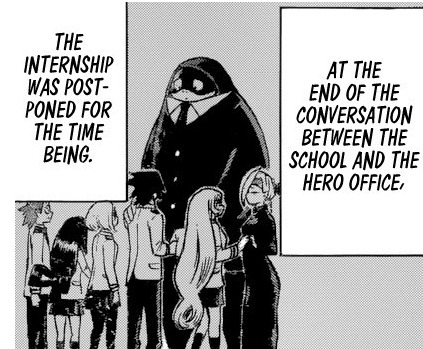
Then, from the end of the Internship arc to the Joint Training Arc, Deku and Ochaco don’t talk to each other at all. They go to Nighteye’s funeral with the internship kids - and no conversation about their respective issues with him at all.

They’re in the group hanging with Eri during the Culture Fest - but no one-on-one interaction at all. He hangs with Mirio, she with Tsu and Nejire. No interactions during the Pro-Hero arc.

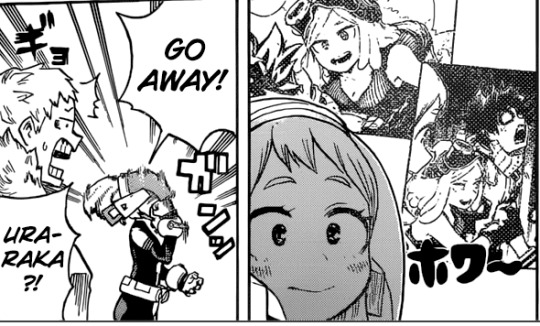
At the start of the JTA, one quick reminder that Ochaco is jealous of Mei still, which she punches herself to get rid of. That’s it.
Joint Training Arc: So Close Yet So Far

Reading this arc, I thought “Finally, we’re finally getting the ball rolling with putting these two together.” It’s such a familiar setup, so common to action romances, straight from the ATLA playbook: The hero’s powers go out of control, the love interest is the only one who can reach them, and with a cute hug they calm the hero down. When Ochaco grabbed on to the out of control Deku, I was expecting something like that in the next chapter: Ochaco saying something like “Come back to me” or “I know you’re in there somewhere” or “I’m with you to the end of the line” or something like that. Ochaco reaching Deku when no one else could, establishing her as his love interest and showcasing their romance.


But that didn’t happen. Ochaco grabs onto Deku, sure, but then she asks Shinso to snap him out of it. It’s Shinso who grabs Deku’s attention, Shinso who does the ‘important trigger phrase to snap hero out of superpower meltdown mode’ thing.
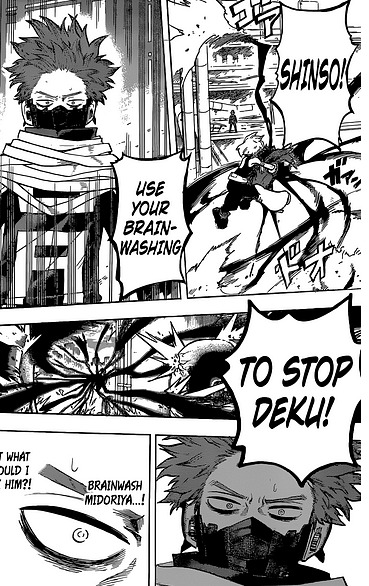
Shinso, who has talked to Deku like 3 times before this scene, not Ochaco, his official love interest and close friend. Once snapped out, Deku protects her briefly before they split up and go their separate ways again, to fight on different turfs.

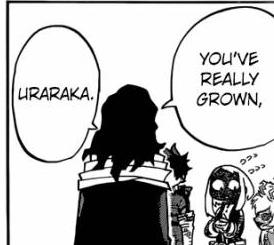

Afterwards, it looked like Deku was blushing at Ochaco holding him, like she was after Mina’s comment. But on closer inspection, I find that nope - he’s not blushing in the panel after this comment, but does go red when Shinso compliments his prowess. And Ochaco doesn’t get self-conscious about holding him until Mina points it out to her.
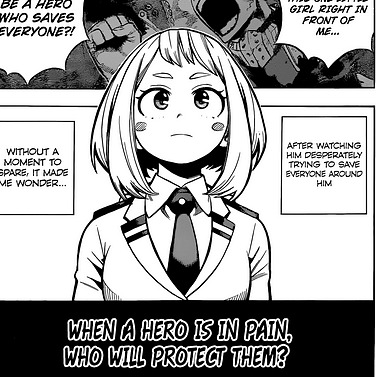
She wasn’t thinking about how much she loves Deku when she held him, she was thinking about her parents and her failure to save Nighteye, and her “Who watches the watchmen” ideas.
So instead of a great big Izuocha ship moment, that finally set the romance in motion, we get…I guess, a Shindeku moment? It’s all very confusing. For Uraraka, this moment does seem to show that she’s now capable of being around Deku in battle, without thinking about him or obsessing. It comes across like Ochaco is trying to put her crush away (Like she said before), like she’s gone on this whole personal journey outside of Deku and changed as a person on her own. We have this recurring idea that Ochaco fights better as a hero without Deku around, or without fixating on him, which isn’t promising for them as a couple. (take a shot)
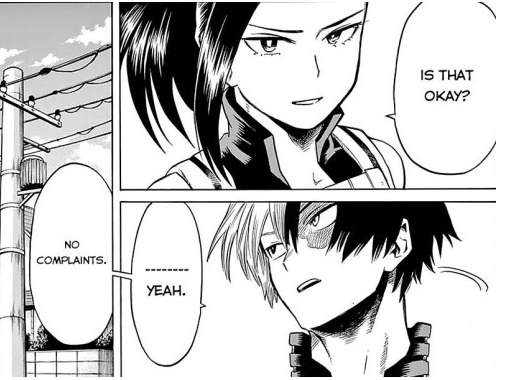



Compare with Todoroki and Momo vs Aizawa, for instance, where they work brilliantly, together, to overcome an opponent neither could face alone. Or the insistence on Deku and Kacchan putting away their rivalry and Deku reaching 8% by competing with Bakugo or helping him. Or Ochaco and Tsuyu making a perfect team fighting others. The narrative is angling Uraraka away from Deku, if she wants to be a good hero, not towards him.

Also, once again, her romantic feelings for him are something she’s told she has by someone else, instead of something she figures out on her own - Mina again.

But earlier this arc, we saw Mina assume that Midnight and All Might were a couple, because they were standing together. Earlier, she said it could be Iida or Deku, because Ochaco hangs around them. I love Ashido, but she’s not the world’s greatest expert on romance, or particularly close to either Uraraka or Deku. So her words, like Aoyama’s, can’t be taken as gospel truth. It really feels like Ochaco is being pushed into feeling romantically for Deku, regardless of her actual feelings towards him, by other people instead of her own heart. I mean, I’m rooting for them, but I want Ochaco to realize she likes Deku because she likes Deku, not because Aoyama and Mina are telling her she does.
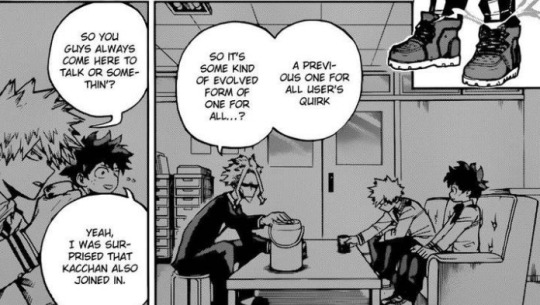
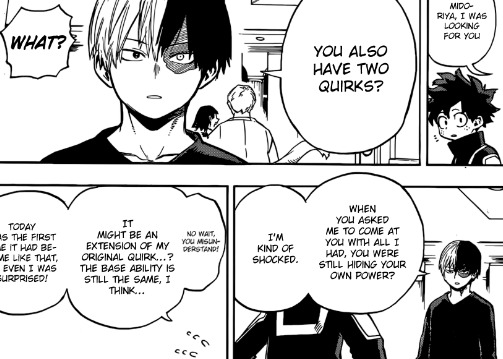
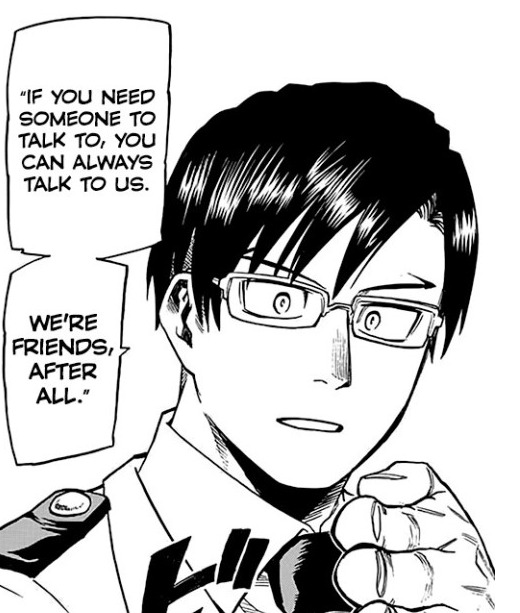
Deku shuts Ochaco out of his personal problems - he won’t confide in anyone but All Might and Bakugo about OFA - and doesn’t explain to her anything about his quirk going out of control. And she doesn’t ask. Even Todoroki asked Deku about his quirk going out of control, as did Aizawa and Bakugo. Todo and Baku are Deku’s rivals, but they both asked about his quirk meltdown. Uraraka didn’t. She’s supposed to be his friend, she’s supposed to be in love with him, so why doesn’t she ask about his problems?
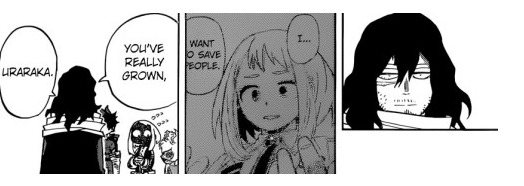
Same with her personal journey towards becoming a hero who saves people, the Who Watches the Watchmen hero - Deku isn’t privy to this. She only told two people, Aizawa and Tsuyu. Uraraka has also had this whole personal journey, outside of Deku, which she won’t tell him about or confide in him about. And she doesn’t show any inclination to do so.
Final Review:
The series isn’t over. There’s probably still time to fix all these problems. But the series needs to get started on it right away, because so far we’re just not seeing the elements we need to get Izu/Ocha together.
On Ochaco’s end: We need her to be attracted to Deku, to let him be as supportive to her as she is to him; to see her crush on him as a motivator to be a better hero instead of detrimental to her success, to stop hero-worshipping him and acknowledge his flaws, to talk to him about her problems and cry with him, let him be there for her; let go of her desire to be just like him, see him romantically on her own unprovoked by other people teasing her, enjoy spending time with him one-on-one, have a fight with him that gets properly resolved, defend him from unwanted attentions from girls instead of getting possessively jealous of him, and show at least some curiosity about his life, his secrets, the real him beyond the Great Hero.
On Deku’s side: He needs to show attraction to Uraraka as Uraraka, not just ‘a girl’; to work together with her as a great team to take down an opponent side by side, to loudly admire her for her skills and capabilities like he does for his other friends and rivals, to tell her about his past with OFA and being quirkless and such, to be inspired by her to do better as a hero, to show the kind of crazy, unconditional concern for her he shows everyone else in his life, to actively seek after a romantic relationship with her, talk to her about his problems, to distinguish her in his life from his other friends.
If all that stuff happens, I’ll be happy. If some of it happens, I’ll be ok, but not thrilled. If they stay in this status quo, they’ll fall apart, because this is not the stuff good romance is made of.
#my hero academia#IzuOcha#meta#izuocha meta#midoriya izuku#uraraka ochako#midoriya x uraraka#ochako x izuku#relationships#ship#relationship meta
86 notes
·
View notes
Note
I don’t have much for unpopular opinions, but I’ll try this instead: what’s your take on the whole situation regarding RWBY and their recent decisions in the latest season? (Frcstbxte)
send me controversial or unpopular opinions and I’ll tell you if I agree or disagree 🐸 ☕️
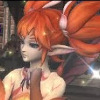
Hoo boy. People are going to unfollow me for this one guaranteed due to how may super strong opinions people have about this. This one’s getting a cut to avoid drama.

I do want to stress that I don’t want to devalue or invalidate anyone’s complaints regarding the show. Enjoyment is a highly personal thing and if you’re frustrated, upset, disappointed, or otherwise had negative feelings don’t let this convince you that you’re not allowed to feel the way you do about the volume.. My gripes are more on the mechanical and storytelling aspects of things and with the arguments used to criticize the volume. I only hope I can make my case on why the commonly complained about parts of the show don’t warrant the vitriol in my opinion. I likely won’t convince too many people, but I’d like to make my case here anyway.
I honestly believe a lot of the complaints about the latest season from a writing standpoint are short-sighted, lack scope, and/or just miss the point of what we’re looking at. From an overall storytelling perspective this was definitely the most well put together season the show has had so far and a lot of the complaints only address individual concerns that some fans had regarding things not happening the way they wanted to without a regard for the overall plot. This is why I think a lot of the complaints don’t measure up and where my actual gripes with the part lie.
1. Theme
You cannot consider yourself to have analyzed a work without first looking at its overall theme. RWBY’s structure doubles up on this as not only does the show as a whole have its overarching themes and plot, but each individual volume has their own to deal with as well. Here the theme is trust, as directly stated in the opening lyrics and it’s a common source of problems and solutions throughout the the show.
From an overarching standpoint, we have Salem doing her darnedest to break apart any alliances that could be formed against her. I do not believe this is because she fears humanity in terms of tactical numbers. This simply isn’t that kind of show. The writers have said in interviews that they take most of their story and theme cues from the magical girl genre. You know, the same “love and friendship conquers all” magical girl genre that all those shows not named Madoka Magicka use as the basis for their protagonists. The silver eye power seems fueled by that exact sentiment and I think that’s going to be a huge factor close to the end. This is not a setting where pragmatism and strategic thinking will carry the day- keep that in mind.
2. RWBY vs. Ironwood
This is the part everyone’s been talking about and I think a lot of the hard-line side-taking in either direction is missing the point entirely. This conflict was always going to happen and both sides have fault to bear.
The two sides can be seen as having their own character arcs on a macro scale. Individual character motivations weren’t nearly as important as they were in previous volumes and it helps to see them mostly through the lens of Ruby and Ironwood. The basic core of the problem throughout the series is this, Team RWBY has decided to go along with Ironwood’s plan for lack of one themselves, but don’t trust him with the whole truth until they know how he’ll react to it. This is a man with an army and a paranoid streak after all. This, of course, is a decision that winds up instrumental in triggering Ironwood’s paranoid shitstorm later in the volume.
That said, I don’t believe the problem is Ruby’s decision making- It’s the narrative. The whole reason this comes across as weird and contrived is that we are never told the reason Ruby and co. don’t trust Ironwood with the information from the lamp. By all accounts up until this point there was no visible reason for them to do so and we’re simply never told WHY. Answering this simple question would have made the entire rest of the narrative make a lot more sense were she just given a believable reason to hold the info back, let alone any reason at all.
Now let’s bounce back to Ironwood. I’m going to just go out and say I grew tired of the “Ironwood did no wrong.” discourse pretty quickly because, again, people are missing the point. For this one, we have to look back into the theme- trust. When Ironwood has his breakdown, he not only turns his back on Ruby and her team for lying to him, but he goes right into his martial law plan also betraying the trust of the council, Robyn, and the people of Mantle who are now going to be sacrificed for the sake of salvaging his original plan. Despite Ruby and co’s actions making the situation worse, we aren’t meant to see Ironwood’s new solution as a better alternative purely on the moral cost of what he’s doing. This is what is called in screenwriting the “Moral Line” defined as a vision of right and wrong as told through the protagonists. We’re meant to sympathize with Ruby owning up to lying to Ironwood and trying to move forward despite the setbacks, not cheer for Ironwood calling them out and forcing out a more pragmatic path.
To me, I think this stems from a common sentiment shared in a lot of popular media and deconstruction of tropes that idealism is a naive and childish flaw and that proper strategic logic is what solves problems. Again, I predict that due to the genre inspirations of this story, this won’t be the case at all. Ironwood is going to fail because he turned his back on moral idealism, trust, and friendship in favor of planning and decisive action no matter the cost, not despite it. Harriet summarized the entire philosophy well during her fight with Ruby:
“It’s not excessive if it’s necessary!”
This line feels, to me, like a reflection of everything that Team RWBY is now fighting against and we should be able to understand as an audience from a moral standpoint why this is the way it is.
As a small aside, let’s cap this off with the RWBY vs. ACE-Ops fight. A lot of people called foul because the ACE-Ops lost and I just don’t understand why. The moment the fight started, I knew what the outcome was going to be purely because the story as it was set up simply couldn’t progress otherwise. Much like Mercury and Emerald in volume 5, RWBY matching and defeating the ACE-Ops shows the progression of the main characters. Them choosing to fight also shows RWBY the final stakes moving forward and symbolically shows them that the might of the entire Atlas army is now their enemy moving forward.
With this in mind, I want to go back to Ironwood’s martial law plan and defend some aspects of his character that should be. Up until the point of Ironwood’s breakdown it was seriously and soberly treated as a last resort option with a clear understanding by Ironwood, Winter, and the ACE-Ops that they knew exactly what was it was going to imply. This does not make them evil and it’s important to understand that. However the Tin Man needs a heart and this brings us to Ironwood’s fatal flaw. The real bad decision was that the martial law plan was enacted despite already having the unity of the people of Mantle behind them. He lost far more than the stands to gain with his decision, thinking only from a tactical and strategic standpoint regardless of what he has to sacrifice to get there. Those sacrifices have already all but left him facing Salem alone. If he survives next volume, I’ll be surprised.
3. Qrow and Clover
For a few moments, I do want to discuss Clover and Qrow’s dynamic because it’s very important to Qrow’s story throughout the part. Regardless of how you choose to interpret their exchanges, the important takeaway here is that for the first time in possibly decades Qrow had a friend he can talk to as an equal and not have Ozpin’s plans or a generational gap in the way.
Ever since we were introduced to Qrow, he’s shown himself to be a dysfunctional loner who is only just recently trying to seriously pick himself back up off his feet. I believe the fact that he was finally shown that he can actually have friends is a huge factor in this. His life has always been dominated by his feelings and doomsaying. He spends every interaction waiting for the other shoe to drop and uses his own semblance as an excuse to perpetuate that worldview.
And this is why I think Qrow’s fight with Clover makes total sense to have happened. He’s one of Oz’s main team and also has a fatal flaw.
The cowardly lion needed courage and he died for his cowardice.
The tin man needs a heart and lost all his allies in the pursuit of his goals.
The scarecrow needs a brain and his emotional decision-making cost him his friend’s life.
This is a genuine tragedy, literary-speaking in fact. Qrow’s awful situation was one of his own making and he knows it, but I can’t imagine him doing anything else. One thing that I’ve seen throughout the show about Qrow is that he’s never given up trying to stop Salem- he’s an idealist like Ruby and in my opinion has been subverting the mentor archetype beautifully. However, every time he’s made a major decision in the series, he’s done it on an emotional or practical level. No real thinking ever goes into what he does. When Clover calmly announces to Qrow what was just ordered and Robyn summarily attacks him, his first instinct is to try and stop the fight.
I’m going to break here to discuss Robyn’s actions at this moment- another common complaint. Would we really expect someone like her to have done anything different with the news that the city she’s worked so hard to work with all those years was just cast aside? This would have been seen to anyone in her position as nothing less than a double-cross given how just a few hours ago everything for the evacuation was moving apace. From a characters standpoint, I don’t get why anyone would fault Robyn for being furious at this aside from “It’s not the smart thing to do right now.” No, it’s not, but I’m also very tired of seeing people complain about characters making non-optimal decisions. Not everyone things with perfect logic, strategy, or sense at every given moment. This is a perfectly human response to finding out your loved ones were just given a death sentence. She lashed out at Clover over lack of Ironwood face to punch.
With this in mind, Qrow’s decision to fight Clover is a bit more personal. He’s treating it more or less the same way that he treated Raven joining with Cinder a few parts ago. Qrow is clearly very much against the idea of leaving what’s left of Mantle to die and now has a lot of aggression to take out seeing how calmly and without complaint Clover takes the order. The only friend Qrow’s had in a long time chose his duty over him and he doesn’t know how to take that- so they fight. It’s safe to assume that Qrow is likely in a highly emotional state and, as we’ve established before, not thinking about what he’s doing. Robyn is passed out in the wreckage, Tyrian is left unattended, and they’re miles away from any real contact from anyone. Bluntly, he screwed up, he screwed up big time, but his character leads me to believe he wouldn’t really have done anything else.
Then we see Qrow in engage in a little something we in the literary community call “seriously fucking up.” In the heat of the moment, he decides to trust Tyrian at his word and it ends about as well as to be expected. Qrow made a mistake, one of the biggest mistakes in the entire series and one that looks plainly obvious and avoidable to the audience, but only when you consider it through the lens of someone who’s making calm and rational decisions. Yes, Qrow fucked up, I’m not defending his decision making; I’m defending the scene and why that faulty decision making was the only thing that could really happen.
4. Winter and Penny
The biggest complaint regarding these two is Penny leaving Winter behind at the end of the part. Frankly, for this one I’ve got nothing so I’m not going to pretend I have an answer to the complaints. Much like Ruby early on, the show just outright refuses to give us the reason she left. Winter getting the maiden powers might have been part of the plan, but I don’t think Ironwood would be so inflexible as to not settle for Penny getting it instead. The only thing I can imagine that could be going through her head is that she still wants to try and save Mantle and live up to her title, trusting Winter can handle herself. However, again like with Ruby, I don’t believe that the character is to blame here, but the narrative just refusing to give us an explanation and leaving us to sit there in frustrated confusion. We might get it next part, but I don’t like that...
5. Can I Talk About Watts Now?
With that out of the way, I do have one really bizarre complaint regarding the part that no one else seems to talk talk about.
I am very disappointed with Watts. This is mostly just be griping about lost potential so bear with a small rant.
There was a lot of setup regarding Watts as a threat and when he got the codes. We’re told that given time he could control literally all of Atlas (because apparently two-factor authentication and dead man’s switches don’t exist but that’s a logical gripe for another day). My question is why this wasn’t capitalized on. I wanted a repeat of the mechanical soldiers turning on the Vale citizens. We could have had automated vehicles wreaking havoc, fights between people and robots, and all sorts of fun stuff. You can argue that Watts was distracted by Ironwood’s trap and didn’t have the time to really cut loose and I’ll accept that, but I just wish we could have seen more. Any Watts RPers out there who want some ideas, you’re free to steal this one.
1 note
·
View note
Text
Teaching Global Science Fiction in Tokyo: An Interview with Dr. Pau Pitarch Fernandez (part 2)
3. Global SF class at Waseda University
PPF My first year teaching at Waseda University, I offered this class, calling it just "Japanese SF". And nobody signed up. Can you believe that!?
ーーNO I CAN'T.
ーーCongrats!
PPF I was thinking about how to set up the course. My training is always to look at the history. In my other literature classes, like I had a Mystery Fiction class that I also taught last year. In that one, I started with Edogawa Rampo and the last reading is Confessions by Minato Kanae. We had some Edogawa Rampo, we had some Tani Jouji, we had “Fingerprints” by Satou Haruo. They read “The Devil's Disciple” by Hamao Shiro. I wanted to have them read Points and Lines by Matsumoto Seicho too, but it was too long.
That class, I had conceptualized through a historical narrative from the genre’s origins, the Golden Age, Henkaku (*2 It means unorthodox, alternative, more innovative mystery. 変格), Shakai-ha (*3 Social, political mystery. 社会派), Iya-Misu (*4 Disturbing mystery. イヤミス = 嫌なミステリの略). But I thought that would not work for Science Fiction. The genre is so vast and so rich, it is impossible to do something like that in 15 sessions. It is impossible to give them a full history. Maybe if I chose only classic, English-language, male authors' SF, I could put together something that could pass for that. But that is boring, and I didn’t want to do it. I wanted to put as much East Asian SF as possible. I also wanted to have a sense of this wide feel. So I chose to go with a thematic sequence, rather than a historical one.
We started for instance with Utopia and there we read Ursula K. Le Guin's "The Ones Who Walk Away from Omelas" and "Minority Report" by Philip K. Dick. Then for Dystopia, we read “A Record of Nonchalant” by Satou Haruo. You know that one?
ーーI know the name but only the name.
PPF Oh, you should read it. It is a short story from 1929. And it is basically cyberpunk without information technology.
It is a world where the social class is represented through depth. If you are very poor, you live very far down. If you are rich, you live high up. It is a story of a character who wakes up at the bottom of society and slowly starts climbing up.
I think he wrote it as a kind of satire. If you read reviews from the time, people were comparing it to Kappa by Akutagawa. So I think people read it as Aestheticism, or a kind of Swiftian satire. There are some ironic references to proletarian literature or the Shin-Kankakuha (*5 新感覚派 is a literary group means “new impressions”). The social criticism is very clear. But at a certain point in the story, the main character is given the option of turning into a plant, a human-vegetable hybrid.
ーーWhat.
PPF That seems to allow him to access the higher classes. "Thanks to having me turned into a plant!" Then he ends up living at the top. When I was reading, I was like, "this is cyberpunk." He doesn't know IT and he could not think of computer networks. But this idea of hybridizing the human and something else in order to advance, and sacrificing the human side... All that reflection about what it means to be human, when does one stop being human, etc. I think it is a fascinating story. He never wrote anything like it again. I think it was like a test, some kind of experiment he was not really happy with. But it is really interesting considering it is from 1929. It is very nice and crazy.
Together with “A Record of Nonchalant,” they read "Folding Beijing" by Hao JingFang. In the class I tried to help them think of genre and abstract terms like Utopia. All these connections to like religious ideas, or political ideas in utopian socialism. Once I got them thinking in those terms then they started seeing a lot in these texts. Especially the utopias. I think, at first reading, they may seem boring. But then every utopia has its dark side and once they started thinking about that, arguing, analyzing it... It was great to see how their image of the text was really changing. They saw a lot of depth and complexity there.
I think once we moved to Dystopia, it was easy to relate because it is such a common genre in YA fiction. Everybody has read The Hunger Games. So they could definitely relate to that part. But I don't think they had stopped to think about all the moral complexity behind it, and it was really interesting to see them go through those texts thematically. If I had done the historical thing, we would have read Satou Haruo at the beginning and “Folding Beijing” at the end. It would have taken a long time to connect them. But bringing them together with the utopian texts was very interesting. I think it works better for science fiction if I had them thematically. Because students are already familiar with the main patterns.
Another unit that I had was on Exploration and there they read "The Women Men Don't See" by James Tiptree Jr. And they also read a story by Nnedi Okorafor's "From the Lost Diary of TreeFrong7". That one appeared on Clarkesworld Magazine. What I did before we started talking about Tiptree's was have them think about fiction they knew about exploration. Indiana Jones or all those classics from the colonial 19th century. A white hero going into the unknown and discovering the natives and fighting the bad ones, converting the good ones, you know, that kind of very paternalistic approach.
ーーLike Avatar?
PPF That's a good example.
So once they were thinking in those terms and then they went back to really thinking about what they had read. They started seeing how Tiptree is writing on top of this tradition of the white male explorer hero. And she is totally subverting it with the narrator at that point. "That's why we get this narrator". Everybody hated him, and they said "I hate this story, I do not like this guy." That is the point! You are not supposed to like this guy. Because this guy, he thinks that he is that kind of hero, and you want to look for a hero in that mold in the story, but there isn’t one. All you have is these women who just want to get out of here.
I think it worked really well to activate that kind of imagery that the students already have in their heads. Then they could understand why Tiptree (who also had that imagery) was writing on top of or against it. She knew that you would activate those images, and she prepared her twist accordingly. You get all the shocking moments.
Do you remember the end of the story? These aliens appear and the woman who is the main female character asks the aliens to take them away from Earth. “I can't stand it anymore. I’ll just live anywhere else but here. I hate this place.”
At the beginning, one of the students said "Well, I did not get why we need the aliens. Oppression, sexism is bad. You can tell that story without the aliens.” But then we were reading through it and thinking about how the aliens worked in the text, how would the story change without them. Then I think the students realized SF allows you to move the stakes to this cosmic level, huge scale. You are not talking only about the woman having had a terrible life. You are not only talking about all women of her generation having a terrible life even. You are talking about womankind in the cosmic sense.
This is not a problem of now, or the next ten years, or the last 100 years. It is so entrenched in this male/female oppressive relation, that this character has no other option but to leave the planet. In any other genre, you would need a hugely dramatic speech about why this is so transcendental. In SF, you just need aliens. When the aliens are there, she just needs to say "I don't care where you take me, I just want to be out of the planet. Just take me, take me please."
You already get that cosmic sense. "Wow. This woman is ready to leave the planet. This is really bad and entrenched. There is no easy solution. Because if there were, she would try it. But she could not. It is too big for this woman to deal with. So she has to leave the planet.”
SF is not just about "Okay, Let's put robots here and let's put a spaceship there.” What I like about it (and this is something that you cannot find in any other genre) is that it opens up this space for its themes to have this huge impact because you are talking about whole planets, talking about whole species, and talking about the universe. This cosmic scale that makes it really powerful.
Another text I really liked to teach was "Final Exam" by Megan Arkenberg. It is basically an apocalyptic story but told through multiple choice questions. That one was really refreshing for the students, because they had never seen a story told in that fashion. Again, it activated all these images that they already know, like all the apocalyptic Armageddon stories. It is a good sample for the wide variety of SF. I would love to have time to watch Gojira, and read I am Legend with them, but we don't have that kind of time. But thanks to a story like this you can bring it all into class discussion.
I want the students to ask themselves: “What do I know about this already?” Once they have activated that knowledge, if they come back to think about the story they can see that double layering. I tried to find texts for the syllabus that would allow us to have this multi-layered reading. I think that is very unique to SF. I mean, maybe every genre has it. Maybe I should not say unique. But I think it is very striking and very rich, how every science fictional text shares in all this repertoire of images.
On the other hand, that can make stories very formulaic. One of the criticisms that I you often hear is “science fiction is formulaic, always repeating the same patterns.” I’ll concede that is a possibility, if you don't do it right. But if you do it right, the fact that you have this repertoire gives you this richness, that's amazing.
Every time I start a science fiction book I am thinking of all my science fiction knowledge and activating it. Okay, this is a galactic empire. Maybe it’s an evil empire and there’s a rebellion, but sometimes it's subverted and the story brings you to think "Oh, wait! Maybe the rebellion is not that nice. Why was I thinking..."
So how the genre has this potential to always keep you on your toes, while going back to this shared knowledge. I think that's fascinating about science fiction. It makes it very rich and stunning. I'm definitely not buying this criticism of genre fiction as very repetitive. If you read bad examples, it can be repetitive. But people who are good like Megan Arkenberg...she does such an amazing job, using all these references and then making something so fresh. I think it definitely opened my students’ eyes to the possibilities of SF.
ーーThank you very much.
*Dr Pitarch-Fernandez has never attended to any Japanese SF events. He has been busy for taking care of his children now. But he said that he would like to attend one day in the future.
He told that “We can’t meet Greg Egan in any conventions in the US or even in Australia. But in the case of Tobi Hirotaka, we can meet him. So why not try a chance?” (Tobi regularly attends Un-Con, a local SF con in Shimane prefecture and occasionally attends other conventions in Japan.)
2 notes
·
View notes